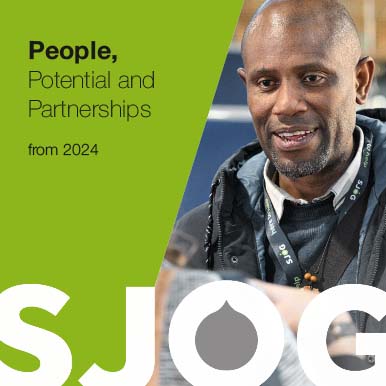SJOG contributes to NACCOM’s annual data briefing
Understanding destitution and homelessness in the asylum and immigration system
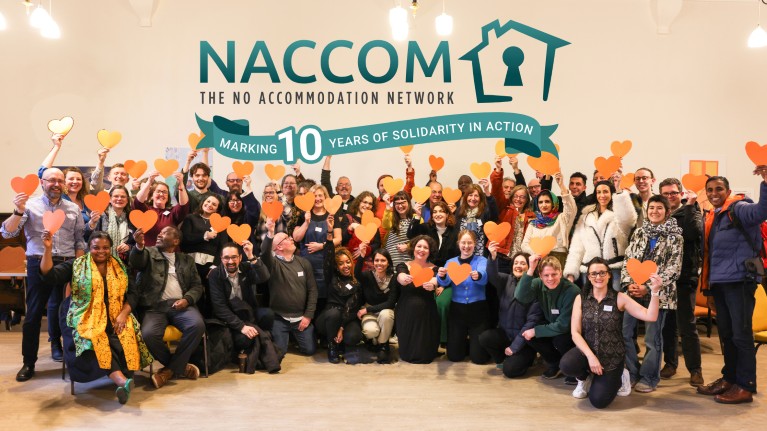
NACCOM recently published their annual survey, bridging data from more than hundred member organisations, including SJOG. Through our services that support people experiencing homelessness and/or modern-day slavery and trafficking, our contribution helped understand the scale of migrant homelessness and the vulnerabilities of refugees and those with NRPF.
The survey highlights that:
- In 2024/25, 4,434 people were accommodated—the highest number on record.
- Rough sleeping on first access rose to 829 individuals, more than double pre-2023 levels.
- Refugee accommodation increased to 2,008 individuals, a 3% rise from 2023/24 and 106% since 2022/23.
- 1,509 people with No Recourse to Public Funds (NRPF) status faced restricted access to public funds, housing, and benefits.
- Legal aid demand surged, with 5,875 people receiving advice, yet nearly two-thirds of organisations could not meet demand.
This shows that in 2025 many continued to suffer destitution. Shortened move-on periods often push people into homelessness instead of supporting their independence. Survivors of trafficking refused asylum seekers, and those with NRPF status remain at high risk, with limited access to housing, funds, and essential support. Legal advice, crucial for safety and stability, is increasingly difficult to access.
SJOG’s experience mirrors NACCOM’s findings and recommends the following measures to prevent further destitution and risk of homelessness/ re-exploitation:
- Reinforce survivor-centred care: Ensure immediate access to safe housing and integrated services, improving long-term stability.
- Extend move-on periods: Continue the minimum 56-day period for newly recognised refugees to avoid destitution while waiting for asylum support or independent move-on.
- Flexible housing support: Allow and fund NGOs to extend accommodation licenses until safe, stable move-on is achieved.
- Legal access and advocacy: Increase legal aid funding, reinstate reconsideration rights, and support NGO advocacy.
- Reduce criminalisation risk: Limit enforcement against survivors and embed trauma-informed training in the assessment and processing of cases.
- Maintain multi-agency, holistic care: Integrate housing, legal, health, psychosocial services, life skills, and ESOL.
Without extended support, flexible housing pathways, and ongoing legal advocacy, newly recognised refugees and those with NRPF remain at high risk of destitution. SJOG’s evidence reflected in the NACCOM survey data demonstrates that sustained, integrated support is essential to secure legal status, prevent homelessness, and enable long-term recovery and integration.
February 2026
National Apprenticeship Week 2026
9 - 15 February 2026

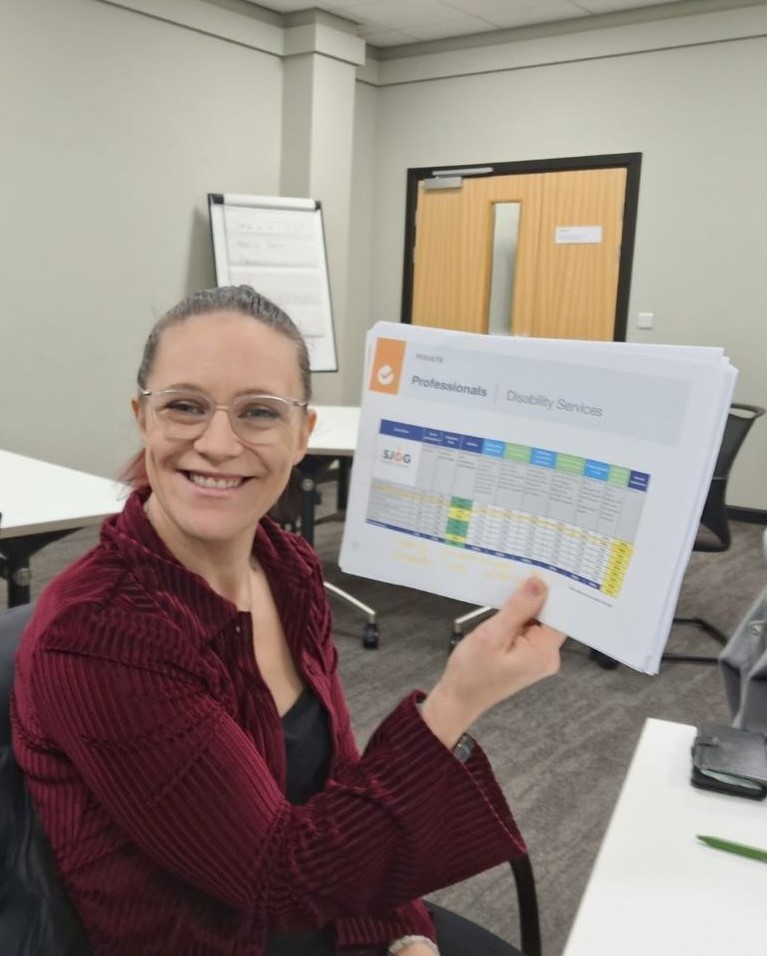
This week-long awareness week shines a light on the positive impact that apprenticeships make to the people who undertake them and businesses that support them.
At SJOG, we’re proud to support over 50 colleagues undertaking apprenticeships - from Level 2 all the way up to Level 7 (Master’s Degree level).
One of our apprentices is Leanne:
Since joining SJOG in 2020 as a support worker on the night shift, Leanne has shown real commitment to both her own development and the people we support.
Through hard work and dedication, Leanne progressed to lead support worker, then deputy service manager, and in 2024 was appointed service manager at our residential care service in Coulby Newham where she leads a 24-hour service supporting eight adults with physical and learning disabilities - ensuring Dalby View is not just a place to live, but a true home where people are empowered to make their own choices.
Alongside her leadership responsibilities, Leanne completed her Level 5 qualification in Management and Leadership, committing to a study day each week and regular meetings with her assessor. Her apprenticeship has equipped her with skills for life - strengthening her confidence, leadership approach and the quality of support delivered at Dalby View.
Leanne shares her journey from night shift support worker to service manager, what motivated her to take on the qualification, and her advice for others considering an apprenticeship in the following Q&A on LinkedIn: https://www.linkedin.com/pulse/from-night-shift-support-worker-service-slcqe
Follow us on Facebook for more apprentices’ stories and achievements: : www.facebook.com/SJOGUK
Time to Talk Day - 5 February 2026
Brave the big talk


Time to Talk Day is the nation's biggest mental health conversation. A chance to listen, share, and talk about what really matters.
This year’s ‘Time to Talk Day’, encourages people to brave the big talk and have conversations about mental health experiences that might still feel a bit unspoken.
Dean, a project worker at SJOG, explains why speaking up changed his life:
Time to Talk Day, is a reminder that the simplest conversations can sometimes make the biggest difference, and I want to share a bit of my own journey with mental health in the hope that it encourages someone else to open up too.
More than 16 years ago, my life changed in a way I never expected. I developed OCD, and very quickly, everyday tasks became overwhelming. Getting dressed was difficult. Leaving the house felt impossible. I spent hours checking for dangers, checking doors, appliances, objects, over and over again. Those compulsions trapped me and made the outside world feel unsafe.
Over time, I also developed anxiety and depression. I felt myself slipping into a vicious cycle, unsure where to turn and not really knowing how to explain what was happening inside my head. It was isolating, exhausting, and frightening.
But things began to shift when I made one small decision: I stepped into a community centre.
At first, it was just a place to be around people. But slowly, I started talking. I realised others were going through similar struggles, and that alone helped me feel less alone. Those conversations didn’t magically fix everything, but they opened a door I didn’t know I needed.
From there, I reached out for therapy, which played a huge part in helping me understand my OCD and break the patterns that were controlling my life. It was tough work, but it was worth every step.
If you take one thing away from my lived experience, let it be this: it’s good to talk.
Talking gave me connection. Talking gave me support. Talking gave me hope.
So on this Time to Talk Day, I encourage you, whether you're a colleague, a friend, or someone supporting clients, please start that conversation. Check in with someone. Ask how they really are. Share something about your own journey too if you want to.
You never know how much difference a single conversation can make.
Let’s keep talking.
SJOG launches Year of Wellbeing
Supporting colleagues throughout 2026
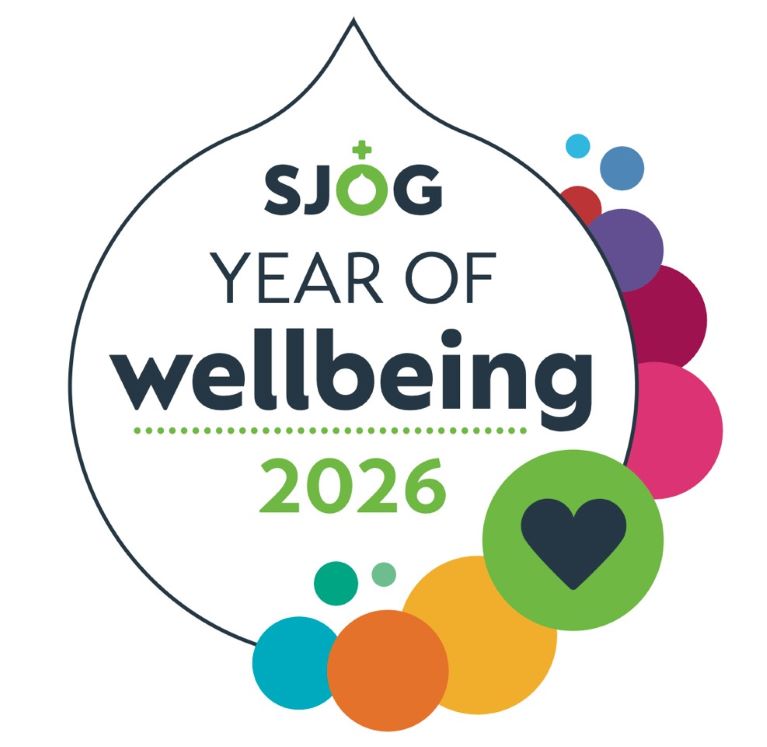
January marked the launch of SJOG's Year of Wellbeing, a year‑long programme designed to support the physical, mental, emotional and social wellbeing of colleagues across the charity. Working in care is deeply rewarding, but it can also be demanding. The Year of Wellbeing focuses on practical support, compassion and meaningful connection - helping us look after ourselves and each other so we can continue to provide safe, high‑quality care.
Throughout 2026, each month will spotlight a different wellbeing theme, ranging from rest and recovery to inclusion, financial wellbeing, learning, and stress awareness. Colleagues will receive a mix of emails, Workvivo updates, toolkits, activities and events that aim to make wellbeing simple, accessible and relevant. Engagement is entirely flexible with people dipping in and out in whatever way works best for them.
The programme began with Gentle January: Rest, Reset & Recovery, encouraging everyone to start the year by going gently after a busy winter. Resources included Brew Monday materials, wellbeing tips and toolkits.
February moves the focus to Connection and Belonging. Feeling connected at work plays a vital role in our wellbeing, yet many people in care roles can sometimes feel isolated - working alone, remotely, on shifts or in fast‑paced teams. This month encourages colleagues to check in with one another, listen without judgement, welcome newcomers, and create spaces where people feel valued and able to ask for help. Small moments - a cup of tea, a quick conversation, or a simple ‘How are you, really?’ can make a big difference.
As part of the February theme, SJOG will be supporting Time to Talk Day on Thursday 5 February, the UK’s biggest conversation about mental health.
The Year of Wellbeing reflects SJOG’s commitment to fostering a positive, inclusive culture and delivering safe, compassionate care. It also supports our ambition to be a Well‑led, Caring and Safe organisation - when colleagues feel supported, everyone benefits.
January 2026
SJOG contributes to UCL and ‘Feast with Us’ study
Nutrition Status of People Experiencing Homelessness Living in Temporary Accommodation in London

Homelessness is both caused by poor health and is a cause of poor health. The Unhealthy State of Homelessness 2025 presents new findings from Homeless Health Needs Audits (HHNA) carried out between 2022 and 2025. The report highlights deep health inequalities, with 81% of respondents reporting at least one physical health condition, and 77% of respondents, at least one mental health condition. Food access is also limited, with just 36% having access to a meal a day, and 20% ate three or more meals per day.
This picture is reinforced by a 2025 UCL study conducted in partnership with Feast with Us, which examined the nutrition and wellbeing of people experiencing homelessness living in temporary accommodation across 18 hostels including SJOG’s Olallo House in London.
It found that 60% of participants were at risk of malnutrition and that intakes of key nutrients such as vitamin D, iron, folate, and calcium were low. More than half reported moderate to severe depression or anxiety.
The UCL study also included the experiences of people supported at Olallo House, where Hannah Style and colleagues assessed malnutrition risk, diet quality, mental health, and food security. Their impact report shows that improving nutrition is challenging but possible.
Olallo House provides accommodation and specialist support to street homeless men and women, survivors of modern-day slavery, and patients recovering from TB. As part of support, residents receive three nutritious, in-house–prepared meals every day, recognising that access to a warm cooked meal is central to health, wellbeing, and safety.
The study highlights an urgent need for improved food environments, better-quality donated foods, and enhanced nutrition support, and SJOG echoes its recommendations, including stronger charity partnerships, routine nutrition screening, and closer collaboration with healthcare professionals.
January 2026
Responding to House of Lords Autism Act Committee
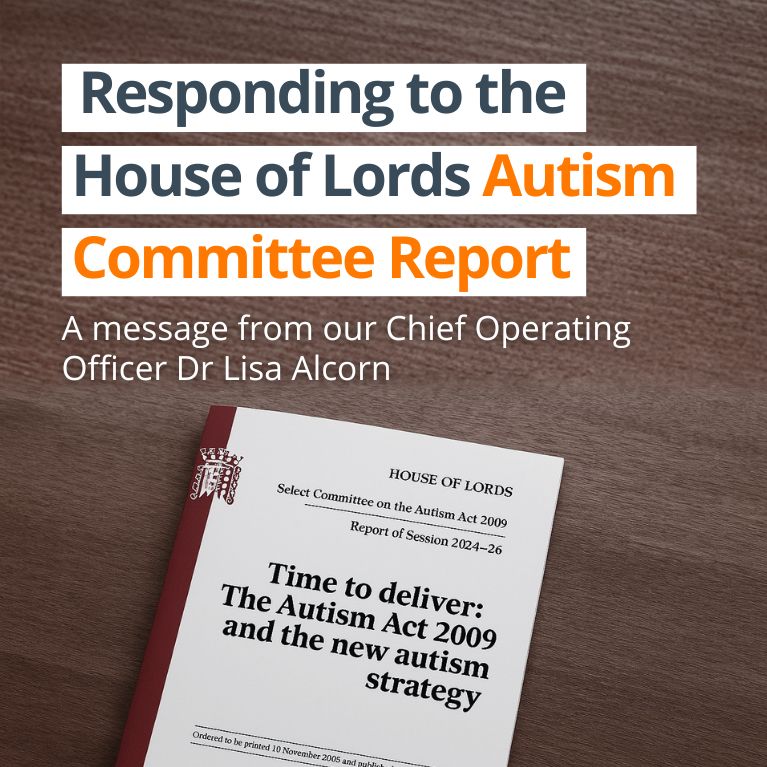
The House of Lords Autism Act Committee's November 2025 report, Time to Delivery: The Autism Act 2009 and the new autism strategy, has been welcomed by SJOG. The Committee's central finding was that the Autism Act and subsequent strategies have ultimately failed to tackle the key barriers required to improve outcomes for autistic people and serves as a compelling directive for the fundamental change in operational strategy.
SJOG's strategic commitment builds upon the recommendations outlined in this crucial report, focusing on rigorous planning, accountability and person-centred service transformation through capable environments so that autistic people can flourish.
Dr Lisa Alcorn's, SJOG's Chief Operating Officer, report provides a summary of essential insights: https://sjog.uk/pdf/Autism-Committee-Overview.pdf
December 2025
Here to Help Web Platform Nominated for Award
Accessible Europe: ICT 4 ALL
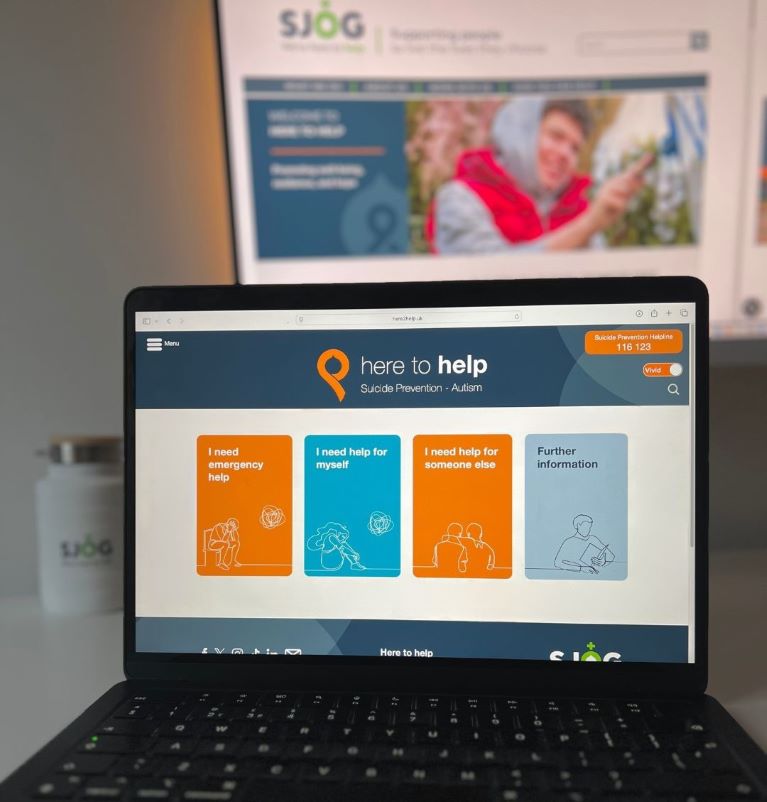
Here to Help has been shortlisted in the Persons with Cognitive and Intellectual Disabilities category at Accessible Europe: ICT 4 ALL awards. The awards celebrate innovative digital solutions that make the world more inclusive for people with disabilities.
Our Here to Help platform is an online space co-created with autistic individuals to make finding support easier, clearer, and more accessible.
Developed through extensive research, it's designed to meet the needs of autistic people, as well as the families, carers and professionals who support them.
The awards selection committee praised the submission for its creativity, innovation and real-world impact for people with disabilities and said, "Your solution, which leverages ICT to benefit persons with disabilities, is not only innovative but also deeply meaningful as it harnesses digital technology to create a more inclusive world."
The awards ceremony will take place in Brussels next month.
Well done and good luck to the team!
November 2025
Joint statement from CEOs of anti slavery organisations
in response to changes in modern slavery protections

Charity leaders have written to the Home Secretary expressing concern about recent changes to modern slavery protections outlined in the government's asylum and returns policy.
In their letter, CEOs of anti-slavery organisations, including Paul Bott, CEO of SJOG, state that aligning modern slavery legislation with immigration objectives could undermine the purpose of the Modern Slavery Act. They note that the National Referral Mechanism was designed to identify and safeguard victims of serious crime and support prosecutions against perpetrators, rather than serve as an extension of border control.
They encourage a number of actions to help protect people who need it most, as well as asking for the opportunity to meet to discuss how the UK can uphold both the integrity of the Modern Slavery Act and the government's wider objectives.
Click here to read the letter in full, signed by 13 leading anti-slavery charities.
November 2025
Launch of Slavery & Trafficking Survivor Care Standards
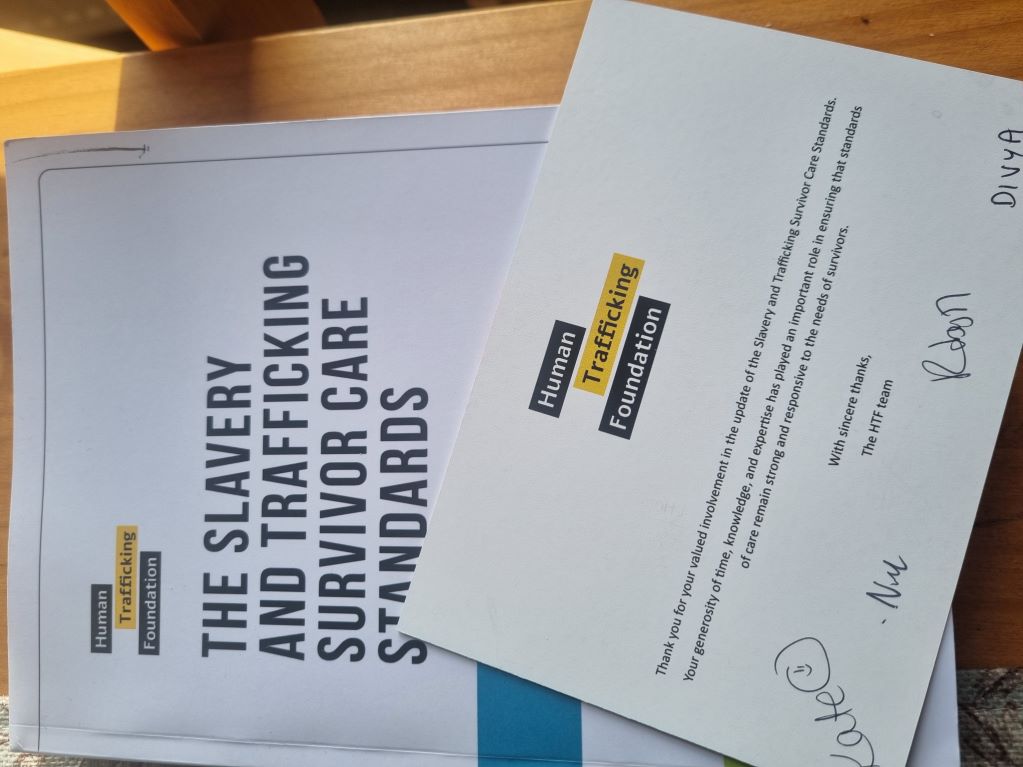
SJOG's, Senior and Research Policy Officer, Ioana Brezeanu, attended the launch of the updated Slavery and Trafficking Survivor Care Standards on 6 November.
This milestone celebrated a collective commitment to ensuring that every person who has experienced modern-day slavery and human trafficking receives the care and support they need, regardless of where or from whom that support comes: healthcare providers, criminal justice practitioners, legal advisers, local authorities, education institutions, or community organisations.
The updated standards reflect the voices of people subject to modern-day slavery themselves and represents a collective wisdom of over 150 contributors - from frontline practitioners and researchers to people with lived experience and leaders across multiple sectors. It was inspiring to see so many individuals and organisations coming together, continuing the work that began a decade ago with the Modern Slavery Act 2015.
SJOG is particularly proud to contribute to this work through the research conducted on 'Access to healthcare and treatment for people subject to modern-day slavery and trafficking', involving colleagues and people we support at SJOG. Our insights helped inform the Access to Healthcare chapter, and it's deeply rewarding to see this evidence now embedded within national guidance.
The Standards have been endorsed by the Independent Anti-Slavery Commissioner, Eleanor Lyons, and welcomed by government ministers. As Jess Phillips, Minister for Safeguarding and Violence Against Women declared:
"They set a clear, compassionate benchmark for the care and recovery of victims, and I am proud to express, on behalf of the government, our support for the standards and the principles which will continue to guide our support provision. This is just another example of what can be achieved when we all work together."
The outcomes of this collaboration can now be found here: https://lnkd.in/dUdrjVPD
November 2025
SJOG Conference 23 & 24 Oct 2025
Health and Happiness
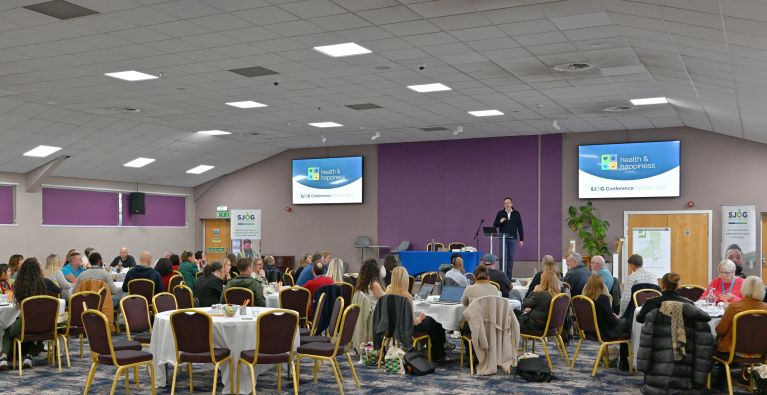
The annual SJOG Conference took place on 23 and 24 October 2025, expanding from our usual one-day format to two days for the first time to offer the opportunity for more colleagues from across the charity to participate, with day one offering a repeat of the full programme.
The event's central theme, 'Health and Happiness' was woven throughout all aspects of the day, starting with an introduction to using a wellbeing journal and how to grow pea shoots (with a supply of peas and compost available to all who wanted to give it a go).
Inspiring keynote sessions were led by Hannah on day one and Darrell on day two, both from Art of Brilliance. Their presentation, 'The Art of Being Brilliant - Your Wellbeing Launch Pad', delivered an hour of lively insights and practical advice. Feedback was unanimously positive, with many noting how the much the session resonated and setting a positive tone for the day.
Workshops were a key part of the conference, with each attendee participating in three sessions chosen from four key themes: emotional and psychological health and happiness; physical health; financial health, and inclusiveness, community, and belonging. There was a mix of very active participation - namely the 'clubbercise' session to those wanting more mental than physical workouts. Something to suit everyone.
The conference provided opportunities for staff from various areas of the charity to gather, interact with new colleagues, reconnect with others, and spend time with members of their own team in a different environment than their usual work setting. All so valuable!
Thank you to all those who contributed and to everyone who attended, and with a final word from Paul Bott, SJOG's Chief Executive: "What did come out of this is that for me it just showed that the energy and involvement of our colleagues is the thing that really makes these conferences sing. You are a special bunch!"
To read more about Art of Brilliance: https://www.artofbrilliance.co.uk/
And to see more photos from this year's conference: https://sjog.uk/features
October 2025
Gratitude to QMCG
for their support of our homeless service


We are deeply grateful to the Queen Mother's Clothing Guild (QMCG) for their generous and ongoing support of our homeless service at Olallo House.
Founded in 1882, QMCG is one of the UK's oldest charities, with a long-standing mission to support those most in need. Each year, they donate essential items including clothing, towels, and bedding to SJOG's Olallo House, helping us provide comfort and dignity to people who are homeless and have no recourse to public funds.
As part of this valued partnership, colleagues from Olallo House are invited to Buckingham Palace for a tour and to collect the donated items - an experience that is both humbling and inspiring.
Located in central London, Olallo House offers accommodation and specialist support to street-homeless men and women, including survivors of modern-day slavery and trafficking. It is a place of safety, warmth and care, where individuals can begin to rebuild their lives.
Our aim is simple: to ensure that no-one who comes into contact with our services returns to street homelessness. We work collaboratively with a range of organisations to provide holistic support tailored to each person's needs.
Team Leader Mohamed, thanked Prince who is currently living at Olallo House and Aman, Project Worker, for sorting and organising the donation. "Thank you, Prince. Thank you, Aman. And thank you, QMCG!"
This donation will make a meaningful difference to the comfort and wellbeing of the people we support. We are incredibly grateful for QMCG's continued support.
Photo shows Mohamed (left) and Prince
October 2025
Anti-Slavery Day 2025
Sharing voices of lived experience
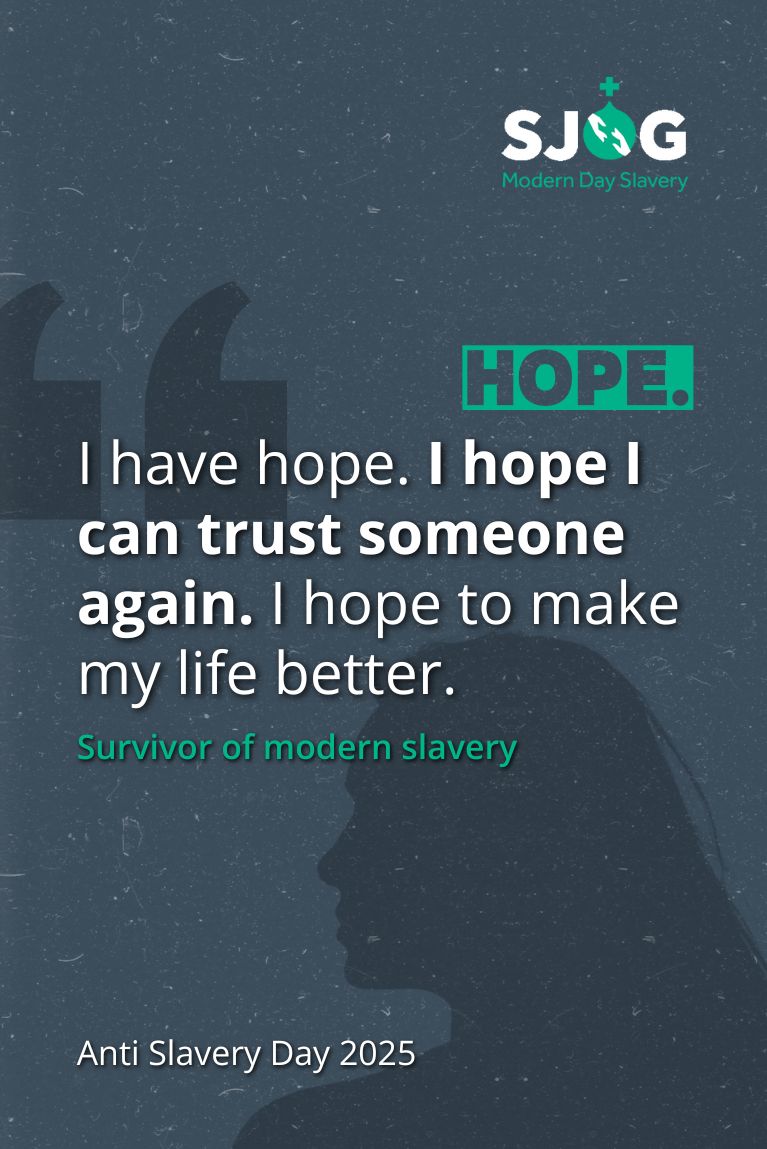


Anti-Slavery Day, which falls on 18th October each year, provides an opportunity to raise awareness of human trafficking and modern slavery, and encourage government, local authorities, companies, charities and individuals to do what they can to address the problem.
As part of our continuing effort to raise awareness of the consequences of modern-day slavery, this anti-slavery day we're amplifying the voices that matter most - the survivors.
We sat down with people supported through our modern slavery services and asked them to share what freedom, hope and justice means to them.
Click the link below to read their reflections on our digital whiteboard.
https://tr.ee/xeJsHf
Across the country colleagues in modern slavery services marked anti-slavery day by wearing wristbands saying 'Freedom, Hope, Justice'- to raise awareness about slavery and human trafficking
We're also working with other organisations working in this area to lobby the UK government on the changes we would like to see in the way people who have been subject to modern day slavery or trafficking are supported.
Read more about our modern-day slavery services at sjog1810.uk
October 2025
Hitting Our Energy Reduction Targets!

Around 12 months ago, we set ourselves a challenge: reduce the amount of energy used across our services and offices. The goal was simple but ambitious - cut our purchased energy by 40% by 2027, as outlined in our environmental policy.
And our colleagues rose to the challenge brilliantly.
The results are in:
Electricity usage
- 2023: 1.07 million units
- 2024: 876,000 units
- Savings: Nearly 200,000 units
Gas usage
- 2023: 1.04 million units
- 2024: 697,000 units
- Savings: Over 340,000 units
These reductions represent:
- 30% less gas used
- 20% less electricity used
- �270,000 saved - funds we can now invest into supporting the people we serve and our colleagues.
While there's still work to do, this puts us in a strong position to meet our 2027 target.
A huge well done to everyone involved!
October 2025
Recruiting new trustees to our board

SJOG is a great charity - high-performing, award-winning and ambitious; innovatively changing social care throughout the UK to make a difference in people's lives. Our work is underpinned on our key value of hospitality. Every day we say ,"Come in. You are most welcome. How can we help".
We have a great heritage, 140 years and counting, and an equally long history of innovation. In recent years we've built on our long history of providing support to disabled people, autistic people and providing specialist dementia services to support people with experience of homelessness and has become a leading provider of safe houses for people subject to modern-day slavery.
We're now looking for new trustees as we move towards renewing our strategy, who can bring skills and experience to our already strong board and in particular, people with expertise in finance, governance, and fundraising with a focus on trusts, grants and foundations.
To find out more and how to apply, go to: https://www.peridotpartners.co.uk/jobs/trustees-sjog/
"We are ambitious for the people that we are here to support, and I'm hoping that if you are too, then you'll consider applying for this role." Duncan Reid, Chair of Trustees, SJOG.
Note - closing date for applications is 10 November 2025
October 2025
Ensuring voices are heard
SJOG contributes to UKHSA report
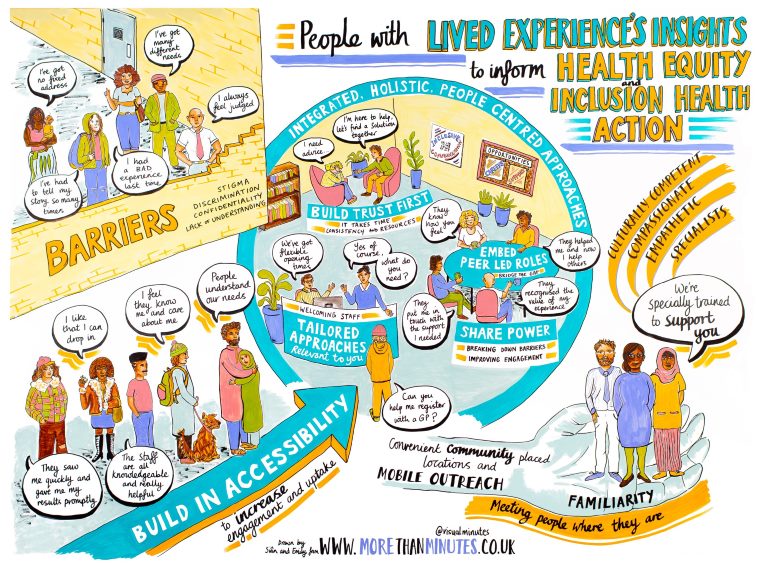
The UK Health Security Agency's (UKHSA) report on inclusive approaches to health protection for inclusion health groups has just been published.
SJOG's work, led by Ioana Brezeanu, Senior Policy and Research Officer, on capturing experiences from people who have been subject to modern slavery contributed to this report.
UKHSA commissioned 10 voluntary, community and social enterprise organisations, one of which was SJOG, to engage with people with diverse experiences of social exclusion to provide insights for designing and delivering health services that can meet health protection needs. Over 200 people with diverse experiences of social exclusion took part. The purpose of the engagement was to seek views on barriers and facilitators to health protection interventions and participants were encouraged to explore how services could better meet their needs.
Executive summary of the report
Engaging with affected communities is a fundamental component of Inclusion Health approaches. Inclusion Health approaches aim to prevent and address extreme health inequities resulting from severe disadvantage and deep social exclusion.
These health inequalities include high rates of important infections and challenges in accessing vaccination, screening and clinical care.
Working with the broader health system, the UK Health Security Agency (UKHSA) has an important role in protecting inclusion health groups from infectious diseases and wider external health protection threats.
The main recommendations that came out of this work were to:
- Build trust first
- Provide integrated, holistic, people-centred approaches
- Build in accessibility to increase engagement and uptake
- Tailor approaches to increase relevance
Read UKHSA's report at: Insights from people with lived experience to inform inclusive approaches to health protection - GOV.UK
And SJOG's research paper can be found at: Exploring access to health support and treatment for people subject to modern-day slavery and trafficking
October 2025
Exploring the Role of AI in SJOG
By Ioana Brezeanu, Senior Policy and Research Officer

Over the past three decades, digital technologies have reshaped how charitable organisations operate - from streamlining administration to managing complex data systems. As the sector continues to evolve, SJOG is committed to embracing innovation while staying true to its core values of hospitality, compassion and respect, and ensuring alignment with data protection regulations.
As part of this commitment, SJOG is currently working with a specialist in Artificial Intelligence (AI), to explore how automated technologies can support the work carried out at SJOG. This collaboration aims to better understand both the opportunities and challenges AI presents.
To inform this work, a preliminary research initiative was launched, focusing on:
- Colleagues' knowledge of and attitudes toward AI
- Case studies highlighting potential uses and limitations of AI in care settings
- How AI integration can align with existing organisational policies
The resulting report examined how AI can enhance services and support staff, with a strong emphasis on digital inclusion and ethical practice. It concluded that AI has the potential to significantly reduce the daily workload of colleagues, making their roles more manageable and less stressful, while creating more space for the human and relational aspects of care.
To read the report in full go to: https://sjog.uk/publications-research.php
August 2025
Celebrating Success
Shamim achieves 'distinction' to continue her career progression at SJOG


Shamim began working at SJOG in 2018 as a service administrator for Supported Living Services in Bradford and has steadily progressed through the organisation, embracing new opportunities and challenges along the way.
After leaving Bradford, Shamim transitioned to the service administrator role for SJOG's Supported Living Services in the North. In November 2023, she joined the Property Services Team as a repairs administrator and was promoted just two months later to her current role as compliance and contracts co-ordinator.
Last month, Shamim successfully completed her Level 3 Business Administration Apprenticeship - achieving a distinction. This was a long-held personal goal since leaving school. The course combined 'on the job' and 'off the job' learning, which Shamim balanced over four years alongside her full-time role. The distinction made all the evenings spent on assignments, research and reflective accounts worthwhile.
The qualification has equipped her with practical skills and knowledge that enhance her day-to-day work and support her future career progression.
Shamim's story reflects SJOG's supportive culture and commitment to personal development. She credits her team for their encouragement throughout her studies.
Her advice to anyone considering a career in business administration or thinking about joining SJOG is simple:
"Just go for it. I enjoy and love every part of my job and feel proud to be a part of SJOG and the wonderful work that everyone does here."
August 2025
SJOG Contributes to Government
By Ioana Brezeanu, Senior Policy and Research Officer
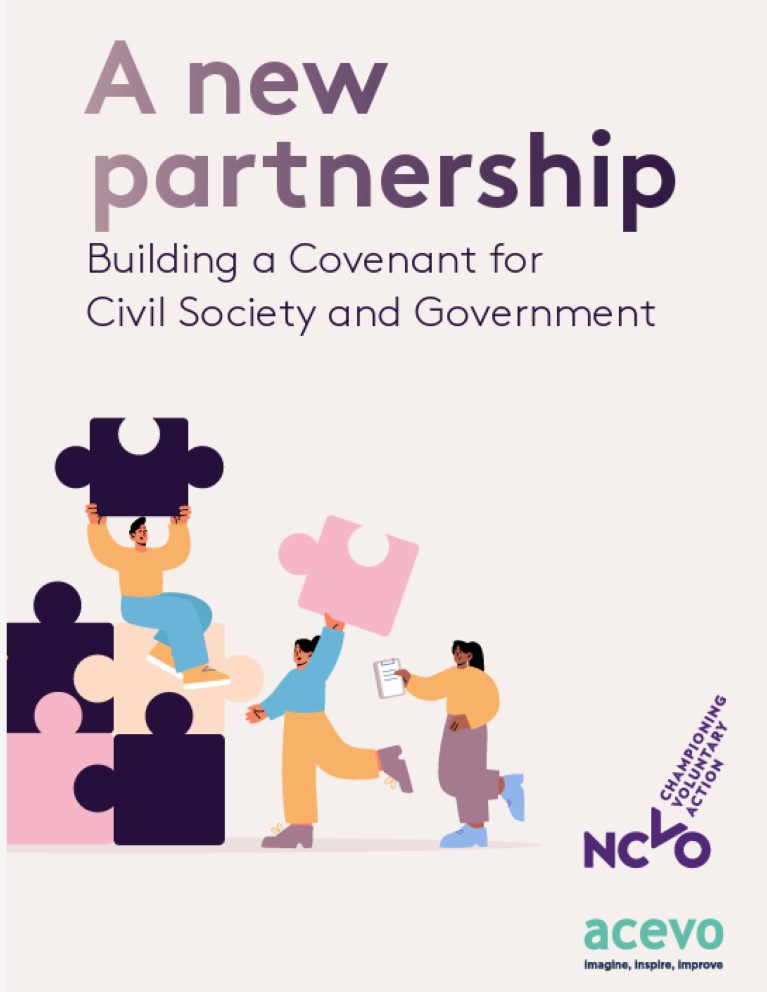
On 17 July 2025, the UK government launched the Civil Society Covenant, a new framework of work that aims to bring closer the government and civil society organisations.
SJOG welcomes this initiative that recognises the importance of collaborating with governments and public bodies when shaping more equal and fair societies. We, therefore, support the set of principles and commitments that will see people and communities at the heart of decision making.
Key principles involve:
Mutual understanding and respect - The Covenant emphasises the importance of recognising the distinct roles and contributions of both government and civil society.
Independence and legitimacy - It includes a commitment to respecting the independence of civil society organisations to advocate and hold government accountable.
Collaborative working - The Covenant encourages joint design, funding, and delivery of policies and services.
Inclusivity and participation - It promotes inclusive and participatory approaches to decision-making, ensuring that diverse voices are heard.
Accountability - The Covenant reinforces the importance of both civil society and government being accountable for their actions and decisions.
In practice, specific commitments aim to:
Protect the right to protest- The Covenant includes a commitment to protecting the right of civil society organisations to engage in peaceful protest.
Avoid 'gagging clauses' - It aims to prevent practices that restrict civil society organisations from speaking out on behalf of their beneficiaries.
Co-production of policy - The Covenant promotes collaborative policy development and implementation.
Address financial challenges - It recognises the financial pressures on many charities and the need for sustainable funding models.
SJOG's role in shaping the Covenant
In 2024, NCVO and ACEVO led a major engagement exercise with the Department for Culture, Media and Sport (DCMS) hearing from over 1,000 civil society organisations, including SJOG.
Our feedback contributed to better defining the actions needed to improve the relationship between public bodies and civil society organisations, to innovate solutions for tackling societal problems together, and to draft the framework principles.
In particular, based on our experience in engaging with public bodies on consultations and procurement exercises (e.g. market engagement and evidence-based practice and recommendations), and notably, in delivering the Homes for Ukraine programme from 2022-2024, we expressed our commitment in continuing successful collaboration.
However, on some occasions, we notice that decision making processes can be slow, and this can impact on the support we provide to people in the services. We also notice an increased turnover of staff in public bodies over the past 18 months. This can contribute to longer decision making. The lack of funding is also impacting the ability of public bodies to commit to support civil society's work.
We suggested therefore that access to opportunities for engagement in open discussions, evidence-sharing initiatives and campaigns, in transdisciplinary research and projects, and in practical steps to create impact at local level, are important actions that would consolidate this partnership.
The full report can be found at: https://ncvo-app-wagtail-mediaa721a567-uwkfinin077j.s3.amazonaws.com/documents/ncvo-acevo-civil-society-covenent.pdf
What happens next?
As part of the Covenant's launch, the government has confirmed:
- A new Joint Civil Society Covenant Council, which will bring together civil society and senior officials to oversee how the Covenant is implemented.
- A Local Partnerships Programme, designed to support better working relationships between local authorities, public bodies and civil society.
- A developing VCSE-HM Treasury forum, providing a regular space for engagement on economic and financial issues affecting the sector.
SJOG will continue working with government, infrastructure bodies and organisations across civil society whenever possible for better representing the needs and voices of people we support and for contributing to innovative solutions that address certain societal or individual problems.
Read the full Society Covenant at: https://www.gov.uk/government/publications/civil-society-covenant
August 2025
A helping hand for handy work
Local company donates tools to SJOG

When we recently needed to purchase new tools for our property teams around the country. SJOG's repairs and maintenance manager, Matthew, reached out to the team at George Boyd in Darlington, local to our head office.
Thanks to the generosity of branch manager, Bob Rought and his team, we received an incredibly generous donation towards each of the 4 sets of tools we bought.
Established in 1848, George Boyd is the UK's leading specialist in architectural ironmongery, offering a wide range of products, including tools and accessories.
For a national charity like ours, that's a huge help. It means we can direct more resources to where they're needed most - supporting more people and meeting more need.
Thank you George Boyd Darlington for your generous discount and donations.
August 2025
Reflections on the first weeks in my new role
Vicky Ball - Head of Homeless Services

I joined SJOG as head of homeless services in May this year. It's a welcome return for me back into working in homelessness after a 2-year sojourn into social housing. I learnt a lot during that time about the significant regulatory burden and cost pressures faced by a housing sector still reeling from years of rent reductions imposed by the coalition government. Our social housing stock is aged and crumbling and, in some cases it's unsafe, and organisations don't always have the resources to fix this. The solutions are never as simple as they might seem and I'm more convinced than ever that increasing the rate of house building is not what is needed to sort out the housing affordability crisis or impact on rising rates of homelessness.
SJOG has been widely recognised for the impact we have on people's lives and often this is involves working in partnership. We develop partnerships that have real purpose and deliver real benefit. For example, we've been providing accommodation and support to street homeless men and women with TB at our award-winning service, Olallo House, since 2008, working with the pioneering Inclusion Health Team based at University College London Hospital. We've saved lives and money.
You can read more about that work here: Outcomes of a residential respite service for homeless people with tuberculosis in London, UK: a cross-sectional study - L Crosby, D Lewer, Y Appleby, C Anderson, A Hayward, A Story, 2023
Olallo House has recently expanded its reach, delivering an out of hospital care model (OOHCM) in partnership with North Central London ICB for people with physical and/or mental health needs, delivering huge cost savings for the NHS by providing support and accommodation to homeless people who might otherwise be in a hospital bed or facing unsafe discharge onto the streets with readmission at a later date almost certain. This is a service that is highly valued by our NHS colleagues, who will be leading on an evaluation of the model. It is one that we know would benefit other NHS trusts and that we are keen to roll out to other areas.
Over the next couple of months, I'll be drafting SJOG's homeless strategy, while continuing to talk to local authority and health colleagues about how we can support them to meet the needs of homeless people in their area. I'm really excited to be given the opportunity to shape something new.
We are a sector under pressure. Just this week, Homeless Link published its latest annual review, which highlighted a 47% reduction in accommodation services since 2008. Yet homelessness in all its forms is rising. In the last year there has been a 4% increase in statutory homelessness, 20% increase in rough sleeping, and a 12% increase in use of temporary accommodation (TA). Local authorities are buckling under the cost of providing TA.
And those of us who have been in the sector for a while are seeing the same people cycling endlessly through our services. While our psychological, trauma-informed approaches have improved delivery and secured better outcomes for some, there are people for whom this just isn't working. I want to work with SJOG and homeless sector colleagues to try to find some different approaches. Collaboration is particularly important in the financially straitened circumstances in which we currently find ourselves.
I don't often speak to colleagues about my own periods of homelessness, partly because I recognise the singularity of experience. I don't want to reflect my own experiences on to the people I work with. I've also carried a lot of shame about my past for a long time. But I'm getting on now and I'm getting over it and starting to recognise what my experiences have given me. One of those things is an unshakeable belief that everybody can recover and that everybody has something to offer. That drives me to deliver the best possible services and will guide the work I do in my new role.
SJOG has a long history of supporting people, and we have made huge progress, but there is still more to do. Please get in touch if you think you could support our work in any way.
July 2025
SJOG Responds to The Supported Housing (Regulatory Oversight) Act 2023 Consultations
By Ioana Brezeanu, Senior Policy and Research Officer and Melanie Smith, National Housing Manager

About the consultation
The consultation launched by the Government on the Supported Housing (Regulatory Oversight) Act, closed on 15 May 2025.
The consultation sought views on how the Government will implement the Act, how to inform the Department of Work and Pensions (DWP) to work on licensing schemes to claim housing benefit in England, and how to define care, support and supervision in housing benefit regulations.
At SJOG we deliver support to people who claim housing benefits across our homelessness and housing management services. We are aware that the implementation of this legislation will have a significant impact on the way services are run.
Melanie Smith, SJOG's National Housing Manager explains: 'All supported housing residents deserve a good quality home and services, therefore the changes proposed by the Act are welcomed. There are areas however that require more clarity and strategic approaches on how the operating environment is going to support housing providers. For example, in its current form, it is difficult to assess potential costs of implementation and running a licence scheme, or how this will be operated by local authorities. Similarly, the Act aims to introduce new regulatory criteria for 'support, supervision and care' for those in receipt of housing benefits. While it is suggested that 'care' will follow the definition as prescribed by the CQC in England, it remains unclear what 'support' and 'supervision' should look like for the housing providers.
By working together with the sector, we believe that we can collectively address these concerns. Therefore, we contributed to joint consultations coordinated by Homeless Link and Supported Housing People (SHP).
The consultations were divided in 3 sections:
1. National Supported Housing Standards and Principles: identified as person-centred support, empowerment, environment, staff and safeguarding, local need, responsible person, statement of purpose.
Some gaps in definitions were highlighted, including: the importance of confidentiality and data protection, the privacy around 'description of location' where this could pose safety risks, or the reformulation of 'complaints procedure' to 'comments, compliments and complaints procedure'. This implies that 'local needs' standards should be flexible and relevant for addressing complex local needs and that where there are residents who are deemed to 'lack capacity' under the MCA 2005, supported housing providers should be able to demonstrate how they support and facilitate people to make their voices heard and have their choices realised. In this direction, every effort should be also made to accommodate the way people make decisions and choices, which may be very different from what we are used to.
2. The Licensing Scheme
The implementation of a licensing scheme administered by local authorities (LA) has been advanced by the Act. The consultations bring to the Government's attention: clarity over exemptions; how will it be implemented through LAs; how it should interact with other licensing schemes (e.g. houses of multiple occupation) and regulations (e.g. Ofsted and CQC); how it will be enforced and what will happen if a service fails to gain a licence; what support providers will need to become licensed; who the 'licensee' would be in models where the landlord is not the same as the support provider.
SJOG supported the idea of licensing as a service rather than as a scheme, including the adoption of one licence requirement for any LA area. In fact, while we support the idea of upholding standards in supported accommodation, we are concerned that requiring a separate licence for each individual scheme (e.g. each building or address) would imply excessive administrative and financial burdens, especially for providers operating multiple sites. Therefore, a licensing model based on projects or services, would better reflect the operational realities of providers and would promote consistency across regions, as it would ensure the focus on quality oversight without deterring provision for people with complex needs.
Moreover, we also suggested that a licensing scheme should be a passport for local authorities to be able to claim 100% of the subsidy back from central government. At present, LAs can only claim 100% of the subsidy back where it is a registered provider (this includes all accommodation provided by LAs, county councils, housing associations, registered charities or voluntary bodies that are providing 'care, support or supervision' to the resident in receipt of housing benefits), but it should be extended to any organisation or private landlord who is licenced as it shows that it is well run and provides quality accommodation.
3. Proposed Housing Benefit Changes
This section aimed to explore the implications of housing benefit payments in relation to the new licensed scheme. Through the consultations, it was highlighted that although the Act claims how resident should be 'signposted or referred to specialist services where necessary', it isn't clear to what extend housing benefit will fund the support provided. In fact, it is important to better define what the criteria of 'care, support and supervision' should look like for those in receipt of housing benefits, in order for services to by eligible to the scheme. In other words, funding should be able to cover all costs involved in complying with such requirements of care.
Additionally, as each housing benefit claim will need to be assessed individually, it is important to consider a person-centred approach that should not delay claims, as sometimes the amount of information being requested takes time to be collected and provided.
Conclusion
To conclude, we believe the new regulation has the potential to set up the right environment for more decent and safe accommodations, but it may also create significant financial and administrative burdens for organisations that are already underfunded, and would require additional resources to be able to implement the scheme.
For a full read of the Homeless Link submission, please check : https://homelesslink-1b54.kxcdn.com/media/documents/Full_SARO_Act_consultation_response.pdf
June 2025
Awards, Nominations and Commendations for SJOG!


We're not even half way through the year and SJOG is already celebrating a number of awards, nominations and commendations - another strong reflection of the exceptional people at SJOG and the high-quality services we deliver.
Housing with Care Awards - Senior Leader Award
Linda, SJOG's Head of Operations South was named a finalist and received 'highly commended' by judges. They praised her 'remarkable career defined by compassion and innovation', noting her tireless advocacy for improving supported living environments, pioneering inclusive community-focused care models for people with complex needs.
The Learning Disability and Autism Awards - People's Award
Matthew has been shortlisted in this category for his work at Woodhall as an expert by experience which includes Matthew's work on developing user-friendly support plans and the co-production of a dignity audit for the service.
Service Manager of the Year
Miggy, Service Manager at The Minims in Hertfordshire has been shortlisted in this category for her exceptional leadership and dedication. She consistently goes above and beyond in delivering outstanding care and support to those in her service.
And Here to Help, our suicide prevention programme, which already picked up a European Innovation Award, has also been shortlisted in the Learning Disability and Autism Awards.
In addition, Suzi our activity co-ordinator at St Paul's has been short-listed dedication to her role and 'bringing the service to life with her energy and her innovative ideas'. The whole team at St Paul's have also reached the finals for the End-of-Life Palliative Care Team award - a recognition of their compassionate and dignified approach in this area.
Unsung Hero Award - Teesside Student Futures
One of our brilliant volunteers (and now a permanent member of the team), Meryem, has been honoured with the Unsung Hero Award for her work on our Here to Help project. Meryem's commitment to supporting autistic individuals and their families has made a real and lasting impact.
As a volunteer, Meryem has gone above and beyond in our work around autism and suicide prevention, contributing through one-to-one support, drop-in sessions, and co-facilitating professional training.
Huge congratulations to everyone recognised so far this year!
June 2025
SJOG Receives Third NAS Accreditation
Recognition for exceptional autism practice


The Old Vicarage, SJOG's residential care service specialising in supporting people with autism, has been awarded National Autistic Society Autism Accreditation. This is the third service to be awarded accreditation, demonstrating SJOG's commitment to providing high-quality, autism focused personalised care where people thrive in capable environments.
Dr Lisa Alcorn, Chief Operating Officer, said, "The team has worked tirelessly to create a service that goes beyond meeting needs and focuses on people reaching their full potential by providing exceptional autism practice. This recognition is not just a badge; it's a validation of the work we do every day to ensure people receive the support they need to lead fulfilling and purposeful lives. The Old Vicarage team, led by Nicola Toth are to be commended for the outcomes people are achieving. We are very proud of the work they do."
May 2025
A new location for Woodhall Day Opportunities Project

SJOG will be moving our award-winning day service provision to Trinity Hall, which is based behind the current home of the service.
SJOG has been operating a day service for vulnerable adults out of Woodhall Community Centre for many years, as well as managing the property for community, sport, health and wellbeing, and social events.
We aim to continue to work with our wider local community and offer support where needed in the future. We will be doing this in partnership with Trinity Hall which we believe to be a better environment, and is a positive move for us and the people we support, and will mean that we can support more people.
SJOG does not own the Woodhall Community Centre. This is owned by the Hospitaller Order of St John of God, and they have decided to put the property up for sale. Any enquiries regarding the building should be directed to the marketing company who are managing this: Aitchison Raffety whose details are on the for sale board. They are based in St Albans - contact numbers: 01727 843232 and 01727 739373.
May 2025
Finding solutions to ending homelessness amongst migrant people
Updated policy briefing issued
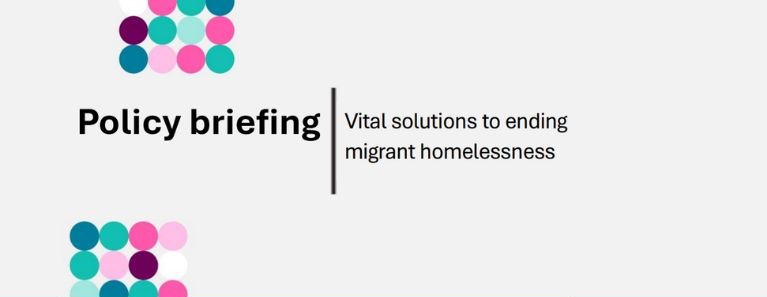
SJOG has once again joined with Homeless Link, the No Accommodation Network (NACCOM) and other 80 frontline organisations working in the fields of homelessness, housing, and migrants' rights to continue advocacy efforts to influence the homelessness strategy.
NACCOM has recently published an updated policy briefing highlighting an increase in homelessness for those with a migrant background, asylum seekers or newly granted refugees. The data collected indicates that this is due to restrictions in accessing asylum and immigration support and over-reliance on statutory voluntary services and short-term emergency accommodation.
We understand that the Illegal Migration Act 2023 and the introduction of the Border Security, Asylum and Immigration Bill 2025 represents a significant responsibility in shaping the UK's approach to border security at a critical moment in both national and international migration policies, but it also bans anyone who arrived 'irregularly' in the UK since 7 March 2023, from ever being granted any form of immigration leave, therefore, excluding them from statutory services.
It is evident that the lack of access to resources can only lead to increased vulnerabilities, and that when people live in a state of permanent limbo and are unable to ever settle their status in the UK, they are more likely to disengage from the system, to be at risk of exploitation and to be excluded from access to services that exacerbate their vulnerabilities: health outcomes, homelessness, human rights, trauma and recovery.
To read the report in full which outlines the key driver to migrant homeless and the policies we believe the government could implement to ensure we live in a society where everyone has a home, go to: Vital solutions to ending migrant homelessness'.
May 2025
SJOG expands to support more communities with new head office opening

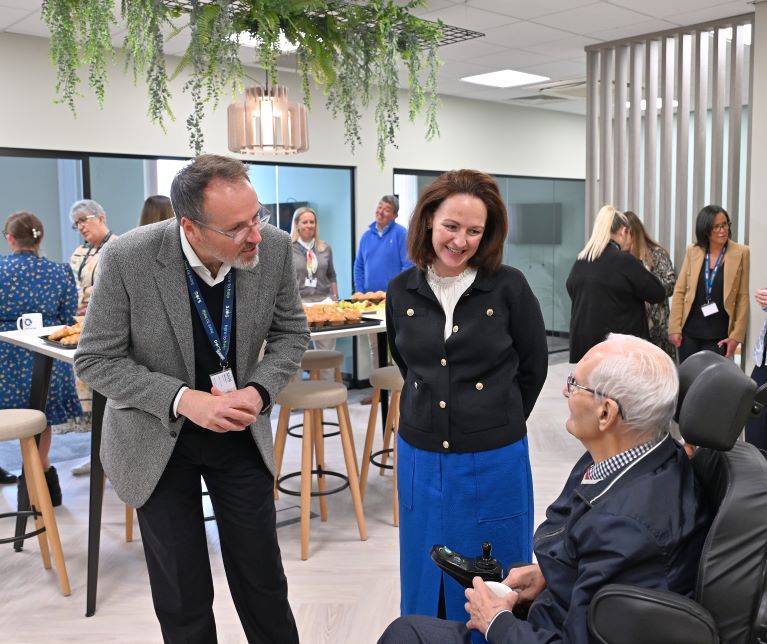

SJOG, a national charity with services around the country and its head office in Darlington officially opened its new office on Friday 25 April 2025.
As the charity is growing to meet more need, bigger space is needed for its head office and as part of its mission to to be of more help is offering space to small local charities and social enterprises to provide meeting and training spaces, access to wi-fi, screen and kitchen facilities.
The new office is based at The Old Exchange building in central Darlington.
The office was officially opened by Lola McEvoy, MP for Darlington, who said, It was a real pleasure to officially open the SJOG office and learn more about the incredible work they're doing to support communities here in Darlington and across the country. As a Living Wage employer, the way they care for their staff is essential to delivering excellent care.
It's fantastic to see them not only advancing their own mission but also opening this new space to support other third-sector organisations doing vital work. I encourage voluntary sector organisations in Darlington to get in touch with them as the offices are state of the art.
It was also an especially lovely coincidence to cut the ribbon on the new headquarters of an organisation that is close to my family."
Paul Bott, Chief Executive said, "SJOG is a well-kept secret. We are the largest charity based in Darlington and have been supporting people in the borough since 1946.
I love our new space. I love that it's a space that has been purposefully created as a hub for all charities and not-for-profit organisations, so that we can all be of help to people in Darlington."
April 2025
Raising Awareness of Modern Slavery
Modern slavery isn’t just a headline — it’s a reality we can change
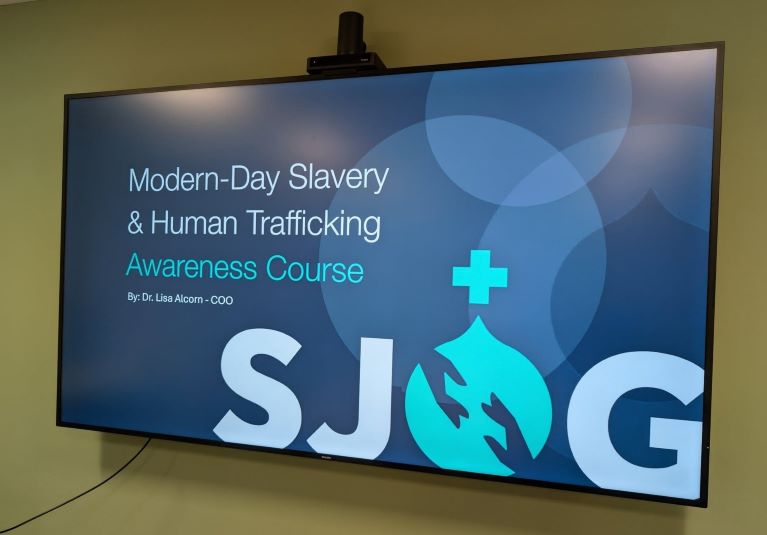
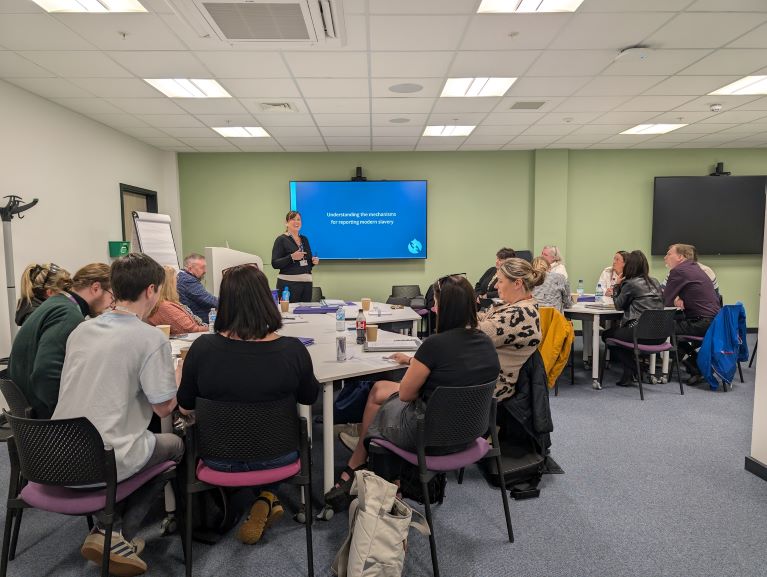
Raising awareness is a crucial step in tackling modern slavery and to help with this we are supporting local organisations through our awareness training.
SJOG’s Chief Operating Officer, Dr. Lisa Alcorn recently delivered Modern Day Slavery and Human Trafficking Awareness training to Middlesbrough Council, helping staff across a number of departments to better understand the impact of this crime, how to spot it and how to address it.
The training focused on key areas such as understanding the scale and types of modern slavery, recognising methods of exploitation, and knowing how to report concerns and act responsibly. It also covered organisational responsibilities under the Modern Slavery Act 2015.
The training received excellent feedback with all participants giving five stars.
This is the first of several courses that will be held over the coming months. If anyone would like further information, please email us at: enquiries@sjog.org.uk
April 2025
World Autism Acceptance Month - April 2025
Autism is not a choice, however, acceptance is.

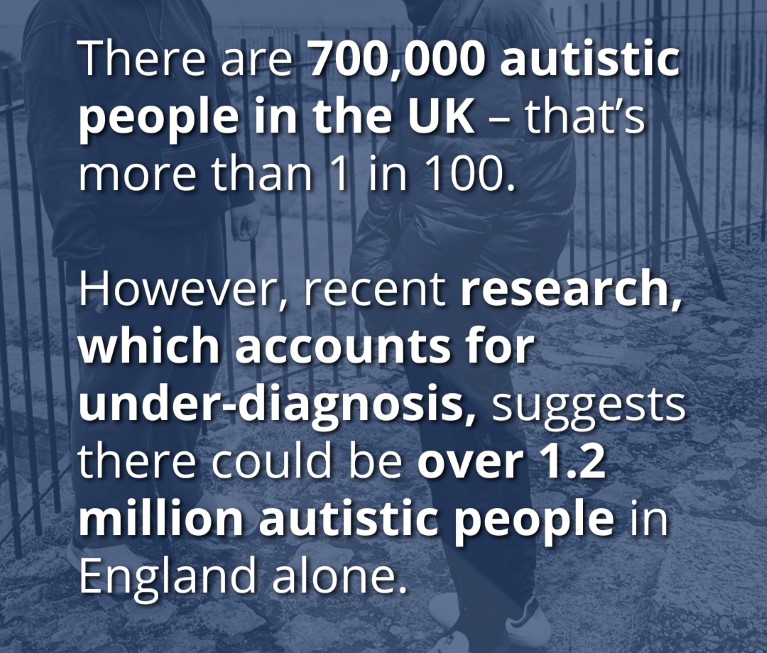
World Autism Acceptance Month, established by the National Autistic Society (NAS), aims to raise awareness of autism and the 700,000 autistic adults and children in the UK, both to educate those unaware of the condition, and to help make the world friendlier to those who are affected by it.
Autism is a lifelong disability which affects how people communicate and interact with the world.
At SJOG, we’re committed to supporting each person with a diagnosis of autism through a unique person-centred approach. We focus on creating meaningful outcomes and improving quality of life.
Throughout the month of April, to mark World Autism Acceptance Month, we’ll be sharing information, resources and ways people can get involved to make a real difference in support the autistic community.
Get involved via our Facebook page: www.facebook.com/SJOGUK
April 2024
World TB Day - 24 March 2025
Yes! We can end TB

Each year on 24th March, we commemorate World TB Day to raise awareness about the devastating health, social and economic consequences of tuberculosis (TB) and to increase the efforts to end the global TB epidemic.
The date marks the day in 1882 when Dr Robert Koch announced that he had discovered the bacterium that causes TB, which opened the way towards diagnosing and curing this disease.
It continues to be the world’s deadliest infectious disease and hence the day amplifies the urgency of ending TB.
Facts:
· 79 million lives saved since 2000 by global efforts to end TB
· 10.8 million people fell ill with TB in 2023
· 1.25 million people died of TB in 2023
This year’s theme organised by the World Health Organisation: Yes! We can end TB – Commit, Invest, Deliver is a bold call for hope, urgency and accountability.
Our contribution at Olallo House, London
It is 12 years since we welcomed the first guest with TB at Olallo House and became a small but crucial part of the support structure that contributes in the fight to eliminate TB. Working in partnership with NHS Out of Hospital Care NHS North Central London ICB (Pathways). ‘NHS Find and Treat’ and University College London Hospitals, we provide specialist medical, social and psychological support enables homeless patients to complete their full course of treatment and address other issues that have contributed to their homelessness.
#EndTB
March 2025
Working together to tackle human trafficking and modern slavery
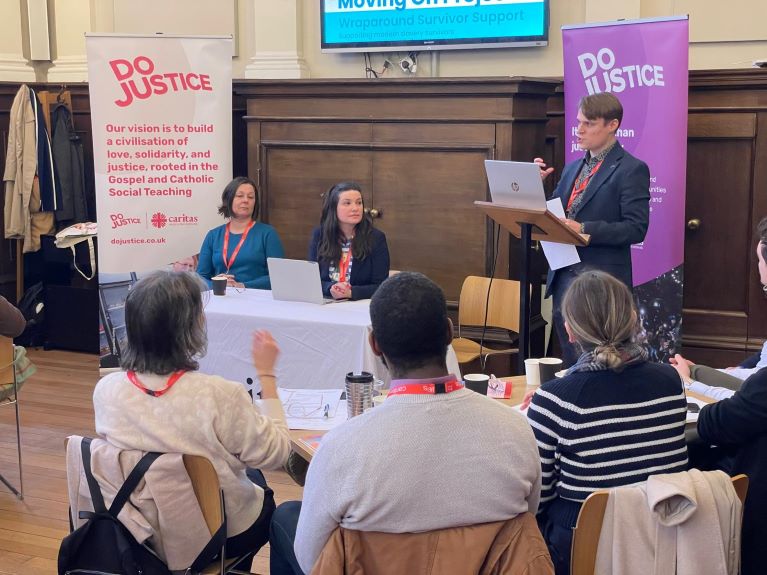
On 4th March, colleagues from our Modern Day Slavery (MDS) services attended the Caritas Social Action Network (CSAN) Migration Alliance meeting at the London Jesuit Centre.
The gathering brought together many other catholic charities working in the migration sector committed to tackling human trafficking and modern slavery.
The event featured insights from Caritas International and their latest strategy in tackling global modern-day slavery, details about the Caritas Human Trafficking & Modern Slavery Ambassador Programme and updates on latest policy and advocacy initiatives across the sector.
SJOG’s senior policy and research officer, Ioana Brezeanu, took part in a panel discussion regarding the challenges faced by survivors of modern slavery within and beyond the National Referral Mechanism (NRM), alongside The Passage and the Medaille Trust.
“This was a great opportunity to present the outcomes of the research we conducted last year on ‘Access to healthcare and treatment for people subject to modern-day slavery and trafficking’ and to share a brief resource with recommendations for professionals on how to better support them in this process.
Click here to read the full research paper: https://sjog.uk/publications-research.php
March 2025
Here to Help recognised as one of Europe's best innovation projects
Project selected as Caritas Laureate Programme
Here to Help, SJOG's suicide prevention programme for people with autism, has been recognised as one of Europe's leading innovation projects. At the Caritas European Innovation Festival held on Friday, 14 February, Here to Help was selected as a Caritas Laureate Programme, affirming its significant impact and effectiveness.
The festival showcased 42 pioneering initiatives from across Europe and beyond highlighting innovative solutions to social challenges.
Since its launch last summer, Here to Help has positively impacted over 19,000 people, with more than 950 professionals receiving autism-specific training. The project's web platform has also seen remarkable engagement, recording over 70,000 interactions to date.
Ashley Wilson, Head of Quality and Service Development at SJOG presented the project at the festival, and an accompanying video was played highlighting the project’s aims and impacts on helping to reduce the prevalence of suicide amongst autistic people and those who support autistic people.
February 2025
Supporting autistic people to get a good night’s sleep
Working in partnership to be of more help
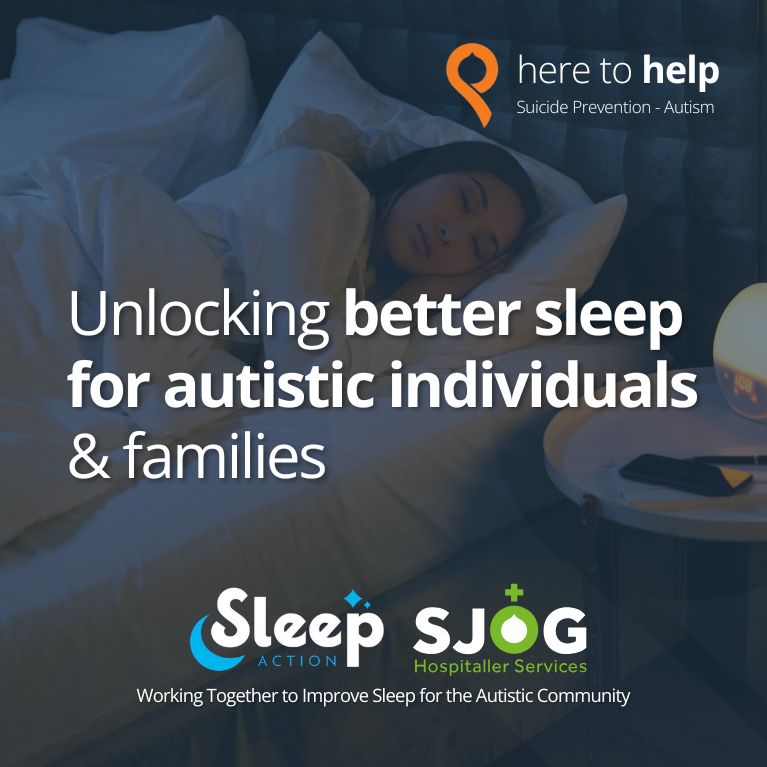
SJOG has recently collaborated with Sleep Action, the UK’s oldest sleep charity and a leading provider of sleep support, training and resources, to produce a range of resources specifically for autistic people.
This collaboration was initiated in response to requests from parents of autistic children who we support through our Here to Help project, and have identified sleep as a priority area.
Together we have created a series of fact sheets, including general guidance on good sleep practices, as well as tailored advice on sleep for autistic adults and teens, parents of autistic children, parents of autistic teens, and the wider family unit.
SJOG's Autism and Suicide Prevention service manager, Rachael, has been working with Sleep Action to develop these resources. "We’re grateful for the opportunity to collaborate with Sleep Action on something that will make a real difference. The feedback we've received clearly shows that these resources are much needed, and we’re excited to share them with people."
You can access these resources on our Here to Help platform here: https://here2help.uk/help-someone-else/
January 2025
SJOG's new service opens in Stockton
Fairfields welcomes its new residents

Fairfields in Stockton has welcomed its new residents – five people who have a diagnosis of autism and associated complex conditions, and who require 24-hour care and support.
An extensive refurbishment has transformed the property to provide innovative space, a capable environment and SMART technology to enhance daily living.
The service, staffed by a team of highly skilled autism practitioners, specialises in practising an Autism Practice Quality of Life Model that encompasses the principles and practices of positive behaviour support. A person-centred profile for each person is developed so that we can adapt environments to people’s unique needs. This approach enables residents to achieve their personal goals and to be as independent as possible.
The opening of Fairfields will provide a model going forward for SJOG to provide more specialised support for people with autism and meet more need.
Best wishes are extended to the service, its team and the new residents as they settle into their home.
December 2024
Samaritan volunteers benefit from SJOG training

SJOG’s Here to Help team has recently delivered online training to over 900 Samaritans listening volunteers, aimed at helping them better understand and communicate with neurodivergent callers.
The training focussed on effective communication strategies for autistic callers and connects to the essential services offered by Samaritans.
Research suggests that autistic individuals are seven times more likely to die by suicide than non-autistic individuals.
Some general factors influencing suicidality in the wider population, such as loneliness, feeling burdensome, and difficulties in expressing emotions, also affect autistic people. However, there are additional, specific risk factors for suicidality among autistic individuals, including black-and-white thinking, social camouflaging, and challenges with emotional recognition.
Vanessa Hamilton, Assistant Director of Learning & Development, Samaritans said, “This was an excellent, informative and sensitively delivered webinar that gave great insights and practical tips on how Samaritans listening volunteers can better support our autistic callers.”
We are proud to support the Samaritans in delivering their vital services through our training.
To learn more about Here to Help, visit our platform: www.sjogheretohelp.uk
November 2024
Trustees' Week 4th - 8th November 2024
Celebrating our trustees

Trustees' Week is an opportunity to celebrate the achievements of nearly one million trustees across the UK, and to honour their commitment and expertise which are vital to guiding organisations and making a lasting impact in the communities they exist to serve.
Trustees’ Week also provides a chance to connect, share experiences, and learn about becoming a trustee. Whether as an existing trustee or interested in becoming one, Trustees’ Week offers events, training sessions, and guidance to help people develop their skills and deepen their understanding of the role. To find out more, click following the link: Trustees Week – Showcasing the work of charity trustees
At SJOG we thank Emma, Duncan, Lesley, Emma, Jack, Claire, Malachy, Abigail, Melanie, Mark, and soon to join us – Steve, for their commitment and huge range of skills and expertise they bring to SJOG. And thank you to all the trustees who have previously served as trustees on our board.
https://sjog.uk/people.php
Follow us this week on social media to learn more: www.facebook.com/SJOGUK https://www.linkedin.com/company/saint-john-of-god-hospitaller-services
#TrusteesWeek
November 2024
Anti-Slavery Day 2024

Anti-slavery day takes places every year on 18th October and is a time to encourage governments, businesses, colleagues, family and friends to do what they can to prevent human trafficking and protect victims of modern slavery. An estimated 40 million people are in modern slavery throughout the world and an estimated 122,000 people in the UK.
What is Human Trafficking?
The UN defined human trafficking in the Palermo Protocol as the ‘recruitment, transportation, transfer, harbouring or receipt of persons by means of threat, or use of force, coercion or deception…to achieve the consent of a person having control over another person, for the purpose of exploitation’ . According to this definition, trafficking includes sexual exploitation, forced and bonded labour, domestic servitude, any form of slavery and removal of organs.
What are we doing at SJOG?
At SJOG we talk a lot about modern day slavery and human trafficking. We are the largest provider in the UK of safe houses that support people who have been subject to modern day slavery and human trafficking, as well as supporting many people through our outreach services in both London and the North-West.
We invest in educating our colleagues, and all the people we come into contact with about slavery at human trafficking. This included a session at our annual conference held on 16 October in the presence of over 100 colleagues, highlighting how we might spot the signs of modern slavery in terms of a person’s appearance, their behaviour and restricted movement.
We are also working with other organisations working in this area to lobby the UK government on the changes we would like to see in the way people have been subject to modern slavery or trafficking are supported.
“Together, we can break the chains of human trafficking and build a more just and equitable future for all.”
Read more at www.sjog1810.uk
#AntiSlaveryDay2024
October 2024
World Mental Health Day - 10 October 2024
Workplace Mental Health

World Mental Health Day is celebrated every year on 10 October. This year’s theme, which is set by the World Federation of Mental Health, is workplace mental health. The theme highlights the importance of addressing mental health and wellbeing in the workplace, for the benefit of people, organisations, and communities.
People are encouraged to use this day to come together to talk about mental health and show how much mental health matters.
It matters at SJOG, and there are a number of initiatives we do already, but there is always more, and encouraging people to talk about their mental health will continue to be a priority.
Current initiatives:
- Bright Line - Bright Line is a dedicated confidential line run by SJOG Mental Health First Aiders to offer signposting and a friendly ear to colleagues who are struggling with their mental health.
- Wellbeing breaks - We prioritise the wellbeing of our colleagues and encourage dedicated 20-minute breaks, on top of regular ones, if needed. When feeling overwhelmed, these breaks offer crucial moments to reset and recharge.
- Mental health first aiders - We recognise the importance of good mental health and are training colleagues to be first aiders in mental health in the same way we have physical first aiders.
- Self-care sessions - We host interactive sessions focusing on self-care, wellbeing, and stress management. Teaching effective strategies and tools for nurturing mental and physical health.
- Flexibility of work patterns - A good work and home life balance is very important and to support this we offer flexibility of work patterns wherever possible.
- 24/7 Access to a GP - Our health benefits package offers reimbursements on healthcare costs, and there is access to a GP helpline 24/7.
- Employee Assistance Programme - This counselling and advice portal offers a wealth of advice and support on: legal, family, relationships, money and health. Totally confidential and available 24/7.
- Meal a Day - SJOG are supporting colleagues by providing them with a ‘meal a day’ while they are at work.
- SJOG Step Club - The SJOG Step Club encourages colleagues to get moving and prioritise physical and mental health by tracking their steps and engaging in friendly competition with co-workers.
Follow us this week on social media to learn more: www.facebook.com/SJOGUK https://www.linkedin.com/company/saint-john-of-god-hospitaller-services
#WMHD2024
October 2024
World Suicide Prevention Day – 10th September
Changing the narrative on suicide


Changing the narrative on suicide aims to inspire individuals, communities, organisations, and governments to engage in open and honest discussions about suicide and suicidal behaviour. By initiating these vital conversations, we can break down barriers, raise awareness, and create better cultures of understanding and support.
It is estimated that there are currently more than 700,000 suicides per year worldwide, and we know that each suicide profoundly affects many more people. Suicide remains a critical global issue, affecting individuals and communities worldwide.
In July 2024, SJOG ’s Here to Help project was officially launched and focuses on suicide prevention among autistic people in the Teesside area. Autistic people are 9 times more likely to die by suicide than the general population, and autistic young people are 28 times more likely to think about or attempt suicide than their non-autistic peers.
Since its launch the project has supported over 200 autistic people and 90 family members. The number of professionals who have engaged with the project exceeds 220, and we have supported over 350 professionals with autism-specific training.
For more information about Here to Help go to: www.sjog.uk/heretohelp
Follow us on our social media for more information and conversation: www.facebook.com/SJOGUK https://www.linkedin.com/company/saint-john-of-god-hospitaller-services
#WorldSuicidePreventionDay. #StartTheConversation
September 2024
SJOG Homes for Ukraine Team celebrate project

SJOG's Homes for Ukraine project has successfully reached its conclusion. Since its inception in September 2022, SJOG Homes for Ukraine has proudly supported 300 people displaced by the war in Ukraine both directly through connecting them with sponsors across the UK, and indirectly through information sessions and signposting.
Key achievements of the project include:
- 140 guests placed with sponsors in the UK. This included 44 children.
- 96 guests have completed their 6-month placements.
- 50 guests have transitioned to private rented accommodation.
- The HFU team conducted 35 information sessions for both sponsors and guests, reaching over 200 people.
- 94% of guests and 90% of sponsors said that the team made the right match.
- 90.3% of guests said the accommodation and location met expectations.
- 96.8% of our guests and 93.2% our sponsors said that their relationships with each other were excellent.
At an event on 19 June held in London, people came together to celebrate the achievements of the project. Thanks were extended to funders of the project: the Albert Gubay Charitable Foundation, the Department for Levelling Up, Housing and Communities and the Church Urban Fund, and acknowledgement was made to the project delivery team at SJOG and SCAN for their tireless work and dedication. Not least, huge thanks were given to the sponsors who generously opened their homes and hearts to those displaced by the war.
To read the project's evaluation report, click here: https://sjog.uk/pdf/HFU-Report.pdf
We still have resources available and information where people can find support, click here to find out more: https://sjog-homesforukraine.uk/
August 2024
New web platform provides online resources
Here to Help – suicide prevention


Here to Help, SJOG’s new initiative focused on suicide prevention among autistic people in Teesside has officially been launched with an event at Stockton Football Club on Monday 1st July and welcomed autistic people, their family and friends to come and learn more about the project.
At the event, which hosted a number of activities, attendees were also able to see the newly-launched web platform which provides accessible information about suicide and autism.
Here to Help which is funded by the Department of Health and Social Care, aims to reduce the stigma around suicide and empower people to feel able to support individuals experiencing suicidality.
Autistic people are 9 times more likely to die by suicide than the general population, and autistic young people are 28 times more likely to think about or attempt suicide than their non-autistic peers.
Access the web platform here: www.sjogheretohelp.uk
July 2024
Pushing for hardship to a top priority..
From day one

SJOG stands with the Joseph Rowntree Foundation (JRF) along with over 200 organisations who are committed to ending poverty, and have called on the people most likely to be the next prime minister to put tackling hardship at the top of their agenda from day one.
Frustrated by the ‘stark lack of focus’ from Rishi Sunak and Keir Starmer during the campaign, the diverse network of organisations have placed their message that hardship must be at the top of the prime minister's to-do list in national newspapers with one week to go until the election result.
The leaders of UK's political parties have faced questions from the public on the campaign trail about levels of hardship in the UK, as JRF reveals the relentless reality of years-long hardship. Their latest research finds:
7 million low-income families have gone without essentials like food, heating and adequate clothing in the last six months.
7 in 10 (71%) low-income households in the bottom 20% of incomes were going without essentials in May this year, the same as May last year.
Over the past five years, the number of people experiencing destitution more than doubled. Four million experienced destitution in 2022 including one million children and 2.4 million are people with a disability or limiting health condition. (Source: JRF Destitution in the UK 2023).
The letter signed by organisations including the Trussell Trust, Citizens Advice, Crisis, Age UK, Barnardo's, Mencap, Scope, Mental Health Foundation and many more, says, "It is clear [the public] want to see action and commitments to turn this situation around so that no one is forced to go without the essentials or need a food bank to survive.”
To read the full press release from JRF click here: https://www.jrf.org.uk/news/hundreds-of-charities-push-for-hardship-to-be-top-of-prime-ministers-priorities-from-day-one
#OurEssentials
27 June 2024
Learning Disability Week 17th – 23rd June 2024
“Do you see me?”
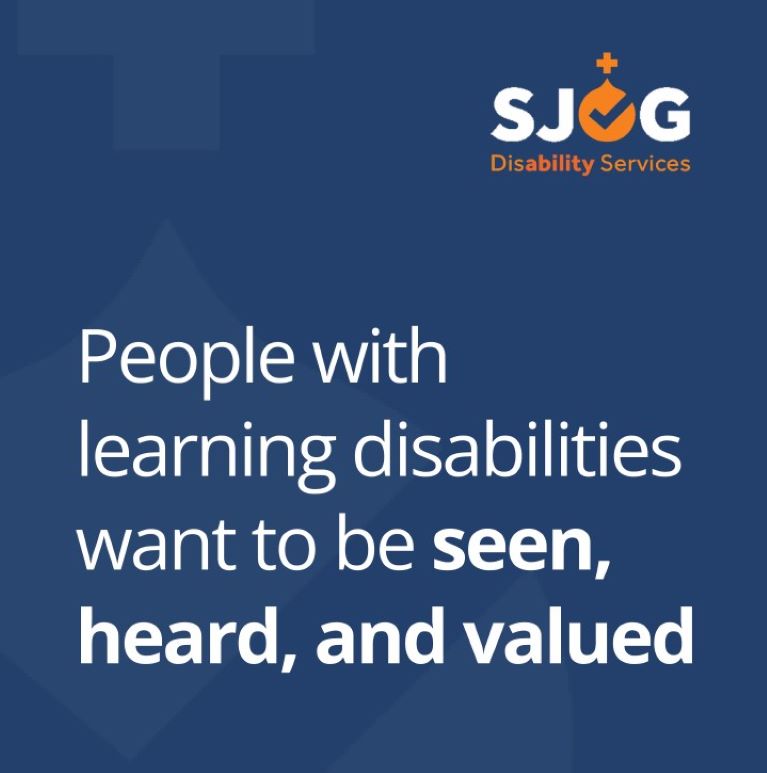
Learning Disability Week is celebrated annually in the third week of June, and aims to educate, spread awareness, and increase understanding of learning disabilities.
The theme for Learning Disability Week this year is “Do you see me?” and additionally through the week asking: Do you understand me? Will you work with me? Do you hear me? Do you include me? Will you support me?
SJOG has a long history and vast experience in working with people with disabilities – learning disabilities, physical disabilities, autism and complex needs. Providing high quality services, we aim to support people to live how and where they choose, with expert care and support provided by experts in their fields.
People we serve are central to how we shape services and how people receive their support. In 2020 we established an Advisory Council to better hear their voices and the group have been involved in a number of initiatives including recruitment and policy-making. Last year the Council were integral in creating the ‘People’s Charter’ consisting of 12 standards developed by and for the people we support.
1. You must be happy to work with me and smile
2. Understand me and my needs
3. Respect me and my belongings
4. Support my privacy
5. Take time to get to know me
6. You must have a good sense of humour and be patient
7. Don’t bring problems to work – bring solutions!
8. Listen and value everyone
9. Less paperwork and more time with me
10. Ask if I am ok – I will let you know
11. Understand my health needs
12. Advocate with me, not for me
This charter has been embedded into our recruitment and induction processes and is now part of quality auditing across our services.
Ken lives at the Minims in Hatfield tells us why being part of this group is important to him. “I like speaking on behalf of everyone at the Minims. I am their voice. It’s an important job and I take it very seriously.”
Follow us this week on our social media pages: www.facebook.com/SJOG-UK
June 2024
Putting victims first: Renewing the UK commitment to the safety of victims of trafficking and modern slavery.’

The 100 day manifesto launched on Monday 10 June 2024, has been created between the 13 providers of support to survivors of modern slavery under the Modern Slavery Victims Care Contract (MSVCC). This includes SJOG, the Salvation Army and 11 other contractors who together have supported over 20,000 potential victims.
Together we form the collective of professionals who interact and engage with all potential victims in the National Referral Mechanism. We have drawn on expertise and experience to share these five key calls on the next government which can be done with limited legislative change and expense.
The manifesto sets out five practical and deliverable recommendations from Modern Slavery experts to be implemented within the first 100 days of a new government:
1. Return Human Trafficking and Modern Slavery to the Minister for Safeguarding’s brief, not the Minister for Immigration.
2. Suspend clauses 22-25 of the Illegal Migration Act 2023.
3. Prioritise decisions on the people in the National Referral Mechanism who have waited the longest.
4. Ensure no Public Order Disqualifications occur where potential victims have no legal representation through a review of the Modern Slavery Statutory Guidance.
5. Adopt a multi-disciplinary approach complemented by mechanisms for government accountability.
To read the full manifesto, click here: https://sjog.uk/pdf/Manifesto-for-the-first-100-days.pdf
June 2024
Here to Help press launch 10 June 2024

Here to Help, SJOG’s new initiative focused on suicide prevention among autistic people in Teesside is being launched at a press event in Middlesbrough.
Since announcement of the funding award from the Department of Health and Social Care (DHSC), the project has been developing to be able to provide:
A web-platform which has been co-produced with autistic individuals and their supporters. This platform provides accessible information and resources about suicidality and autism. The platform will be regularly updated to address community priorities.
- An awareness roadshow using SJOG’s ‘Magic Space’ mobile sensory unit. The purpose of this is to visit communities within the Tees Valley and raise awareness of the campaign.
- Workshops to support autistic individuals with their mental health.
- Training for professionals and parents and carers on how to support autistic individuals with their mental health.
Rachael Smith, Here to Help Manager, said: “We believe that this project will reduce the stigma around suicide and empower people to feel able to support individuals experiencing suicidality. I am excited to lead on a project focused specifically in Teesside, and feel that it will add a lot of value to the local community.”
The ‘Here to Help’ project is of vital importance because autistic people are 9 times more likely to die by suicide than the general population, and autistic young people are 28 times more likely to think about or attempt suicide than their non-autistic peers. Furthermore, the Tees Valley has one of the highest prevalence rates of suicidality, demonstrating that this project is crucial for the region.
The press launch for ‘Here to Help’ coincides with the start of Carers’ Week and comes ahead of a general public launch of the ‘Here to Help’ project on the 1st of July.
Listen to Rachael’s interview with BBC Radio Tees talking about the project and launch: Gary Philipson - 05/06/2024 - BBC Sounds (from 18 minutes).
June 2024
Mental Health Awareness Week: 13th-19th May 2024
Movement: moving more for our mental health


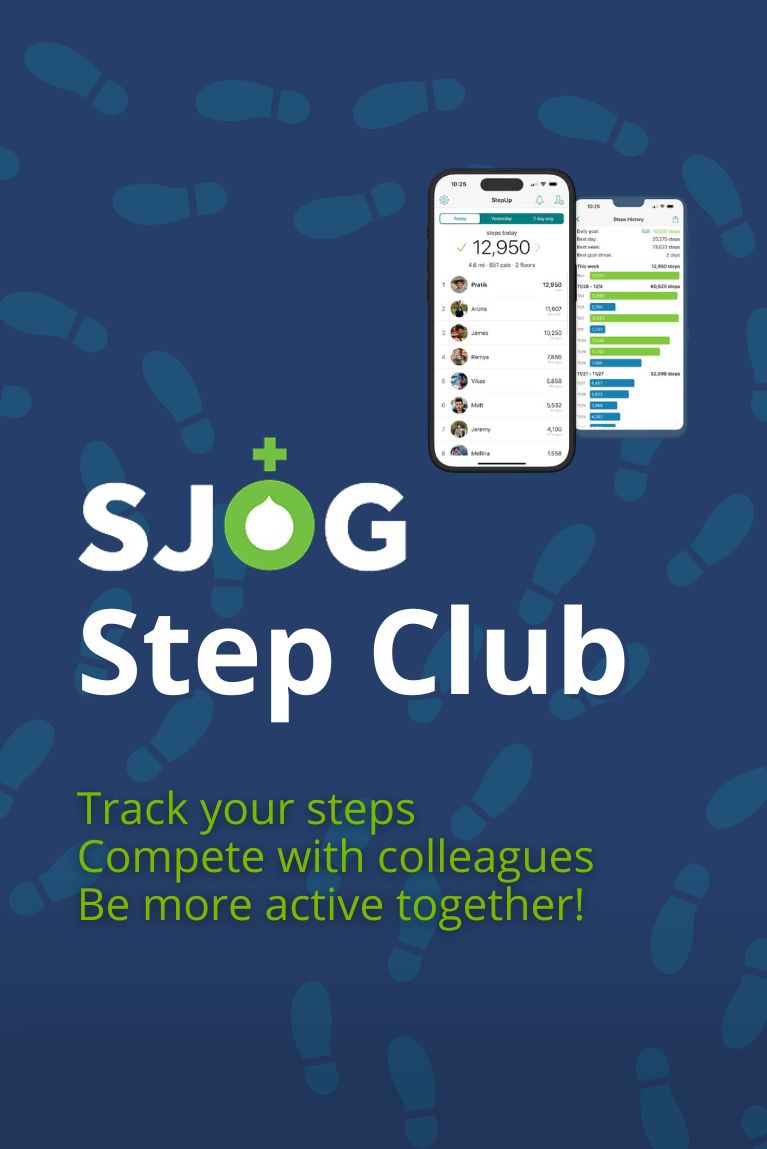
13th to 19th May marks this year’s Mental Health Awareness Week. The theme promotes the benefits of movement for mental health, which range from improved mood, reduced anxiety, lowered inflammation and stress, improved memory, increased confidence and improved sleep, to name but a few.
At SJOG there have been a number of initiatives taking place in the week to promote good mental health amongst our colleagues:
Self-care sessions
Interactive sessions focusing on self-care, wellbeing, and stress management. Teaching effective strategies and tools for nurturing mental and physical health.
‘Fit Your Own Oxygen Mask First’ workshop
This session posed the questions, ‘Are you putting yourself high on your own priority list?’ and ‘Are you taking the time to self-reflect and assess any areas of your own self-care that you might be neglecting or that you feel you need to improve upon?’
The session also covered the BACE model, looking at four simple areas: Body, Achieve, Connect, and Enjoy, as a way of calibrating what's going well and where we need to focus our energy to increase our self-care practice to increase our overall wellbeing.
SJOG Step Club
Further promoting the benefits of moving, the SJOG Step Club was launched during Mental Health Awareness Week - a group where colleagues can track steps and encourage each other to get moving and prioritise their physical and mental health.
#MomentsForMovement
May 2024
SJOG Service Manager Nominated for Stars of Social Care Award
COMPLEX CARE AWARD – NICOLA TOTH


Congratulations to Nicola for the nomination under the complex card award, which recognises a team or individual delivering a care home service, and who have showcased the skills, awareness and leadership necessary when caring for someone with complex health and care needs.
Nicola is the service manager at the Old Vicarage and has been pivotal to the implementation of an Autism Quality of Life Measurement Tool in her service and has been influential in remarkable outcomes for the people we support who have a diagnosis of autism and complex needs. The service which opened in 2022, is thriving in quality and practice supporting 4 gentleman to transition effectively and shape their aspirations for the future.
The Stars of Social Care Awards shine a light on the stars of social care, paying tribute to the workforce, who through dedication and a commitment to care, go above and beyond to support those who are most vulnerable.
“People who work in social care transform lives, and they are the unsung heroes within our communities. They deserve our gratitude and recognition. I am delighted to be supporting the Stars of Social Care Awards, which are an opportunity to acknowledge and celebrate the fantastic people who work so hard for the benefit of others.” Professor Martin Green, CEO – Care England
Winners will be announced at the award ceremony taking place in London on 15 June hosted by This Morning’s presenter Josie Gibson.
Good luck Nicola!
May 2024
Meeting more need
A new service for SJOG
North View in Jarrow is a registered care home providing personal care and support for up to 6 adults who may be living with learning disabilities and autism.
The contract awarded to SJOG by South Tyneside Council will commence in early July and will see SJOG expand its services to meet more need.
We look forward to welcoming on board the staff team where together we will provide a high quality, personalised care home service that promotes choice, dignity, control and quality of life for everyone using the service, while assisting them to develop their skills and achieve clear individual outcomes.
May 2024
SJOG takes part in Social Housing Allocation Consultation

SJOG has recently responded to the Government’s consultation on Social Housing Allocation which ran from January to March this year.
The consultation applies to the Social Rented Sector (SRS) and proposes changes to the allocations system so that it prioritises those who have a strong connection to the UK, their local area and those that do not disrupt communities through anti-social behaviour or terrorism offences.
At SJOG we are aware that in 2022-23 only 9,561 social homes were delivered in England, compared to nearly 40,000 in 2010 (according to NACCOM) and we understand the current pressures on social housing to ensure that allocation is prioritised to those who are most eligible, due to a lack of housing supply.
However, homelessness is currently at record levels. Recent data published by DLUHC has revealed a significant rise in rough sleeping in England, particularly amongst asylum leavers and migrants from outside of the EU, with 7,072 people shaving slept rough over the month of December 2023 - an 18% increase on December 2022.
It is of particular concern that vulnerable migrants who are subject to immigration control are excluded from homelessness assistance, and therefore from housing support. Additional language barriers, a lack of understanding of the housing market, financial constraints, and a lack of local authority support to accessing the private renting sector also contribute to a perpetuation of unstable living conditions.
In response to the consultation, we recommended:
- that vulnerable migrants at risk of homelessness (such as retired or incapacitated workers), with limited right to remain, who cannot be in employment nor entitled to Universal Credit, should be entitled to housing allocation, in addition to welfare policies and immigration support.
- the housing allocation cap should be in place for those who cannot demonstrate local connection but are at risk of harm/homelessness, such as people subject to modern-day slavery and trafficking, newly granted refugees and people discharged from hospitals in recovery settings.
- to exempt people who are entitled to PIP, Disability Living Allowance and Pension Credit from an income test, as well as people subject to modern-day slavery and trafficking who are given limited leave under Appendix Temporary Permission to Stay for Victims of Human Trafficking or Slavery of the Immigration Rules.
Feedback from the consultation is due to issued later in the year.
A better understanding of latest Social Housing regulations and their impact on homelessness prevention strategies can be found in our Policy Paper from September 2022: https://sjog.uk/pdf/Research/Social-Housing-Policy-Paper.pdf
April 2024
Autism Acceptance Month
April 2024


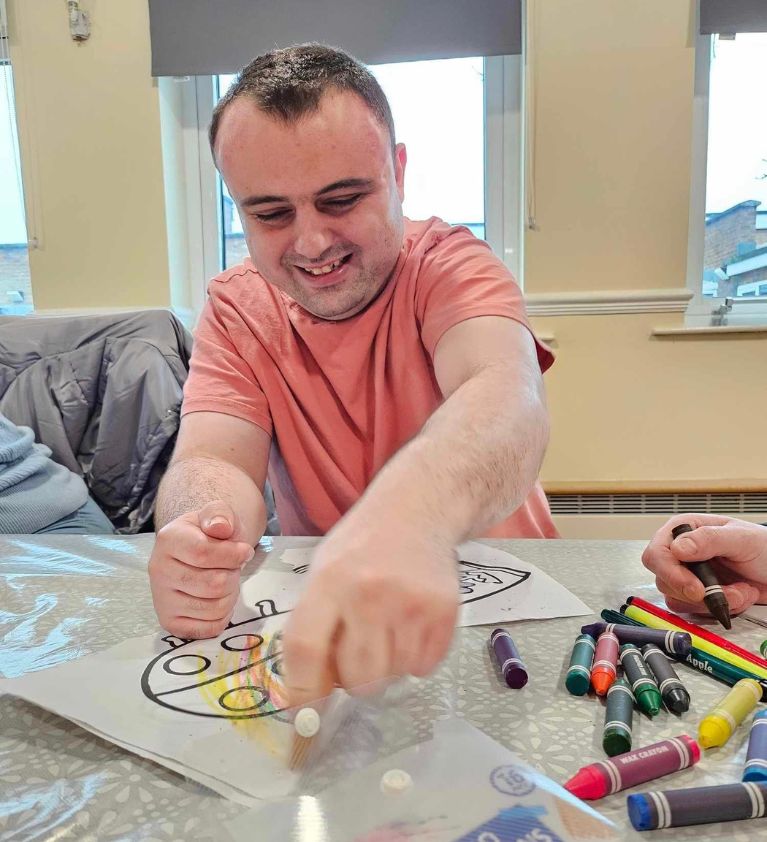
Autism Acceptance Month runs throughout April and is an opportunity to raise awareness about autism, to promote acceptance, and to celebrate the achievements and contribution of people with autism.
Autism is a lifelong disability that affects how people communicate and interact with the world. In the UK, there are 700,000 autistic adults and children, and raising awareness of autism will help their acceptance in our communities and workplaces.
Autism is a spectrum disorder which means people with autism can have varying support needs. One third of people with autism also have a learning disability.
Some autistic people will have high support needs, which may mean that they require full time care and support. Some people may need a bit of support with day-to-day activities, while others live fully independent lives.
With the right support in place, all autistic people should be able to live the life they choose.
At SJOG, 39% of the people we support in our learning disability services are autistic. To deliver the highest level of support and understanding, 96% of our colleagues across our autism services have an Autism Level 2 qualification and 67% of our operations and service management colleagues have a post graduate degree in autism, and leading our operations, we have Dr Lisa Alcorn with a doctorate in autism and positive behaviour support, who says, “One of my many responsibilities is to not ‘fix’ people with autism, but to create inclusive and capable environments so that people can thrive.”
Follow us this week on Facebook and LinkedIn for a month of autism-related posts: www.facebook.com/SJOGUK and https://www.linkedin.com/company/saint-john-of-god-hospitaller-services
April 2024
World TB Day - 24 March 2024
Yes! We can end TB

World Tuberculosis (TB) Day, 24 March 2024, continues with the theme “Yes! We can end TB”. Organised by the Word Health Organisation (WHO) it provides an opportunity to raise awareness, and also the opportunity to renew commitment, inspire and take action to end TB.
TB is still one of the world’s deadliest diseases with around one quarter of the world’s population infected. In recent years, there has been a worrying increase in drug-resistant TB.
Drug-resistant TB is most prevalent among people with social risk factors, including homelessness, especially rough sleepers who are more likely to be infectious and less likely to complete their treatment.
As part of our commitment to raising awareness, SJOG’s Chief Development Officer, Dr Jamie Mackrill presented at a conference organised by Leicester, Leicestershire and Rutland (LLR) TB Nursing Service which provided a day of focused learning, networking and collaboration to develop actions for addressing the challenges of TB in the LLR area and share innovative and effective practices to deal with the growing TB caseload.
Dr Jamie delivered a presentation on our work at Olallo House in tackling TB among street homeless people.
It is almost 11 years since we welcomed the first guest with TB at Olallo House and became a small but crucial part of the support structure that contributes in the fight to eliminate TB. Providing specialist medical, social and psychological support enables homeless patients to complete their full course of treatment and address other issues that have contributed to their homelessness.
Treatment for drug-resistant TB can take up to two years.
Please support Olallo's work:
As we mark World TB Day and celebrate our work at Olallo House supporting some of the most vulnerable TB patients through their treatment and with the other complexities of their lives, we continue to seek funding to complement their treatment package. Please donate and help us to help people rebuild their lives: https://www.justgiving.com/campaign/SJOGOlallo
March 2024
Last week on 7 March, SJOG’s Policy and Research Officer
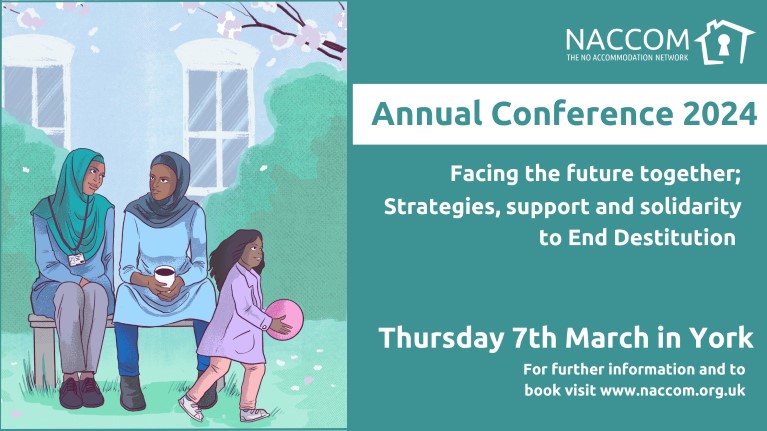
Last week on 7 March, SJOG’s Policy and Research Officer, Ioana Brezeanu presented at NACCOM’s Annual Conference held in York, the theme of which was ‘Facing the future together; strategies, support and solidarity to end destitution’.
Over 140 delegates representing 65 organisations attended the one-day event, which aimed to promote learning, good practice and solidarity across the NACCOM network.
During the day, delegates had the opportunity to participate in a series of practical workshops on topics including building lived experience representation and developing accommodation projects.
Ioana took part in one of the day’s workshops: ‘Working with people with complex needs’ and discussed the work carried out in one of SJOG’s homeless service in London – Olallo House.
Together with frontline charity leaders, they reflected on how to navigate the complex challenges faced by people who experience homelessness and destitution, and in particular those with No Recourse to Public Founds (NRPF); with the need to address accessing support and moving on independently.
Some of the topics explored can be found via Padlet Activity - Complex Needs, which is open to consultation. The outcomes will result in the development of resources and information to support NACCOM members in working with people with complex needs.
March 2024
SJOG receives DHSC funding to launch suicide prevention project


The Department of Health and Social Care (DHSC) has made available a £10 million grant fund to support suicide prevention activities delivered in England by voluntary, community or social enterprise (VCSE) organisations in 2023 to 2025.
SJOG is amongst a number of organisations to be funded.
The funding will fuel the launch of ‘Here to Help’ - a new initiative focused on suicide prevention among people with autism in Teesside.
1 in 100 people are autistic in the UK – totalling more than 700,000 individuals. People with autism are 9 times more likely to die of suicide.
SJOG has been working with people with autism to provide the information and interactive resources they, and their family, friends, carers, schools, employers and universities across the Tees Valley local authority area need.
Dr Lisa Alcorn, Chief Operating Officer, said, “This project represents a crucial step forward in addressing the heightened risk of suicide among people with autism. Our goal is to provide comprehensive support and resources to those in need.”
The project is due to be launched in early summer 2024 and will also involve local charity MAIN.
More information can be found at: www.sjog.uk/heretohelp
March 2024
SJOG contributes to CQC’s consultation
New visiting regulations guidance
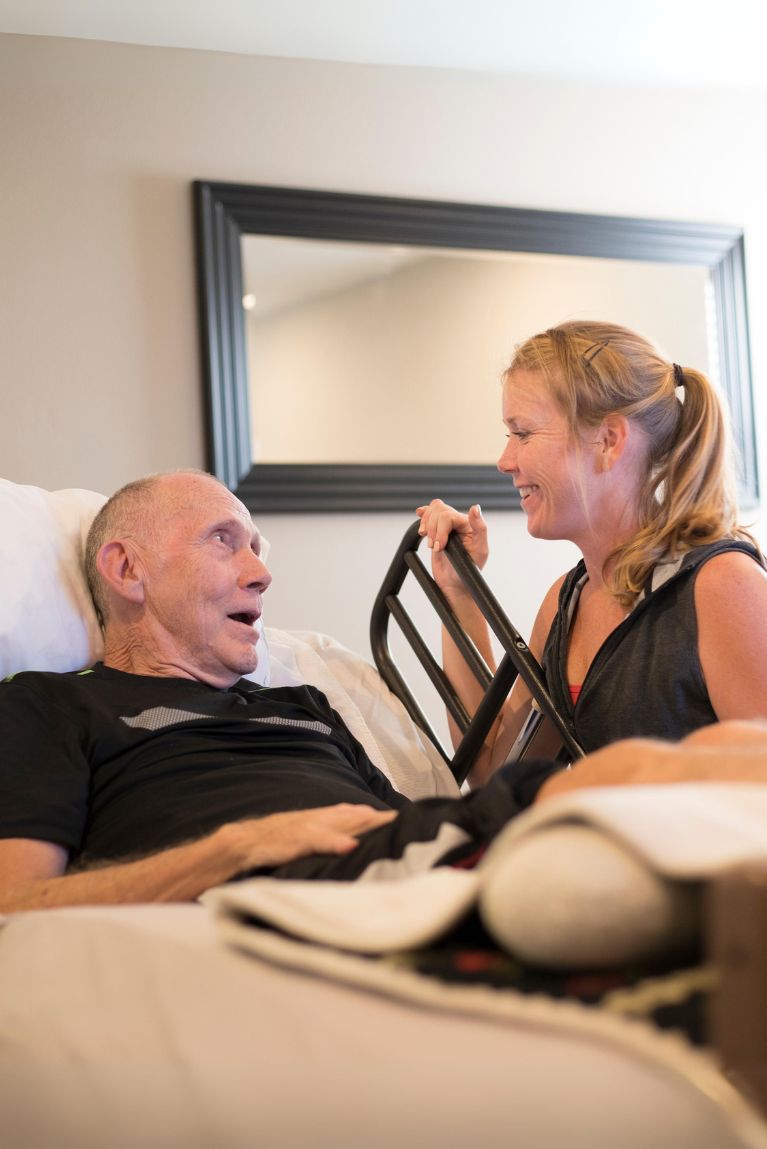
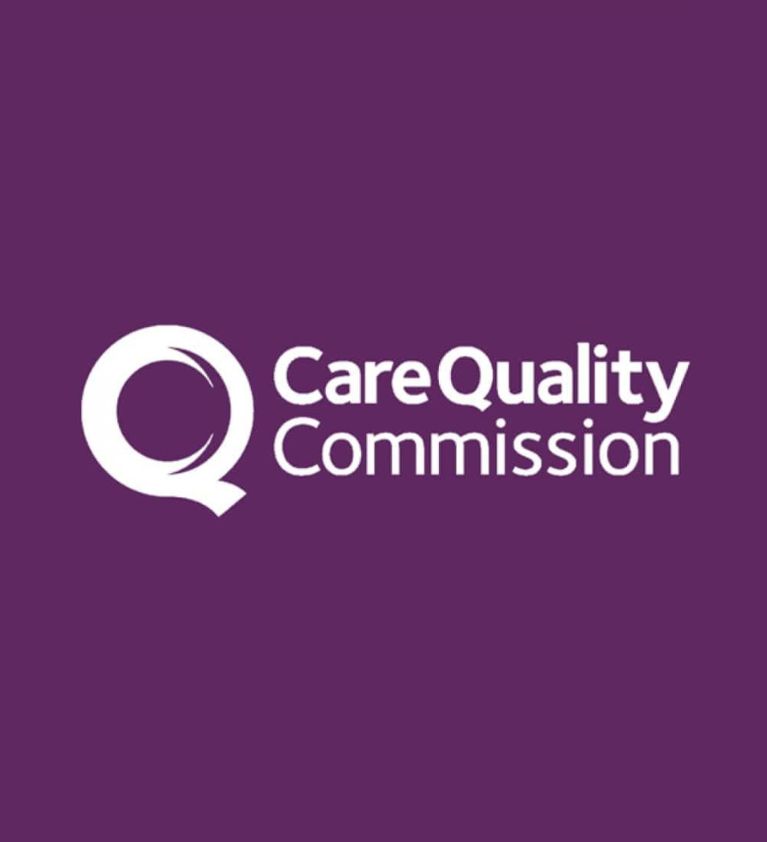

SJOG answered CQC’s call for consultation on the guidance for providers on the government’s new visiting regulations for care homes, hospitals and hospices, following amendments to the Health and Social Care Act 2008 (Regulated Activities) Regulations 2014: Regulation 9A.
With Covid-19 visiting restrictions continuing to affect at least 35% of UK adults in prolonged isolation, SJOG welcomes this consultation on CQC’s guidance. Regulation 9A explains what providers must do to ensure they respect the right of each person when they are visited and accompanied, for example to medical appointments, following an assessment of their needs and preferences.
While isolation doesn’t always lead to loneliness, it can lead to risk of early mortality, and has been associated with a 50% increased risk of dementia. At SJOG, we recognise that in a post Covid-19 world, measures and precautions are necessary to ensure that visiting and accompaniment can happen safely.
In response to the consultation, we recommended:
- Providing guidance on how to improve communication between all parties involved in decision-making processes, including family, friends and carers.
- Investing in community-based support to address the gaps in provision, including at the weekend and evenings or outside working premises.
- Providing hospitals, care homes and hospices with the necessary guidance and tools, such as training and digital technology solutions, to better determine the most appropriate way to assess that visiting and accompaniment can happen safely.
CQC aim to publish their response to the consultation in early April 2024.
February 2024
Second anniversary of the invasion of Ukraine
Two years on and the war continues
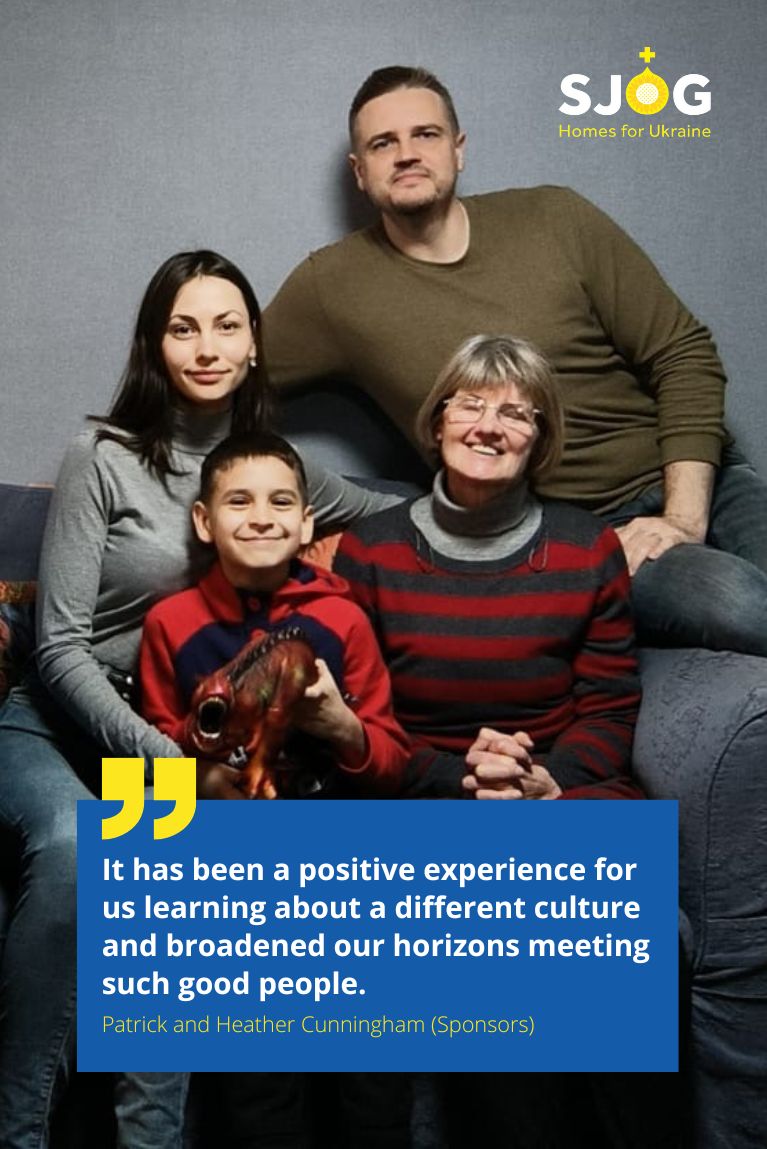
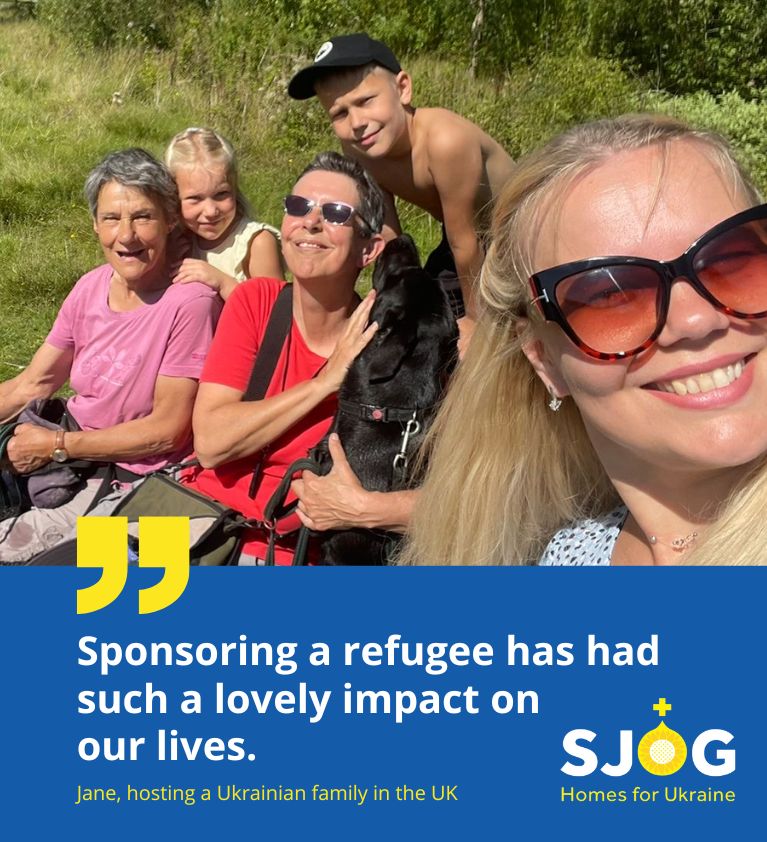
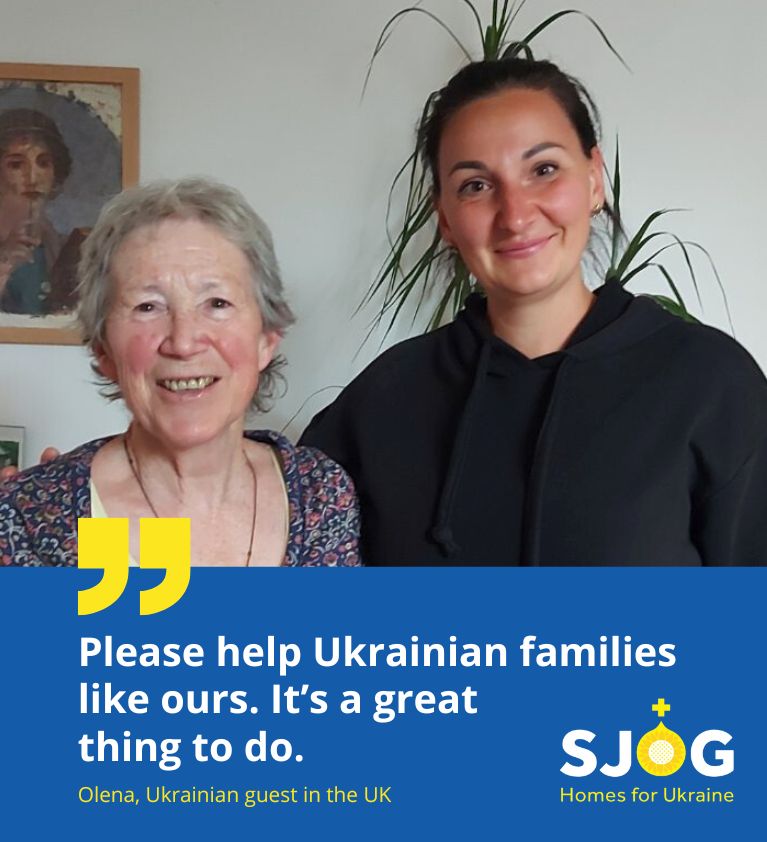
24th February 2024 marks the second anniversary of the invasion of Ukraine by Russia. The impact on Ukrainians over these two years has been immense, with millions fleeing their homes to find refuge throughout Europe. The estimated figure is 10+ million people (source UN). Over 300,000 have sought refuge here in the UK (source Home Office).
The government’s Homes for Ukraine Scheme in the UK was established to match people willing to take Ukrainians into their homes, with those in need.
SJOG became an official partner of this scheme in the summer of 2022, and in partnership with Caritas Social Action Network, offer a matching pathway, training and support programme for sponsors and guests.
To-date the project has supported over 250 individuals with 110 guests having been placed with hosts in the UK.
Support includes online training and information resources for both hosts and guests, transfers from the Ukrainian border to the city nearest to their future home, and a ‘belonging’ box is given to make families welcome when they arrive. The programme also ensures that support from the team and local communities is available to make the experience as seamless and fulfilling as possible.
For many, both hosts and guests have found their experiences positive and complimentary of the work and support provided by SJOG’s Homes for Ukraine team – Mariia, Sofiia, Anastazia and Michael.
“I would like to thank all the organisers and team members of SJOG for this incredible program. My experience in the UK has been extremely positive, with the country proving to be exceptionally hospitable. The sponsors turned out to be unbelievably wonderful people who not only helped me with integration but also shared valuable insights about the area, making life easier and more comfortable.” Vira (guest)
“Thank you for your support at every stage, we almost didn't feel any great difficulties connected to this process, from beginning to end.. There was a feeling of communication with you that it's not just a job for you; it is a mission. That is very precious.” Valentyna (guest)
As the war enters its third year, the need for hosts in the UK continues. For more information on how to sponsor a family or an individual, go to: www.sjog-homesforukraine.uk
February 2024
Bede’s Close achieves NAS accreditation
SJOG service recognised once again for good autism practice

SJOG’s care home in Bradford has been awarded Autism Accreditation by the National Autistic Society, the UK’s leading charity for people with autism. This is SJOG's second service to achieve this accreditation, with Sandown Road in Billingham having received the award in January 2022.
The Specialist Accredited Award recognises our good autism practice, with particular recognition by the Accreditation Committee given for the staff team’s application of specialist approaches that support person-centred support that is tailored to each person’s individual abilities, interests, preferences and challenges. The team’s proactive and preventative strategies employed to help each person avoid anxiety or distress, and help them understand and regulate their emotions, were also commended.
Autism Accreditation is an autism-specific quality assurance programme. It was set up by the National Autistic Society in 1992 to improve the support available to autistic people in organisations throughout the UK and across the world, including local authorities, NHS trusts, education authorities, schools, colleges and more. To gain accreditation, organisations have to meet a standard of excellence and follow a framework for continuous self-examination and development.
Ashley Wilson, SJOG’s Head of Service Development and Quality said, “We are absolutely delighted to receive this second award by NAS, and that our expertise in good autism practice continues to be recognised. The team at Bede’s Close were acknowledged for being highly proactive, keen to develop and outward looking. We are extremely proud, and we will continue to develop this learning and expertise in more of our services going forward to benefit people with autism supported by SJOG both now and in the future.
February 2024
The Good Shepherd - being of more help to more people in Wolverhampton
Pomegranate Café and Community Shop open their doors



After many months and years in the planning, the official launch of the Central Community Shop and Pomegranate Café took place on Friday 2 February. This innovative new project, a partnership between the Good Shepherd, Wolverhampton Foundation and the City of Wolverhampton Council, will provide affordable food for people who are still facing challenging circumstances and enable people to access services around training and employability.
The café and shop are situated within the historic Queens Building, which has a city-centre location and near the city’s bus and train stations - ideally placed to attract commuters, shoppers and office workers to enjoy the café’s coffee and cakes, and unique environment.
SJOG has supported the project by funding the café in its start-up and initial running costs.
“We are delighted to have supported the start-up of Pomegranate. Sharing the heritage that we do with the Good Shepherd, it’s a proud moment that our shared working has helped deliver such a worthy project for the city.
The design of the project means it will have real impact on people who are beginning their journey back into employment through the support of the Good Shepherd.” Jamie Mackrill, Head of Opportunities
Read more about the project at: https://www.gsmwolverhampton.org.uk/partnership-project-brings-historic-building-back-to-life/
February 2024
Investing in our greatest assets – our colleagues
Welcome to Dàire Fitzgerald

As a charity of people supporting people, we recognise that the investment in our colleagues is one of the best investments we can make – for the individual who can grow and flourish in their role; for each person we support who will benefit from a skilled and well-trained workforce, and for the wider community.
As part of this investment, we have created a new role to focus on workforce development and improve colleague engagement across all aspects of learning and development, and ensuring our LOVED programme is accessible to all colleagues.
Welcome to Dàire Fitzgerald, Colleague Engagement and Organisation Development Lead who comes with a wealth of health and wellbeing experience.
Dàire’s plans over the next few months will be to reinforce our current learning and development offering and introduce a more streamlined, accessible and internal approach to our training. As part of this, Daire plans to assemble a training team to harness the knowledge and expertise that exists among colleagues.
“We will help everyone who comes to SJOG to achieve their personal best and are committed to giving our colleagues every opportunity to grow both personally and professionally, with provision for training, upskilling and continuous learning opportunities. Our aim is to have a pathway of learning for each person that aligns with their career goals ensuring their growth within the organisation.” Dàire
For further information go to: https://sjog.uk/l&d
January 2024
A new partnership..
and welcoming new colleagues

As we begin a new year, we welcome a new partnership with the Sisters of Mercy at Oaklea Convent in Sunderland.
As part of this, SJOG is welcoming 39 colleagues to the SJOG family as we begin working together to provide domiciliary care and support to members of the Sisters’ community.
SJOG has a long history of providing specialist dementia care and nursing care for older people and we currently work in partnership with a number of religious orders and congregations to support them in the care of their elderly members and the management of their care homes.
The service was founded to respond to the issues facing many orders today, particularly in relation to the implications of care standards legislation, and is underpinned by our commitment to work with each individual order or congregation to maintain the charism and founding ethos of that particular religious organisation.
“SJOG understands our values and mission and the need for us to continue to share this. God sent SJOG to us at a time when we needed it the most.” Sister Josepha
January 2024
International Day for Persons with Disabilities – 3rd December 2023
Recognising the contribution of people with disabilities
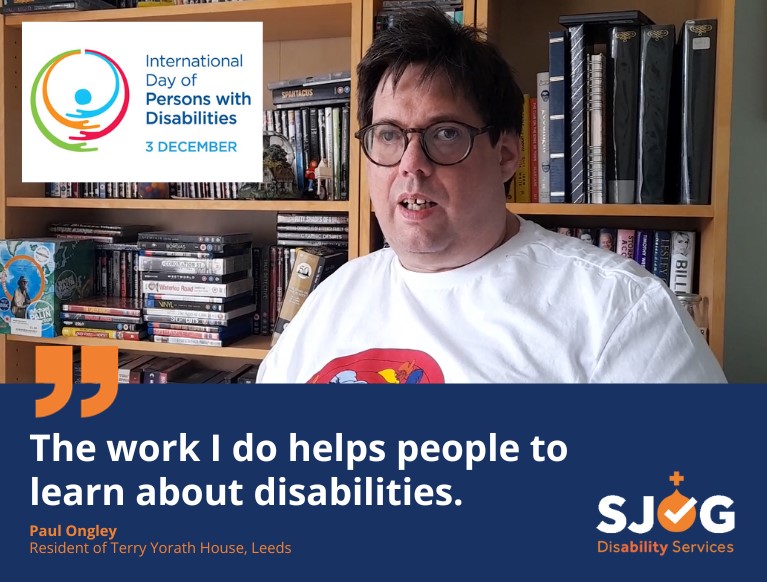
International Day of Persons with Disabilities is an annual event established by the United Nations (UN) to raise awareness about the challenges faced by people with disabilities and to promote their full and equal participation in all aspects of society. It serves as a poignant reminder of the global commitment to promoting people’s rights, dignity and well-being.
SJOG has a very long (over 140 years!) and successful history of working with people with disabilities; we work alongside the people we support, delivering individualised services that are defined by each person we work with. Being guests in people’s lives, we hear their voices and respect their decisions.
This year a significant piece of work has been completed with the people we support –people with lived experiences – in the development of the People’s Framework and roadmap, ‘making things happen together’ – which underpins our co-production policy and exactly how we work – together..
Paul who lives at Terry Yorath House in Leeds, is one of the team who worked on the Framework and has lots of expertise through lived experience. In addition to working with us, he helps to train the next generation of nurses and occupational therapists by sharing his experience of disability and mental health.
There are other areas Paul is addressing – follow us on Facebook to see a series of short videos that feature Paul on his journey: https://www.facebook.com/SJOGUK
December 2023
Great British Care Awards – SJOG Finalists and a Winner!


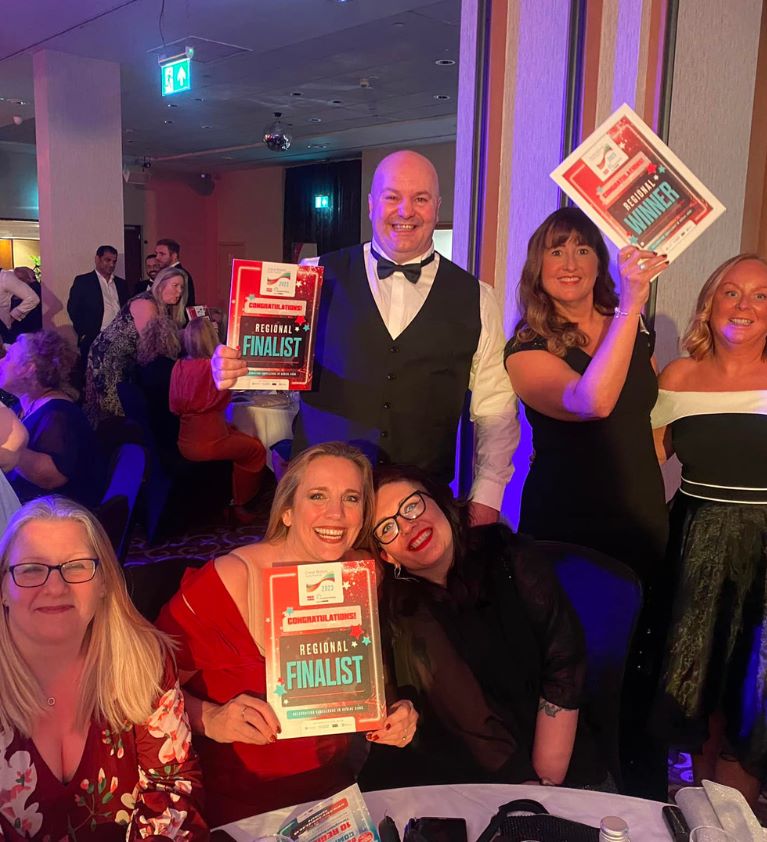
At the Great British Care Awards 2023, North East and Scotland Region, we had a winner alongside finalists in two categories. The awards ceremony took place on 9 November at the Grand Gosforth Hotel, Newcastle.
Our People Team were finalists in the Three ‘R’s award for the quality of the recruitment, retention and rewards in the charity, and Lee Scrimshaw was a finalist in the Care Home New Comer Award. Lee works at Sandown Road in Billingham and is making a great contribution there.
Lisa Alcorn, our Chief Operating Officer won the Workforce Development Award which acknowledges the importance of the role of workforce development and looks for a person who has shown incredible enthusiasm and determination in identifying training and development needs of care staff.
From one of the judges: “Lisa blew me away today with the passion for her workforce, for the things they do for their teams, and the funding they get for the amazing work they do. One of the things Lisa said today was ‘they care for people’, not older people, not younger people, just people.”
Well done everyone!
November 2023
Celebrating Living Wage Week
6 -12 November 2023
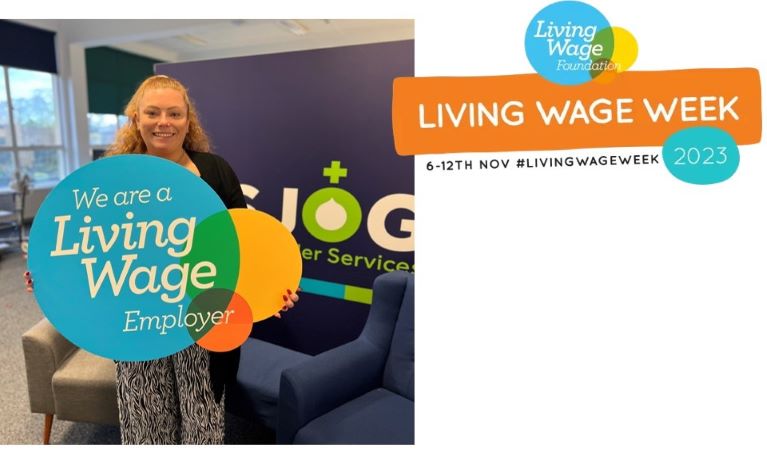
Living Wage Week is the annual celebration of the Living Wage movement and with energy and food costs still high, paying the real Living Wage has never been more important.
This year’s theme celebrates the movement of employers who are committed to the Living Wage and decent work to ensure staff always have decent work and can always live a dignified life.
SJOG was accredited as a Living Wage Employer in February 2021, making the commitment to pay its employees more than the minimum wage. The real Living Wage is the only rate calculated according to the costs of living. It provides a voluntary benchmark for employers that wish to ensure their staff earn a wage they can live on, not just the government minimum.
The new 2023-24 real Living Wage rates were announced on the 24th October as £12 across the UK, £13.15 in London. Find out more here.
SJOG colleagues are fantastic and it’s great to make the commitment to paying our colleagues a Real Living Wage.
For more info, please click here: https://www.livingwage.org.uk/living-wage-week
November 2023
Anti-Slavery Day - 18 October 2023
Dedicated to raising awareness about modern slavery, human trafficking, and forced labour
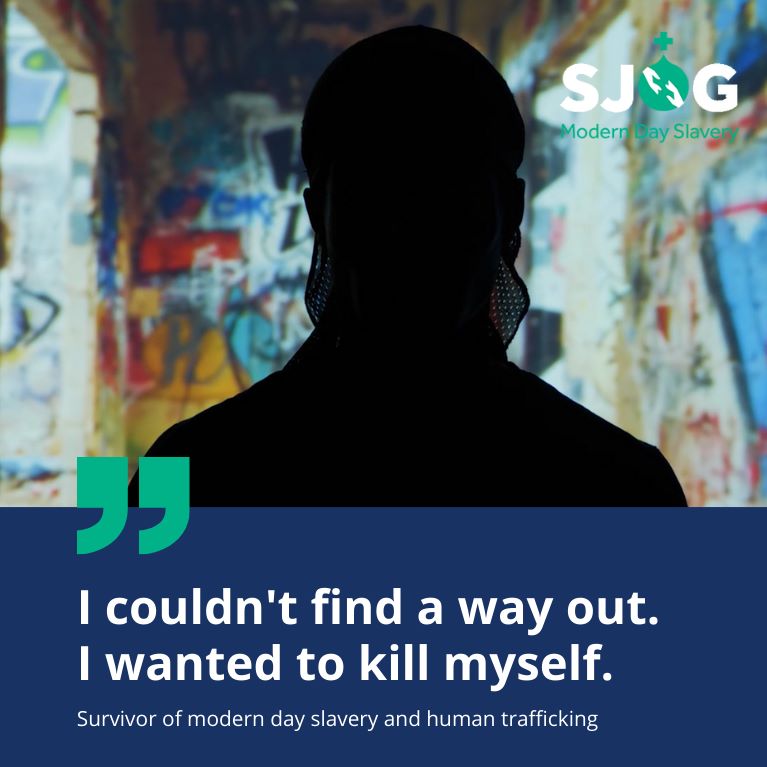
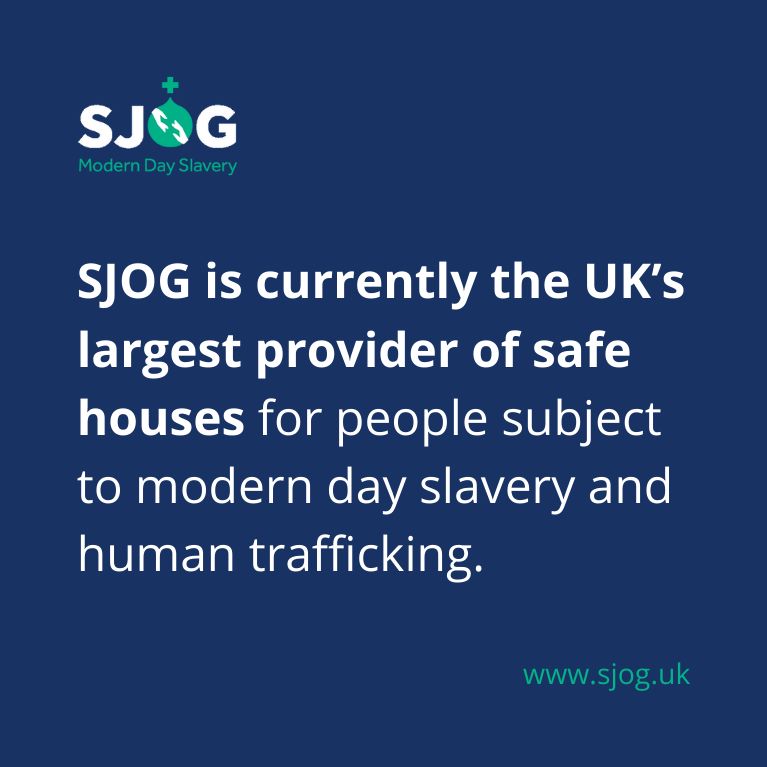
Anti-Slavery Day takes place every year on 18 October. Anti-Slavery Day is part of Anti-Slavery week, a UK and European awareness week, which this year runs from 16 – 22 October 2023.
An Act of Parliament of the UK made in 2010 introduced a national day to raise awareness of the need to eradicate all forms of slavery, human trafficking and exploitation.
Anti-Slavery Day provides an opportunity for individuals, charities, churches, schools, communities and businesses to raise awareness of the dangers and consequences of modern slavery, human trafficking and exploitation.
What is human trafficking?
Human trafficking is the unlawful act of transporting or coercing people through the use of violence or deception in order to benefit from their work or service, typically in the form of forced labour or sexual exploitation for financial or personal gain.
People can be trafficked and exploited in many forms, including being forced into sexual exploitation, labour, begging, crime (such as growing cannabis or dealing drugs), domestic servitude, marriage or organ removal.
It is estimated that there are now 50 million people living in conditions of modern slavery, an increase on 10 million since the Global Slavery Index was published in 2018.
What are we doing at SJOG?
SJOG is currently the UK’s largest provider of safe houses for people subject to modern day slavery and trafficking, and provides a voice for this marginalised and vulnerable group, and specialist support to help people recover from their experiences, to rehabilitate and rebuild their lives.
Raising awareness of modern slavery and human trafficking and supporting survivors of this abhorrent crime is a priority for SJOG.
Marking the week in collaboration with The Salvation Army
A football tournament is taking place to commemorate the week by celebrating and showcasing the skills of survivors through sports and further creating awareness of trafficking and modern slavery. It’s an opportunity for survivors to engage and participate in activities outside of their services and which help to build confidence and key skills necessary for recovery.
Good luck to the SJOG team - a lot of training has been put in and kits are ready for the occasion!
To watch a film commissioned by SJOG that tells the story of people who have been subjected to this crime, and for further information visit: https://sjog1810.uk/
18 October 2023
Walking in the footsteps of Saint John of God
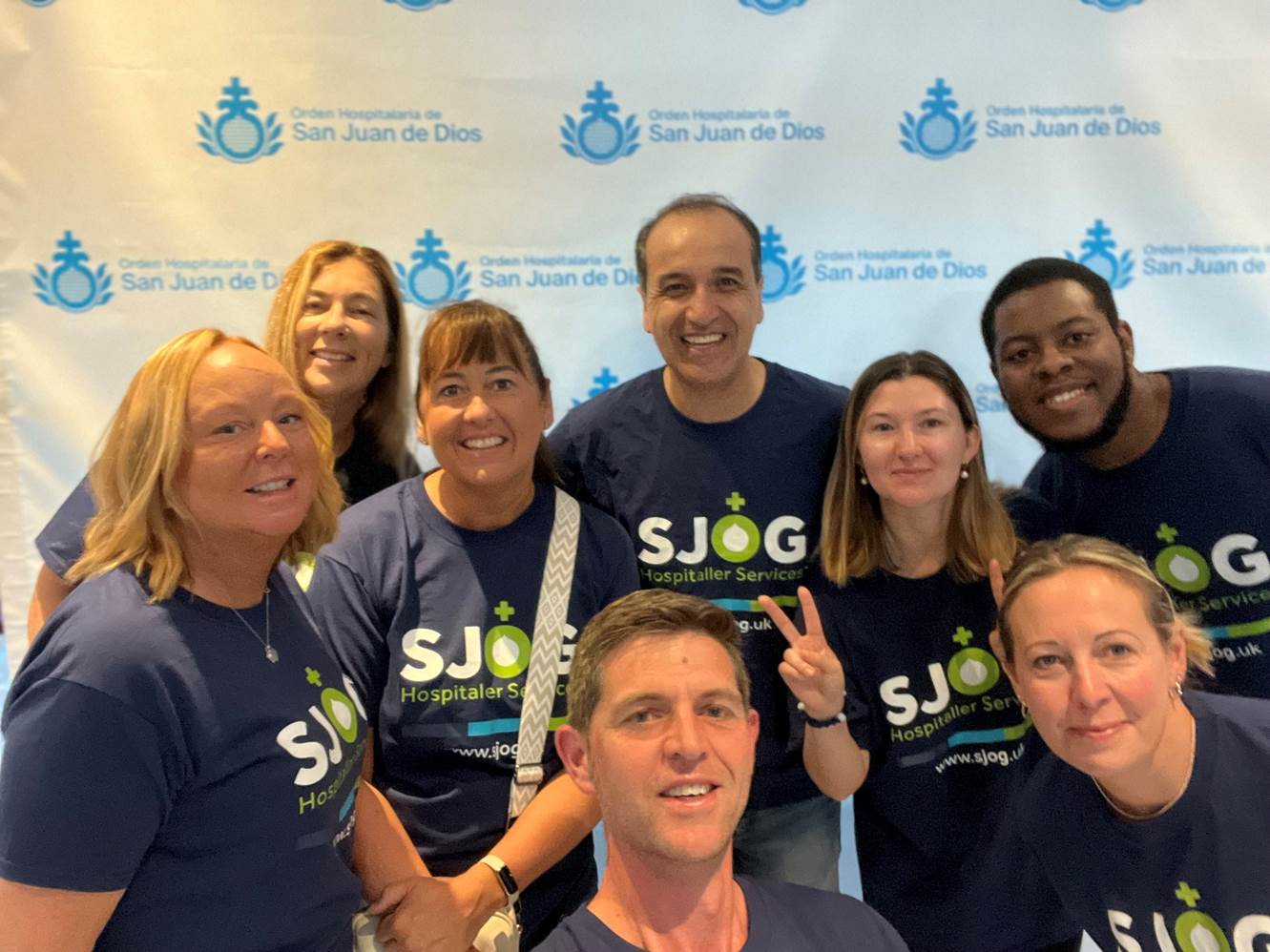
A trip to Granada organised by SJOG UK enabled some of our colleagues to walk in the footsteps of John of God, to see the places he lived, the cell where he was imprisoned, and to get a sense of the man and the times that he lived in.
Our colleague Mariia summed up the visit beautifully:
“It was a life-changing trip to Granada, the special place of Saint John of God. Through the lens of this brave and generous individual, we gained a deep understanding of what true hospitality means. It made me reflect further on the purpose of my work. In my particular context, I see hospitality as a relay race.
Just over a year ago, I was warmly welcomed in the UK when I needed a safe place, and now at SJOG, I have had the privilege to extend that hospitality by helping Ukrainians navigate the challenges of life during these turbulent times. After the current project finishes, I would love to continue following in the footsteps of João Duarte Cidade with his noble dedication of helping others.
One of the highlights of this trip was the opportunity to connect with Brothers from the Order in different countries. It was inspiring to see how our missions align, all united by the exemplifying personality of Saint John of God, and how we can draw inspiration from each other's efforts to aid those in need.
Lastly, it was inspiring and funny to catch up with colleagues from different departments in an informal atmosphere. It was a reminder of what an incredible team we have, and I am proud to be a part of it.”
Special thanks has to go to Brother Alex who did most of the organising and led our colleagues on the tour.
September 2023
Dalby View celebrates its 30th anniversary..
.. with a party!

The Dalby View team certainly know how to throw a good party and this occasion was no different. A 90s theme gave rise to some throwback outfits and interesting shirts!
The occasion marked 30 years since Dalby opened its doors to eight young people with physical disabilities after a major fundraising appeal to fund the new purpose-built bungalows that had been built in consultation with the people for whom this would become their home.
Damian and Neville were two of the eight people to move in back in 1993 and still live at Dalby today. Emma, who was too young at the time, came a little later. Her stay was originally to be just a night as a ‘taster’ but then she never left!
The photos and an anniversary video tell a better story of the day – see them here: https://sjog.dphoto.com/
September 2023
Great British Care Awards – 3 finalists for SJOG!
A celebration of excellence across the care sector

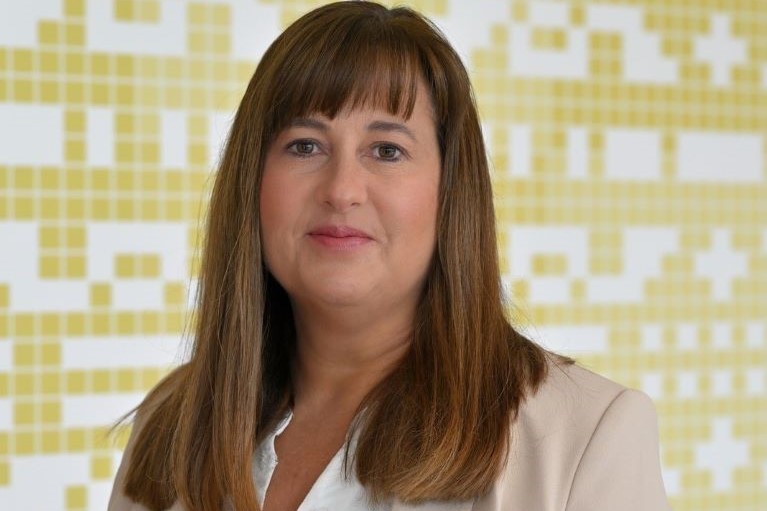
The Great British Care Awards pay tribute to those individuals who have demonstrated outstanding excellence within their field of work, with twenty-one award categories representing all areas of the social care sector.
We’re extremely pleased that we have finalists in three of the award categories in the North East/ Scotland Region of the Awards.
Lisa Alcorn, SJOG’s Chief Operating Officer is a finalist in two categories:
Workforce Development – this award acknowledges the importance of the role of workforce development within the care service and looks for a person who has shown incredible enthusiasm and determination in identifying training and development needs of care staff, establishing rolling training programmes, searching for and gaining funding and proving their ability to enthuse and energise staff to attend and request training.
And the second one - Outstanding Contribution to Social Care. This special award will be presented to the individual whom the judges believe has made a long-term outstanding contribution to social care.
The three ‘R’s – our People Team are finalists in this category which recognises organisations / teams / individuals who have adopted an innovative approach to Recruitment, Retention and Recognition. The judges are looking for examples of strategies that recruit on values; promote diversity and inclusion; recognise excellence in the workplace, and retain a highly motivated and skilled workforce.
Winners are announced on the awards evening on Thursday 9th November held in Newcastle.
Good luck SJOG finalists!
! STOP PRESS ! – Lonnie Migochi has been shortlisted for the Care Home Registered Manager Award in the South East Region.
This award recognises managers who have demonstrated a high level of expertise, who show vision in developing person-centred care and supporting staff to meet the ever-changing needs of their residents.
Lonnie’s interview takes place on 12 October – good luck Lonnie!
September 2023
A step forward in renewable energy for SJOG


We have successfully installed our very first solar panels and battery at Dalby View in Coulby Newham, our registered care serivice, which is home to eight people
This milestone marks a significant step towards sustainable, eco-friendly energy solutions within SJOG's services.
This solar battery system will provide up to 25% of bungalow one's electrical power and more! Once the batteries are full, the excess energy is diverted to heat the hot water system and, finally, sold back into the National Grid for other properties to use.
SJOG's Property Services Team is constantly looking into systems that will help us to decarbonise the properties we use and benefit our services by helping offset the rising cost of utility bills.
Deputy Property Services Manager, Simon said, “The solar/battery system in bungalow one, Dalby View, was activated and it started producing electricity immediately. We have been monitoring its productivity through an app, and at times, the solar panels have been producing more electricity than the bungalow is using. When this happens, a portion of the power is fed into the batteries so that it can be released when the power demand increases.”
Throughout the year, we hope to achieve at least a 25% reduction in grid power usage, which will help lower utility bills and the carbon footprint of our services.
SJOG aspires to be carbon neutral, and we are currently evaluating our other properties to see where we can introduce more solar power.
August 2023
Doing Good Deed Completed
Camouflage nets on their way to Ukraine

Back in March, the Leeds Ukrainian Refugee Forum approached SJOG’s Terry Yorath House in Leeds to rent their community room.
The group were looking for a large space to make camouflage nets to send back to Ukraine, as they had been asked to leave their previous location.
Service manager Anthony said, "As part of SJOG's Do Good Day, we decided to support them and provide a safe space free of charge where they could continue their work. The group loved the space and were grateful that they could continue to support people back home during this difficult time."
Last week, the group left Terry Yorath House after successfully completing many camouflage nets, all of which have now been sent to Ukraine.
Well done to this amazing group for their months of relentless hard work.
It was great to meet you all; we are happy we could help.
For more information about the forum: https://www.leedsrefugeeforum.org.uk/
August 2023
SJOG Shortlisted as Charity of the Year

For the second time in four years, SJOG has been shortlisted for Charity of the Year in the Charity Times Awards 2023.
Other charities included in the shortlist, in the group for those with an income of more than £10million, include Blood Cancer UK and Great Ormond Street Hospital.
The awards, in their 24th year, recognise, celebrate and promote best practice with SJOG being recognised for the benefit it offers in the communities in which we work and to the charity sector as a whole.
We’ve had a great year!
Thanks to our clarity of purpose and the hard work of our colleagues in the past year, we have:
- Added 4 new services, and are now in 52 communities
- Grown the number of people supported by 36%
- Created 50 new jobs
- Increased support to people who have been trafficked or subject to modern day slavery, in 2022 it was 950, today we support 1,295 people every month and have become the biggest provider of safe houses in the UK
- Improved quality ratings from our regulator to 100% ‘Good’ or ‘Outstanding’
Winners will be announced on 20 September at an awards gala dinner, taking place at the London Marriott Hotel, Grosvenor Square.
July 2023
SJOG wins at the National Learning Disabilities & Autism Awards



With two winning awards and a ‘highly commended’ award, SJOG had a very successful evening at The National Learning Disabilities & Autism Awards ceremony held at Birmingham ICC on Friday 30 June.
The awards represent all areas of care and support for people with learning disabilities and autism within the care sector throughout the UK and celebrate excellence of individuals who go above and beyond in the sector.
Woodhall Community Centre, Welwyn Garden City: People Award Winner
This award was to recognise individuals or organisations who offer exceptional encouragement and support by individuals with learning disabilities and or autism in providing support services and or person development and inclusion. From the judges: "The project is using a co-productive model in a really positive manner and ensuring service users are all engaged in the decision making. It shows the project is not just about being in the community but is a central part of the community."
The Minims, Hatfield: National Older People with Learning Disabilities Award Winner
Celebrating excellence in supporting older people with a learning disability or autism, judges were looking for evidence from providers and individuals who are positive about older people, provide excellent person centred support, promoting independence, dignity and respect. The judges said, "The Minims Team were an absolute pleasure to interview. Person-centred care and co-production are at the heart of everything that they do; an approach that certainly generates extremely positive outcomes. Many congratulations to this team!"
Lisa Alcorn, Chief Operating Officer: Employer Award – Highly Commended
This award was to acknowledge and celebrate an exceptional employer who is committed to their employees. From the judges: "Innovation, passion and vision: Lisa brings all of this to the organisation. The inclusion of all and importance of everyone’s opinion form the core values of SJOG, with various initiatives including Magic Space and the Loved Programme. Lisa is a true believer in that 'understanding what you do today, will effect a person tomorrow'.”
“The whole evening was a truly memorable one, the food and atmosphere were great and by the end of the evening, there is no doubt that everyone will remember the name SJOG!” Miggy Yangchen, Service Manager – The Mimins
Congratulations to all!
July 2023
Learning Disability Week
19th – 25th June 2023 - ‘Bust a Myth’
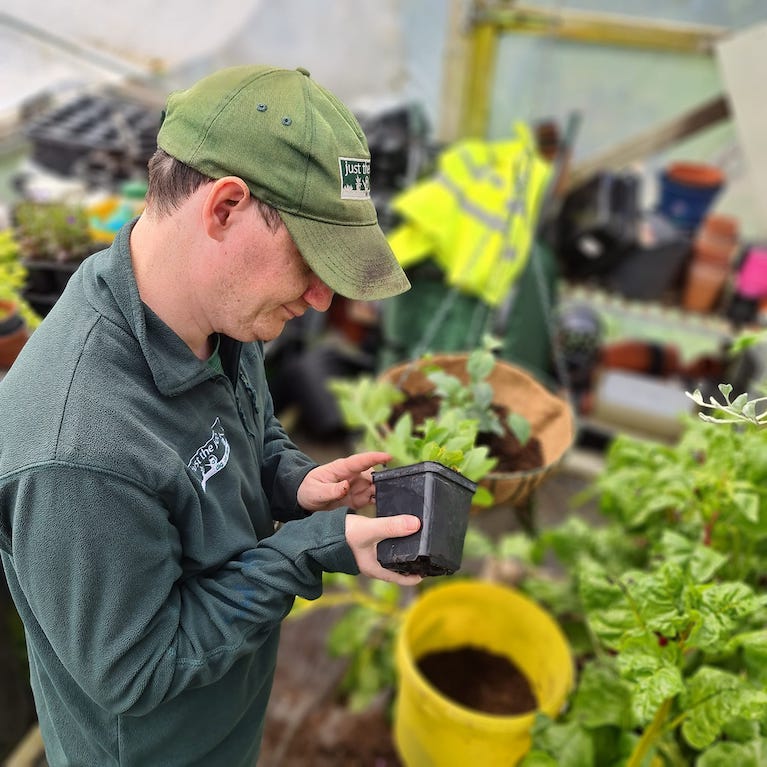
Learning Disability Week is celebrated annually in the third week of June.
The week aims to educate, spread awareness, and increase understanding of learning disabilities. This year ‘Bust a Myth’ aims to dispel misconceptions about what people with a learning disability can and cannot do and shine a light on the stigma many people face every day.
People with learning disabilities are twice as likely to experience low self-esteem and self-confidence, social exclusion, and bullying that others don’t face, leading to mental health issues. Being diagnosed with a learning disability does not mean a person is not intelligent. It means they need extra support and specialised care to overcome the challenges they face in a particular subject area and learn in their unique way.
Follow us this week on our social media pages to see how people are so much more than a disability, and celebrate their achievements, talents and issues that matter most.
Refugee Week 19th - 25th June 2023

Refugee Week serves to celebrate the contribution, creativity and resilience of refugees and people seeking sanctuary, with a vision for people to be able to live safely within inclusive and resilient communities where they can make a valuable contribution.
This year marks the 25th anniversary of Refugee Week; the theme is compassion – coincidentally one of SJOG’s three values.
Compassion: the support that we offer is active kindness, caring and being willing to help.
SJOG Homes for Ukraine
As part of Refugee Week 2023, the SJOG Homes for Ukraine Matching Scheme aims to discuss some of risks identified in the UK.
Since Russia’s invasion of Ukraine in February 2022, the war sparked the fastest-growing refugee situation in the world. At present, over 8.5 million refugees from Ukraine have been recorded across Europe, while is estimated that the number will increase by the end of 2023 (UNHCR, June, 2023).
There are understandable concerns that this will lead to increasing trafficking and exploitation1. Particularly vulnerable being women, unaccompanied or separated minors, older persons, belonging to a minority ethnicity group (e.g., Ukraine has a large Roma population), having a disability, being LGBTQ+, and lacking access to safe routes and settlement (something particularly affecting non-Ukrainians fleeing the war).
To read the full paper go to: https://sjog.uk/publications-research.php
Volunteers Week 1 - 7 June 2023



Volunteers' Week is an annual celebration of the contribution millions of people make across the UK through volunteering in their communities.
At SJOG we applaud all those who volunteer in our services. Their contributions are invaluable.
Olallo House in London has benefitted from a team of employees from Network Rail who volunteer their time on a regular basis to paint and decorate to improve the surroundings for the people we support there. This week saw them painting the reception area of Olallo.
“The team of six was led by Donna and they all seemed to have had a lot of fun. It was very well organised and the team just got on with the task. They were very friendly and finished painting to a good standard. During lunch break, I talked a little about Olallo and what we do here. Joan [Olallo’s chef] made nice soup and even better carrot juice!
All in all - very good and productive day!” Raimonda Kairyte Administrator – Olallo House
The next projects will include painting the dining room and bedrooms.
Thank you to all our volunteers at SJOG!
June 2023
Volunteers Week 1 - 7 June 2023


Hear from Justina who volunteers at Woodhall Community Centre in Welwyn Garden City.
Woodhall has been a resource for the local community for over 80 years, since 1938. SJOG has been running the centre for almost 20 of those years and our aim is to provide a welcoming environment where community groups can meet and where we can provide opportunities for people with additional support needs.
Justina talks about her experience as a volunteer at SJOG:
Q. How long have you been volunteering at SJOG?
A. I’ve been volunteering for the most exciting seven months!
Q. Why did you want to volunteer?
A. I wanted to gain experience in a social worker position.
Q. What does a typical day as a volunteer look like?
A. My day is full of energy! I am fully blended into the team, it’s full of smiles, happiness and excitement! It’s amazing to be around professional support workers and all the staff. They help advise and mentor me to be the best I can be and as professional as possible.
Q. What do you like the most about volunteering?
A. I love the team, the atmosphere, the people all around me, the challenges, and the daily routine because it’s never the same! Every day after I volunteer at SJOG I come back home with a smile and full of good emotions. Every day I learn more and more!
Q. What would you say to anyone thinking about volunteering at SJOG?
A. I would recommend volunteering to anyone who needs to get some experience. The team is professional and gives all the advice you need. The people you meet here are the most incredible, all so warm with their own personalities and characters. I am so happy to be part of the team and always feel so welcome here.
To explore volunteering opportunities at SJOG, click here https://sjog.uk/volunteering.php
#VolunteersWeek #SJOG #Volunteer
June 2023
Ride London 2023
S-coggers cycle to raise for SJOG’s Olallo House



Two more colleagues have this month challenged themselves to raise money for SJOG’s services.
Jamie and Basak took part in Ride London – a 100-mile cycle around the capital over the bank holiday weekend – Sunday 28 May.
Their fundraising will go to Olallo House in London which offers support for people who experience street homelessness, some of whom may also be receiving treatment for infectious diseases such as TB. Working in partnership with London hospitals we enable people to complete their treatment in a safe and supportive environment. At the same time we provide holistic support to allow them to move on to stable accommodation and rebuild their lives.
Already they have raised £600 and this figure is still growing. If you’d like to support the people at Olallo, please donate via our official donation page on Enthuse: https://2023ridelondon.enthuse.com/saintjohnofgod/profile
May 2023
Mental Health Awareness Week 2023

15th to 21st May marks this year’s Mental Health Awareness Week which focusses on anxiety: to increase awareness and understanding of anxiety and how to help prevent it from becoming a problem.
This theme is particularly pertinent during the cost of living crisis we are all experiencing, with many people worrying about bills and the cost of food, on top of the usual daily stresses. This can make it hard to find the time to look after yourself, but it’s important to find time to protect your well-being and mental health.
Anxiety is a normal emotion but it can sometimes get out of control and become a mental health problem. Anxiety is one of the most common mental health problems we can face and around 25% of adults suffer to an extent that it stops them from doing things they want to some or all of the time (survey carried out by the Mental Health Foundation).
Ways to help: there are things that we can all do to protect our mental health and manage anxiety.
What works will be different from person to person. Things that might be helpful include being active, getting out in nature, practising breathing techniques, getting support to tackle money worries or eating well. Talking to a friend, or spending time with loved ones, is often a good first step.
There are a whole host of tips and techniques available on the MHF’s website:
And follow us this week on Facebook for a week of resources and further information: www.facebook.com/SJOGUK
#Tohelpmyanxiety
Great Birmingham Run 7th May 2023
SJOG colleagues run to raise funds for MDS services


Congratulations to SJOG colleagues Sirpreet and Kebere, who took part in the Great Birmingham Run on Sunday (7th May).
They both finished with a great time and have raised funds needed to help people we support through our modern day slavery and human trafficking support services.
SJOG's modern slavery services offer accommodation and outreach services to support people who experience trafficking or modern day slavery. Safe-houses provide a safe space and a supportive environment with specialist support to help individuals rehabilitate and recover. Every month we support 1000 people who have had these experiences.
SJOG National Lead for Homelessness & Modern Day Slavery, Sirpreet said, "Through the pain, the endurance and sheer will at times - it was an absolutely worthwhile experience and a proud moment to represent SJOG!"
If you’d like to support this cause, please donate via our official donation page on Enthuse.
Yorkshire Three Peaks Challenge
Raising money for the Magic Pod

SJOG colleagues, friends and family challenged themselves to a 12-hour trek over the three peaks in Yorkshire to raise money towards SJOG’s Magic Pod - creative sensory space for the people we support with autism, and those in the wider community of Teesside.
The pod will be located within the grounds of our autism service in Stockton-on-Tees and will support people who experience sensory processing difficulties by helping them understand sensory feedback effectively and in a safe environment.
It was tough going and the weather wasn’t brilliant, but never-the-less the hikers were driven by their ambition to raise money for this unique project. Well done all!
If you’d like to support this project, please donate via our Just Giving page: SJOG Magic Pod - JustGiving
April 2023
World Autism Acceptance Week – 27th March to 2nd April 2023

World Autism Acceptance Week, established by the National Autistic Society (NAS), aims to raise awareness of autism and the 700,000 autistic adults and children in the UK, both to educate those unaware of the condition, and to help make the world friendlier to those who are affected by it.
Autism is a lifelong disability which affects how people communicate and interact with the world.
I am beautiful, not broken.
Different, not less.
Challenged, not challenging.
Overwhelmed, not spoiled.
Autism is not a choice, however, acceptance is.
Magic Pod – bespoke sensory space for people with autism
During autism awareness week we’re excited to launch our fundraising campaign to raise funds for a Magic Pod - a bespoke sensory space for the people we support with autism.
We want to expand our ambitious use of technology to create sensory spaces for the people we support. Sensory environments have multiple benefits for people with autism – encouraging positive participation, reducing anxiety and reducing challenging behaviour.
It will be located within the grounds of our autism service in the North East. The space will be accessed by over 100 individuals in our surrounding services allowing us to widen our best practice approaches and enhance the quality of life of more people with sensory processing difficulties.
The fundraising campaign begins with a group of SJOG colleagues and friends walking the Yorkshire Three Peaks – 24 miles / 12-hour challenge. If you’d like to support the team and raise money towards our Magic Pod, please go to: https://www.justgiving.com/campaign/sjog3peaks
Follow us this week on Facebook for a week of autism-related posts: www.facebook.com/SJOGUK
March 2023
World TB Day - 24 March 2023: Yes! We can end TB!

24 March is World Tuberculosis (TB) Day – marking the date in 1882 when Dr Robert Koch announced that he had discovered the bacterium that causes TB, which opened the way towards diagnosing and curing this disease.
The theme of World TB Day 2023 – Yes! We can end TB! – aims to inspire hope and encourage high-level leadership, increased investments, faster uptake of new WHO recommendations, adoption of innovations, accelerated action and multi-sectoral collaboration to combat the TB epidemic. WHO [World Health Organisation]
Rates of TB are highest among people with social risk factors including homelessness, and especially among rough sleepers who are more likely to be infectious and less likely to complete TB treatment. (Standard TB treatment lasts a minimum of 6 months and for multi-drug resistant TB, treatment takes a minimum of 2 years.)
London remains the area of highest TB incidence in England, accounting for 35% of all people with TB (in 2020) and over double the national rate, however case numbers are thankfully declining.
Olallo House, London
It is almost 11 years since we welcomed the first guest with TB at Olallo House and became a small but crucial part of the support structure that contributes in the fight to eliminate TB. Providing specialist medical, social and psychological support enables homeless patients to complete their full course of TB treatment and address other issues that have contributed to their homelessness. We work in partnership with a number of organisations to provide a full package of care and support. One of these partners is Find and Treat:
“Olallo House has consistently provided the best possible care and continued support for TB patients who have nowhere else to turn. The staff at Olallo House provide unrivalled pastoral care for those TB patients who cannot receive help from the state and have limited access to social networks.
When my TB patients secure accommodation at Olallo House, I know they will be receiving a gold-standard level of support throughout the trials and tribulations of their treatment. Their dedicated and multi-faceted staff team present a multi-dimensional approach to TB care which transcends the mere 'meds and meals' model and considers integration, opportunity and hope for patients once they have successfully completed treatment.” Philip Windish, TB Outreach Worker Find & Treat
Please support Olallo's work:
As we mark World TB day and celebrate our work at Olallo House supporting some of the most vulnerable TB patients through their treatment and with the other complexities of their lives, we continue to seek funding to complement their TB treatment package. Please donate and help us to help people rebuild their lives: https://www.justgiving.com/campaign/SJOGOlallo
March 2023
Do Good Day
8th March 2023



On 8th March, the feast day of our founder, Saint John of God, SJOG colleagues and people we support in our services throughout the country celebrated the day by ‘doing good’ with a wide range of activities to benefit the communities where we work and live.
Activities included litter picking, donating to food banks, sponsored walks and sponsored silences. Click here to see more of the activities that marked the day:
https://sjog.uk/feature-story-15.php
“Do good for yourself by doing good for others.” Saint John of God
#GoodWork
March 2023
3rd Sector Care Awards Finalist:
Woodhall Community Centre

Last week Woodhall Community Centre surpassed national competition to be recognised as a certified finalist in the Markel 3rd Sector Care Awards.
The Markel Awards celebrate care services that go above and beyond to provide outstanding services. SJOG’s Woodhall Community centre in Welwyn Garden City was one of the three finalists in the country to be recognised for their services to the community and to the lives of people with disabilities.
The awards were held in Birmingham on Friday 3 March. Mo Huzair, Service Manager at Woodhall, said, “It was an absolute honour to be nominated and a great surprise to be a finalist amongst fierce and deserving providers. I was proud to have our team’s co-production, people-centred practices highlighted, as well as the way we reach out to the community to help provide meaningful and targeted services. It was an inspiring ceremony and we aim to be back next year holding the award.”
Photo: Ana Maria Ghita, Deputy Head of Operations – South and Mo Huzair, Service Manager - Woodhall
March 2023
Marking the anniversary of the invasion of Ukraine


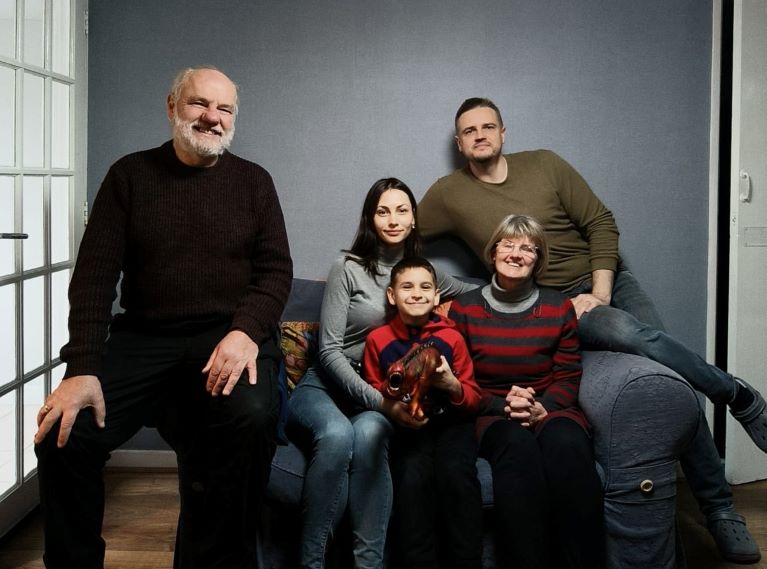
Friday 24 February marks the one year anniversary of the invasion of Ukraine.
The war has forced millions to flee their homes – an estimated 8 million have sought protection throughout Europe. The crisis continues for Ukrainian people as the war continues and civilian infrastructures, including energy and healthcare facilities, are targeted.
SJOG and Caritas Social Action Network (CSAN) are part of the community sponsorship movement in the UK offering a matching, training and support service to sponsors and guests under the Homes for Ukraine scheme.
To date, over 35 families have been matched with sponsors spanning as far north as Orkney to the opposite end of the country on the Isle of Wight, and across to Northern Ireland. The support includes online training and information resources for both hosts and guests, transfers from the Ukrainian border to the city nearest to their future home, and provides a welcome box upon arrival. The programme also ensures that support from the team and local communities is available to make the experience as seamless and fulfilling as possible on both sides.
Many hosts have found the experience positive, “My guest is a delight to share my home with. I am very happy to share the shopping and my kitchen with her and we take turns making evening meals for each other.”
Two of the sponsors, Patrick and Heather Cunningham from Newry in Northen Ireland welcomed Liliia into their home.
”SJOG looked after much of this [the matching of sponsor and guest]. Setting up video meetings and the means to communicate via WhatApps was very helpful and an ideal way to communicate initially. The settling in process was a huge learning curve. It wasn't long before we realised a lot of basic support was essential and we being local, could find it.
It has been a positive experience for us learning about a different culture and broadened our horizons meeting such good people.” Patrick and Heather
From Liliia: "We are very lucky with our sponsors. They have done a lot for us. They provided us with everything we needed for a comfortable stay in the house (food, fuel for heating the house, clothes, dishes, all household necessities, personal hygiene products). They found a school for our child in advance. We found all the necessary doctors. They have helped and are helping to solve all the issues that arise. We are very grateful to the organisation that helped us find our sponsors!"
The need for hosts and homes is as high as ever with over 500 applications received by the team. Hear from Yevheniia Siryk, Project Officer - Homes for Ukraine, SJOG - https://youtu.be/1CSsw-i_j6c
Photos: hosts and guests in Cumbria and Northern Ireland
February 2023
SJOG recognised for commitment to apprenticeships

As National Apprenticeship Week has come to an end, we’re delighted that SJOG has been recognised for its continuous commitment to new and existing staff development through apprenticeships.
National Apprenticeship Week is an opportunity to shine a light on the positive impact that apprenticeships make to individuals, employers and the wider economy.
““Apprenticeships help shape successful lives and build successful businesses across a large and diverse range of sector and Learning Curve Group are proud to have partnered with SJOG to help recruit, train and develop over 70 new and existing staff to date, with more than 16 having successfully completed their training in a wide range of health and social care subjects including, adult care, lead adult care business administration and lead practitioner in adult care.
The award is for employers who have put apprenticeships at the heart of their business and SJOG have certainly succeeded with that!” Tony Marshall, Learning Curve Group
February 2023
Rockliffe Court receives visit from the town mayor
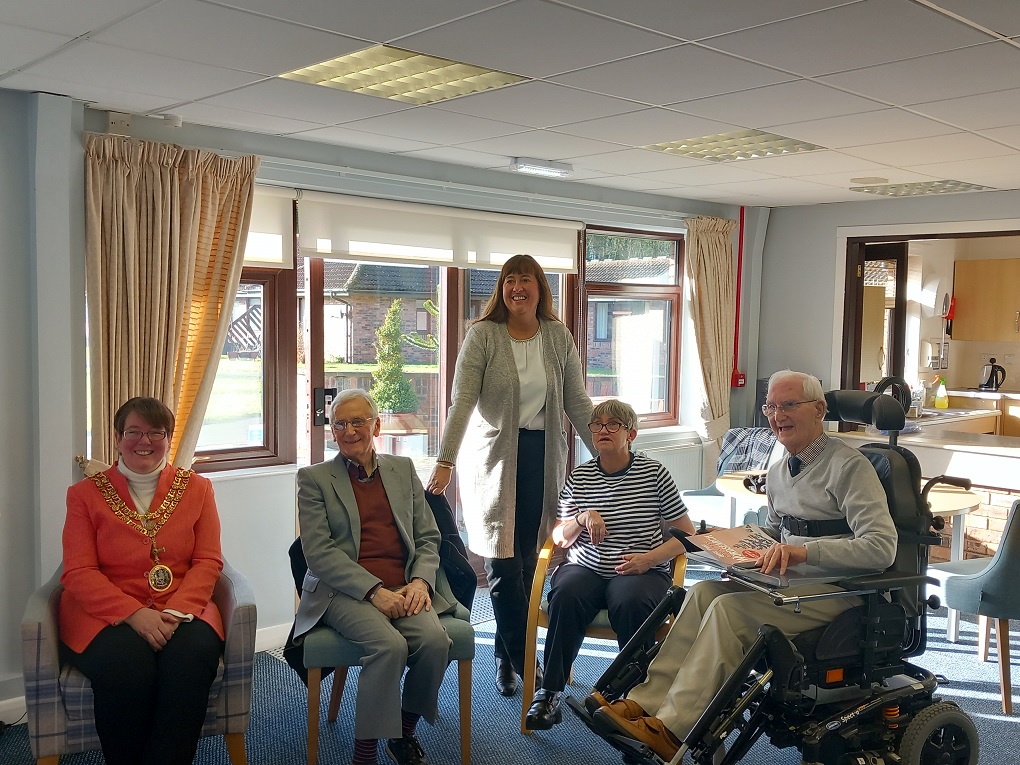
People we support and staff at Rockliffe Court near Darlington were delighted to receive a visit from the Mayor of Darlington, Anne-Marie Curry this week (30 January). The Mayor met with residents and staff, took a tour of the service and enjoyed of course, some good hospitality.
SJOG's Chief Operating Officer, Dr Lisa Alcorn discussed with her how SJOG is developing the service to support the Darlington community, and spoke about SJOG’s vision to be of more help to more people in the locality.
The Mayor stated via her Facebook page, “The gentleman in the wheelchair [Peter age 92] has lived at Rockliffe since it opened in the 1980s. The holistic approach to each person’s needs and care was easy to see. I got to see a flat and its adaptation that allow as much independence for the resident. They also have wonderful views from their windows over the garden and the fields beyond.”
“The Mayor was impressed with our vision and passion, and could see our values of hospitality, respect and compassion in action during her visit. She said she would be happy to return, especially as we had good cake!” Lisa Alcorn.
February 2023
Recruiting Sponsors - SJOG Homes for Ukraine

As Russia’s war in Ukraine continues, the need for hosts and homes is as high as ever.
The project team continue to work tirelessly to promote to project and publicise the need, and how SJOG can facilitate the matching between host and guest.
An event was held at Middlesbrough library last weekend (21 Jan) to encourage more sponsors to come forward. The event included presentations from people displaced by the war in Ukraine, and from hosts/sponsors who shared their experiences of the scheme. These gave the opportunity for potential sponsors to learn more about Ukrainian culture and ask any questions they might have about hosting.
The SJOG team provided information on the current situation in Ukraine and why there is still a pressing need for support from individuals in the UK.
“At the moment the situation with hosting generally is quite difficult around the country and all providers are finding the same thing. So, we have a lot of applicants from Ukraine and not enough applications from sponsors. So, it's really difficult because we can't match the need.” Zhenya, SJOG Homes for Ukraine Project Officer
ITV NewsTyne Tees attended the event as part of a feature which ran on its Saturday evening news programme on 21 January.
For more information about the SJOG Homes for Ukraine Scheme go to: www.sjog-homesforukraine.uk/
January 2023
National Human Trafficking Awareness Day 11 January 2023

National Human Trafficking Awareness Day on 11 January raises awareness of the unrelenting issue of human trafficking. Though the entire month of January has already been recognised as National Slavery and Human Trafficking Prevention Month, this day is specifically dedicated to awareness and education about human trafficking and crucially how to spot the signs of trafficking.
What is human trafficking?
Human trafficking is the unlawful act of transporting or coercing people through the use of violence or deception in order to benefit from their work or service, typically in the form of forced labour or sexual exploitation for financial or personal gain.
People can be trafficked and exploited in many forms, including being forced into sexual exploitation, labour, begging, crime (such as growing cannabis or dealing drugs), domestic servitude, marriage or organ removal.
What are we doing at SJOG?
SJOG is currently the UK’s largest provider of safe houses for people subject to modern day slavery and trafficking, and provides a voice for this marginalised and vulnerable group, and specialist support to help people recover from their experiences, to rehabilitate and rebuild their lives.
Raising awareness of modern slavery and human trafficking and supporting survivors of this abhorrent crime is a priority for SJOG.
As part of our continuing effort to raise awareness, a recently commissioned film tells the story of people who have been subjected to this crime. These are stories directly from people who we support. We are immensely grateful for their contribution.
To watch the film and for further information visit: https://sjog1810.uk/
January 2023
Prior General of the Order visits SJOG services
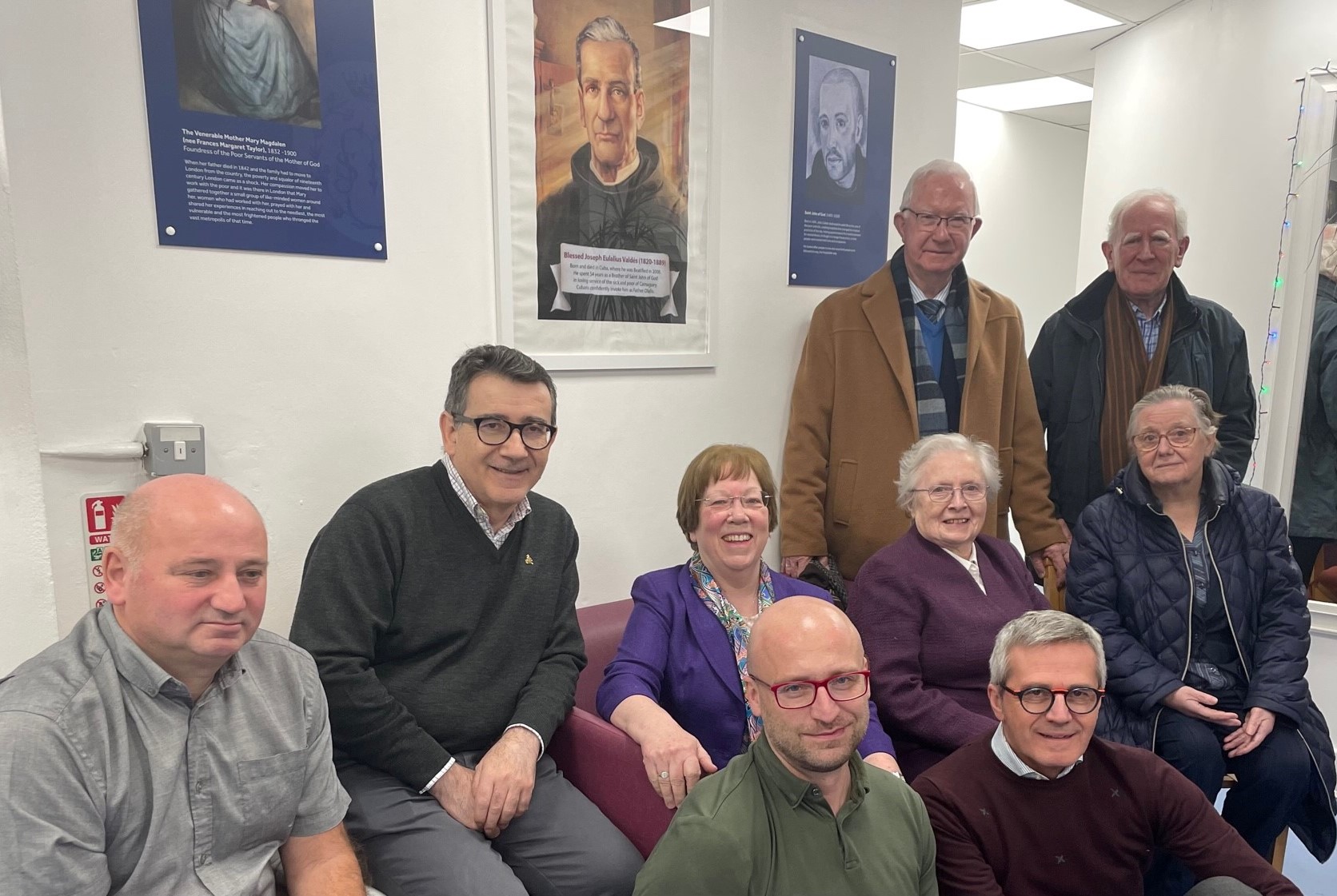

The Prior General of the Hospitaller Order of Saint John of God, Brother Jesús Etayo and Brother Joaquim Erra, Vicar General were in the UK this week (12-16 Dec) visiting a number of SJOG services. The Brothers, based in the General Curia in Rome were joined by the Provincial of the West European Province, Brother Donatus Forkan, based in Ireland.
Olallo House in London, hosted the visitors on Tuesday and were joined by the Sisters of the Poor Servants of the Mother of God. Pawel Zabielski, Service Manager, gave a presentation on Olallo’s work and the importance of the collaboration between SJOG, the Sisters and the Order in fulfilling the charity’s mission in their work with homeless people and victims of modern day slavery.
On Wednesday, the group visited Carmona House in Birmingham and visited Sirpreet Kaur, National Lead for Modern Day Slavery and Homelessness and her team, and on Thursday travelled to Wolverhampton to visit the Good Shepherd Project to see the team’s work supporting homeless people with a food service, day centre and housing service.
As reflected by Sipreet and echoed by all: "It was an absolute pleasure and honour, and the Brothers' visit was a 'breath of fresh air', rejuvenating our belief in 'doing good', and continuing to support the ones who need it through our services."
December 2022
Marking International Day of Persons with Disabilities
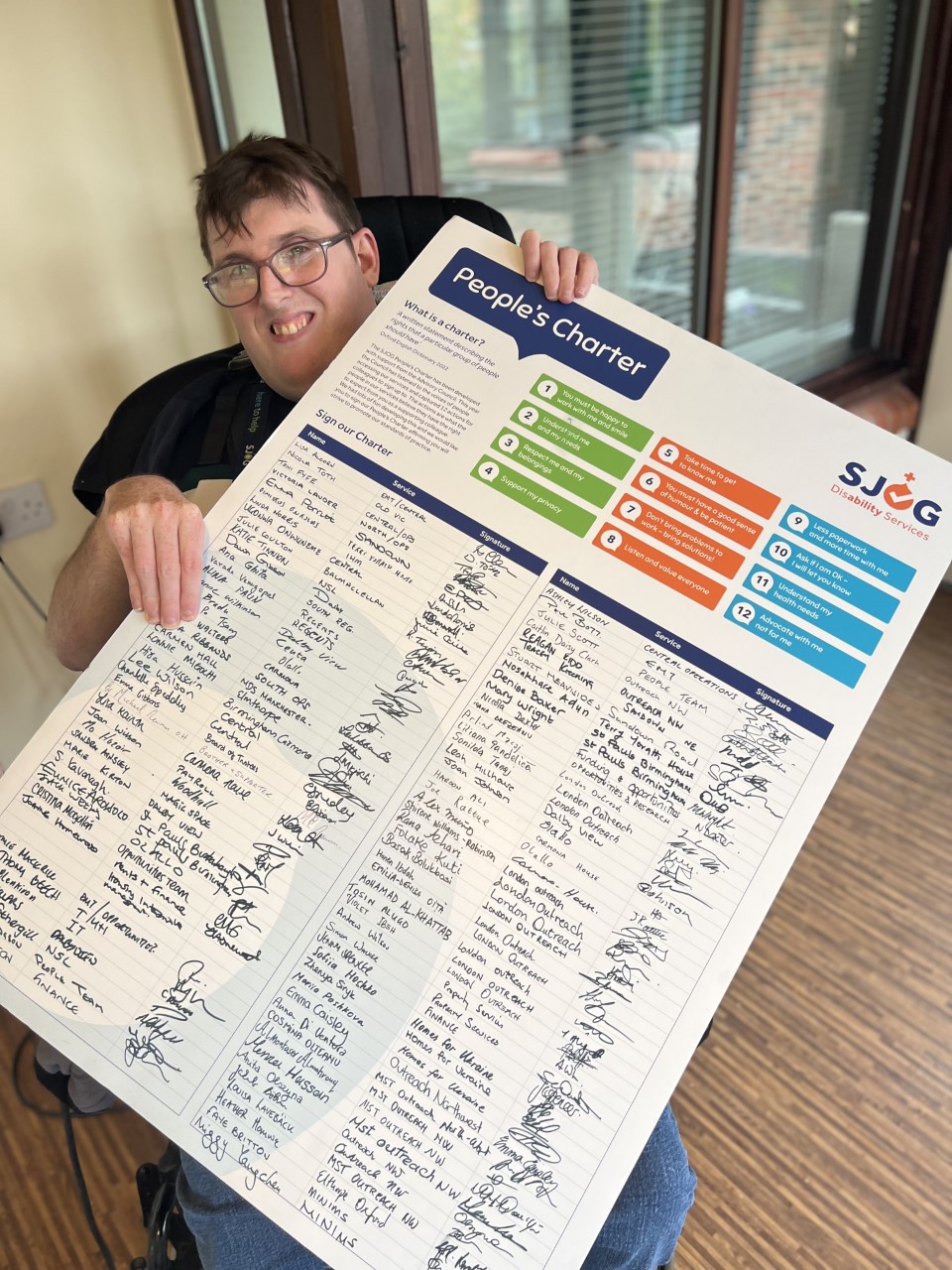
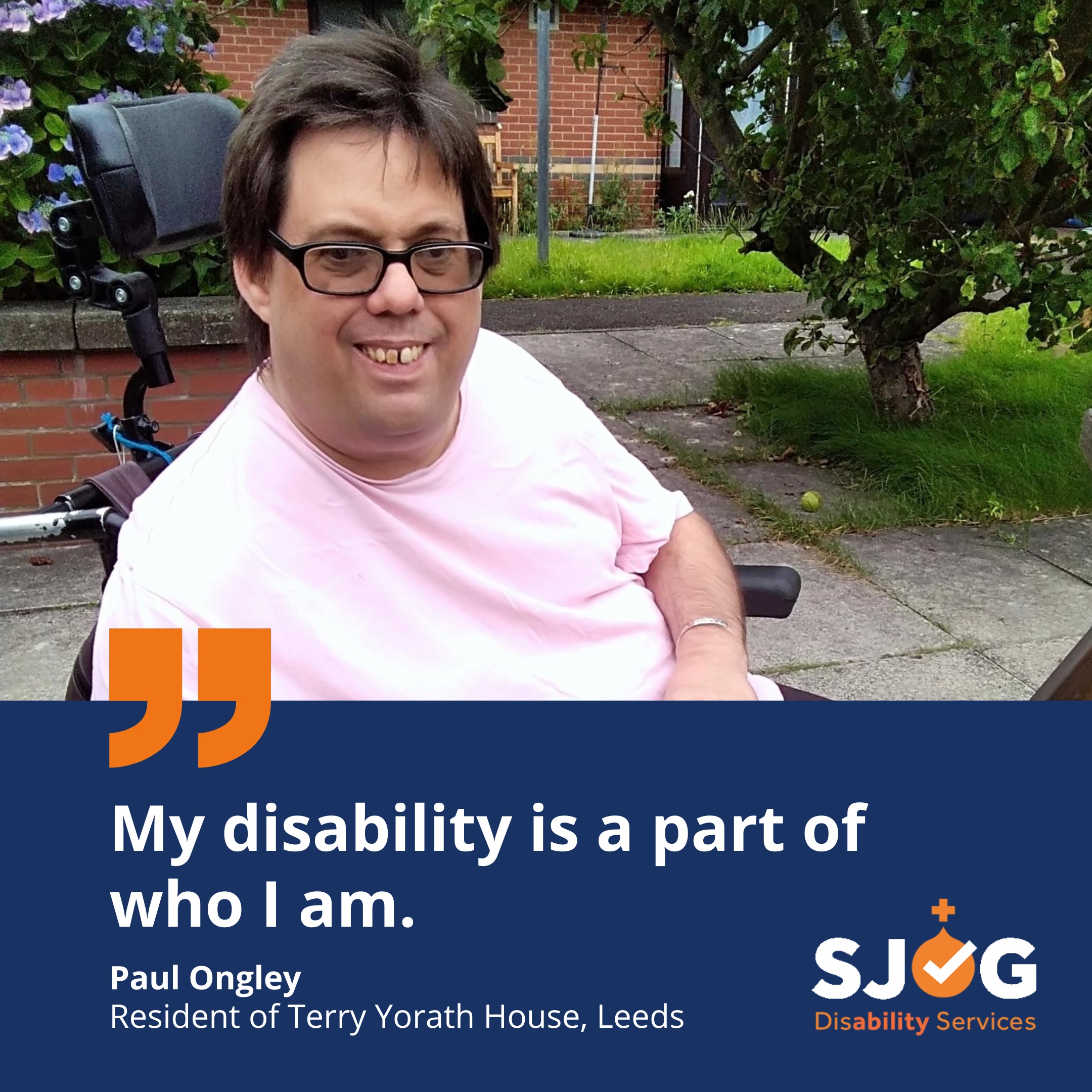

“Transformative solutions for inclusive development: the role of innovation in fuelling an accessible and equitable world“.
The annual observance of the International Day of Persons with Disabilities (IDPD) on 3 December aims to promote an understanding of disability issues and mobilise support for the dignity, rights and well-being of persons with disabilities.
SJOG has a long and successful history of working with people with disabilities; we work as an ally of the people that we exist to serve, delivering individualised services that are defined by each person we work with. Being guests in people’s lives, we hear their voices and respect their decisions.
To better hear people’s voices and inform decision-making right up to board level, an Advisory Council made up of people we support was established in 2020 in order to give people the forum to express their views and make change. The Council aims to be as inclusive as it can and continues to look at ways of involving those who are unable to communicate verbally.
The Council’s most recent initiative is the People’s Charter – a set of 12 standards developed by the people we support for the people who support them. This will be embedded into recruitment and induction processes and become part of quality auditing.
For more information about International Year of People with Disabilities and Rights for 2022 click here: https://sjog.uk/publications-research.php
To hear directly from the people we support : Jane talking about disability rights; Peter speaking about his work in the community; Craig telling us about the importance of the Advisory Council; and members of our Advisory Council on the People’s Charter - click here to go to our Facebook page: https://www.facebook.com/SJOGUK
December 2022
Celebrating Living Wage Week 14 – 20 November 2022
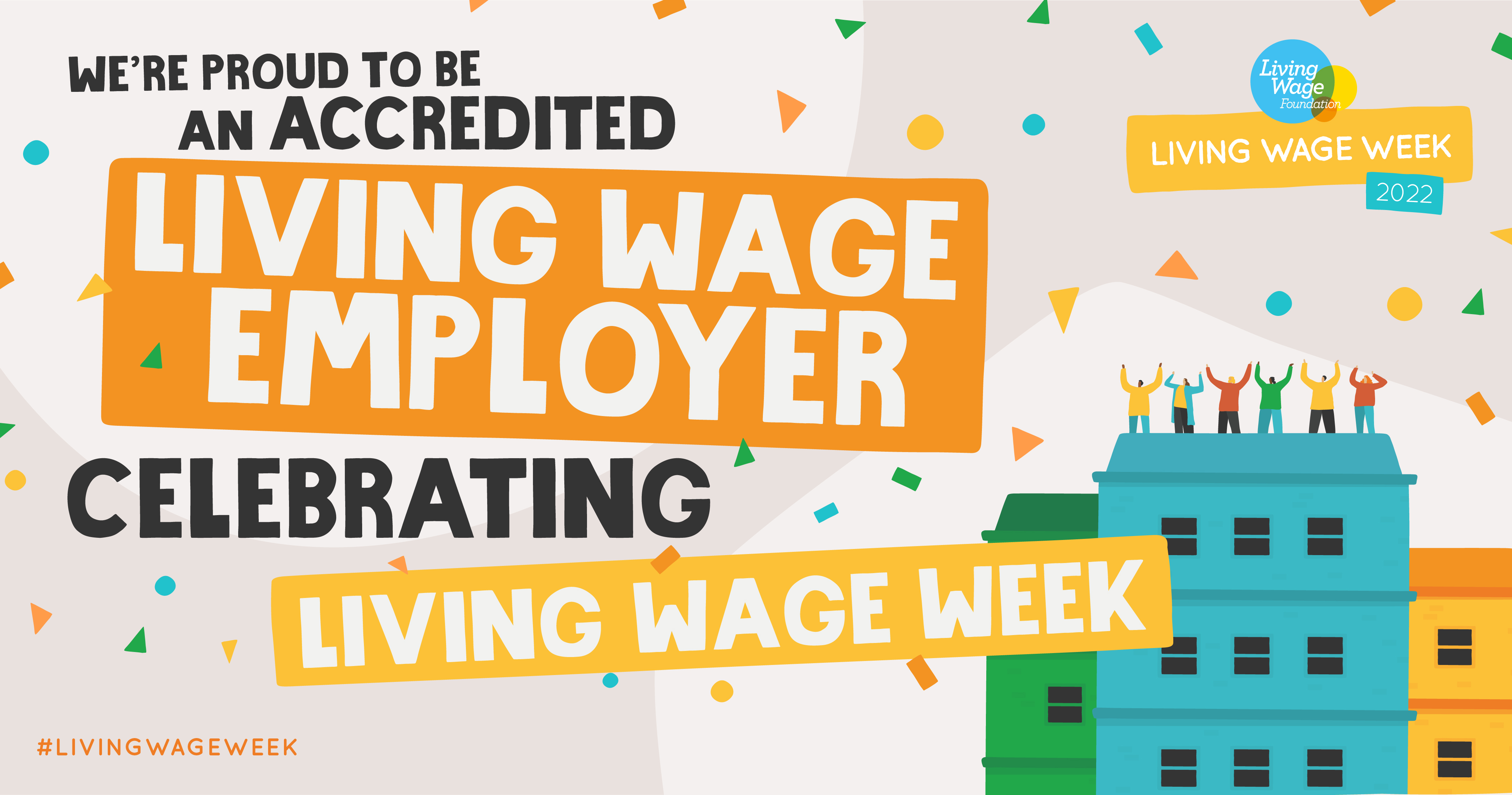
Living Wage Week is the annual celebration of the Living Wage movement and this year, with prices rising at their highest rate in decades, the real Living Wage is more important than ever.
SJOG was accredited as a Living Wage Employer in February 2021, making the commitment to pay its employees more than the minimum wage. The real Living Wage is the only rate calculated according to the costs of living. It provides a voluntary benchmark for employers that wish to ensure their staff earn a wage they can live on, not just the government minimum.
“Our colleagues are fantastic and it’s great to make the commitment to paying our colleagues a Real Living Wage. They deserve it.” Paul Bott, Chief Executive – SJOG
For more info, please click here: https://www.livingwage.org.uk/living-wage-week
World Day of the Poor - 13 November 2022
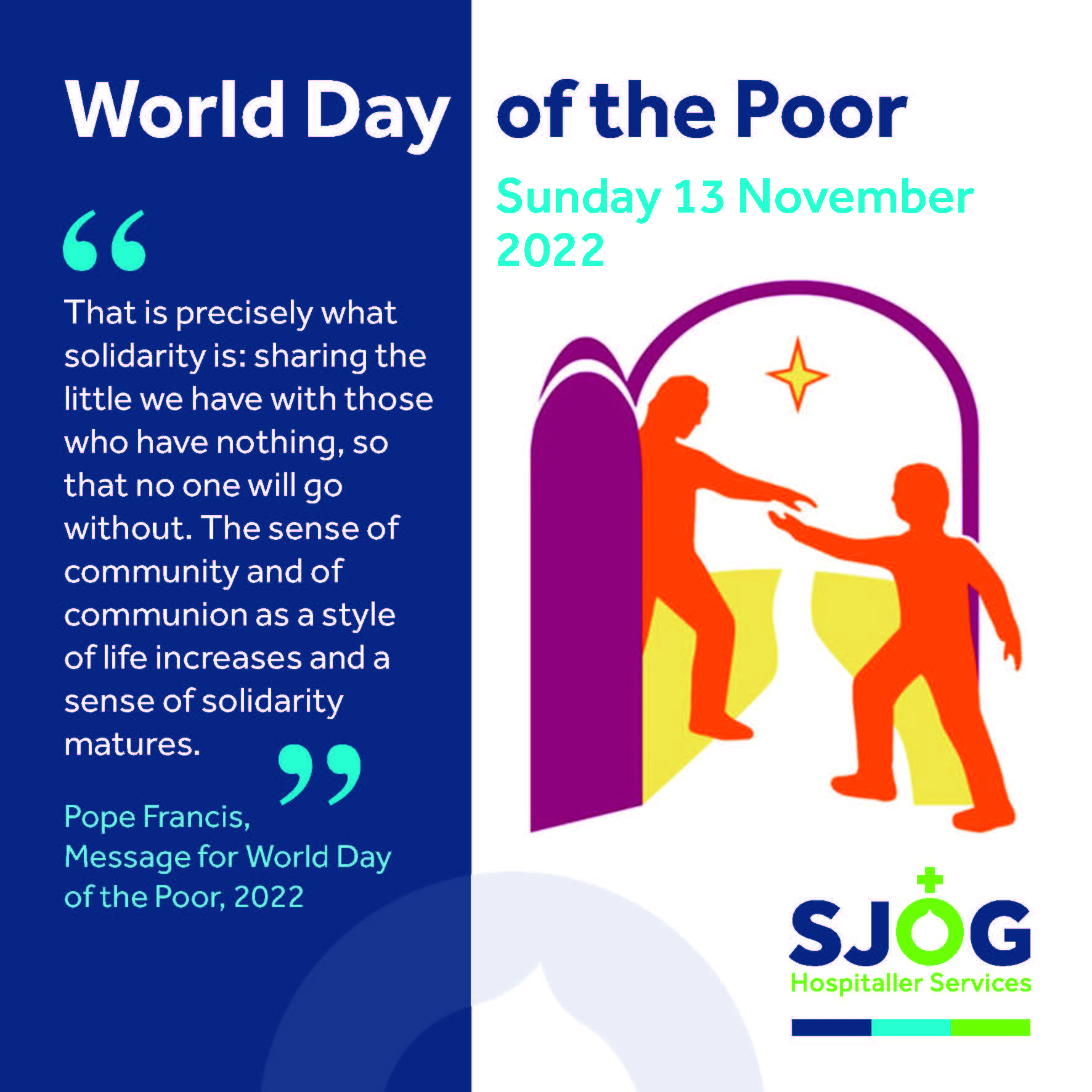
Today on Sunday 13 November we mark World Day of the Poor.
Pope Francis established the World Day of the Poor in 2016. In his message for the sixth World Day of the Poor, Pope Francis reminds us that from the very early days of the Church, attention to the needs of the poor was a feature of the community, and asks us to reflect on our style of life and on the many forms of poverty all around us.
“That is precisely what solidarity is: sharing the little we have with those who have nothing, so that no one will go without. The sense of community and of communion as a style of life increases and a sense of solidarity matures.” Pope Francis
November 2022
SJOG colleague wins at the Great British Care Awards 2022



Sirpreet Kaur, SJOG's National Lead for Homelessness and Modern Day Slavery, was nominated for the Frontline Leader Award by colleagues from Carmona House, Birmingham.
Seventeen people were shortlisted, with twelve final nominations for this award in the West Midlands Region with the winners announced at a ceremony held at the International Conference Centre in Birmingham on 5th November.
“I was nominated by the Birmingham team (unbeknown to me!), and subsequently invited for an interview by the panel, which covered my leadership vision, contribution, approach to the problems in the industry and sector, and futuristic strategy.
It was a great experience and a very proud moment to represent SJOG.”
From the panel: “A true asset to the care sector, Sirpreet excels as a frontline leader, living by the values she promotes to others. Many could learn from her example.”
Well done Sirpreet!
Photos show Sirpreet and colleague Ivan Munoz
November 2022
SJOG Conference – October 2022
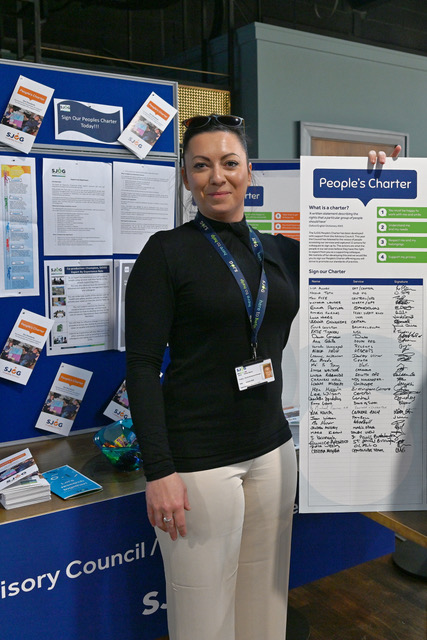

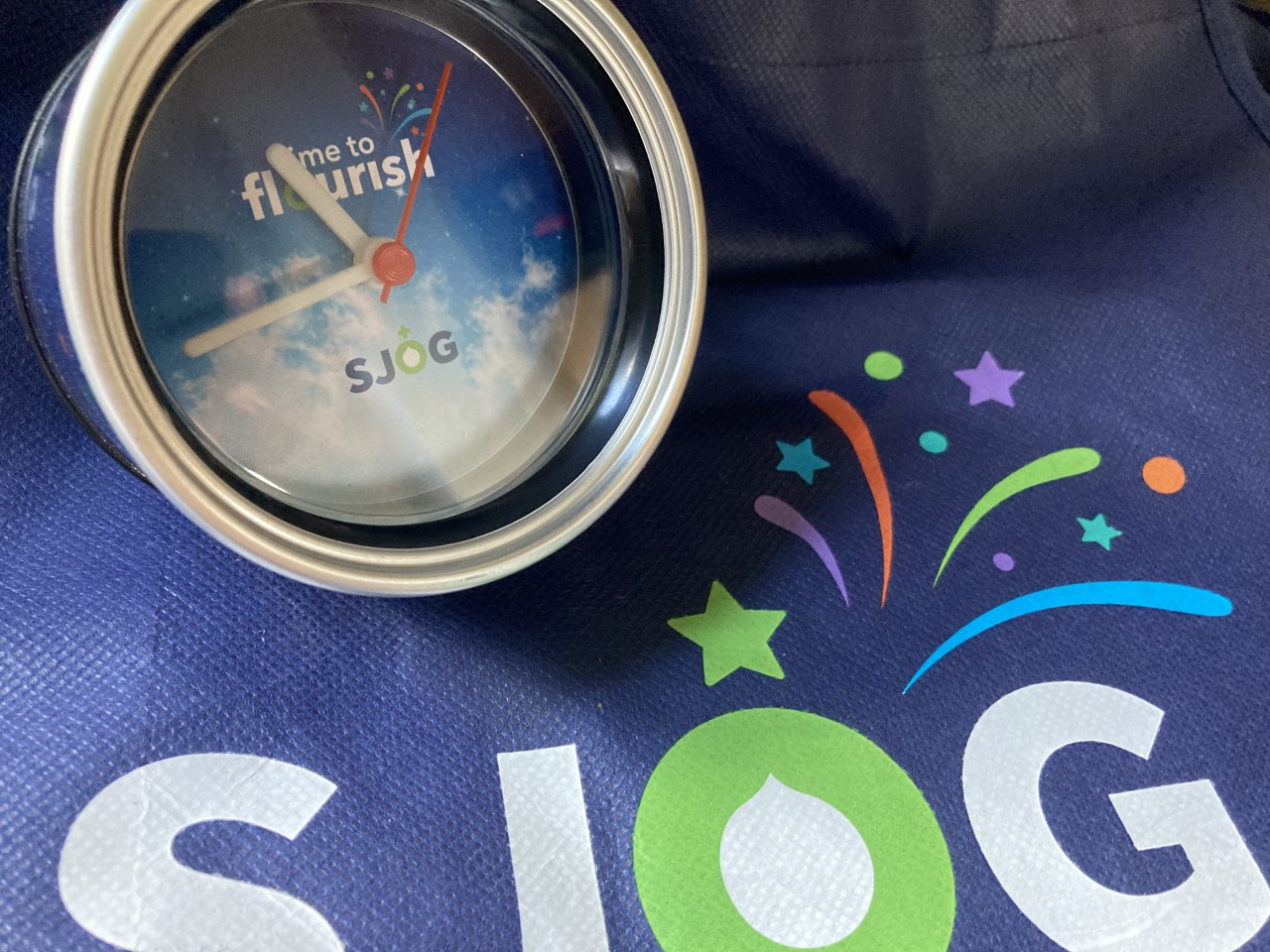
More than 120 colleagues gathered together at SJOG’s annual conference which took place at Villa Park in Birmingham on 18 October 2022. A theme of Time to Flourish ran throughout the day’s presentations and workshops, which included ideas and innovation; how we can support people better; environmental impact; mental health first aid; environmental impact and the Good Shepherd – activating lived experience.
A ‘market place’ event represented 11 services and departments to inform and inspire – from modern day slavery to autism to finance. Here we also saw the People’s Charter launched and colleagues signing up to this.
Bethany Ainsley from Optime presented their approach offering specialist workplace health and wellbeing support.
The day was wound up by a question and answer session which provided an opportunity to put questions to the Executive Management Team: Paul, Jamie, Leanne and Lisa.
Feedback was positive with the overwhelming benefit seen as meeting colleagues in person, often for the first time and getting to know the work of different areas of the charity.
Here’s to next year’s..
To see a selection of photos from the day, please click here: https://sjog.uk/features.php
October 2022
Anti-Slavery Day - 18 October 2022

Every year, Anti-Slavery Day provides an opportunity for individuals, charities, churches, schools, communities and businesses to raise awareness of the dangers and consequences of modern slavery, human trafficking and exploitation.
What is human trafficking?
Human trafficking is the unlawful act of transporting or coercing people through the use of violence or deception in order to benefit from their work or service, typically in the form of forced labour or sexual exploitation for financial or personal gain.
People can be trafficked and exploited in many forms, including being forced into sexual exploitation, labour, begging, crime (such as growing cannabis or dealing drugs), domestic servitude, marriage or organ removal.
What are we doing at SJOG?
SJOG is currently the UK’s largest provider of safe houses for people subject to modern day slavery and trafficking, and provides a voice for this marginalised and vulnerable group, and specialist support to help people recover from their experiences, to rehabilitate and rebuild their lives.
Raising awareness of modern slavery and human trafficking and supporting survivors of this abhorrent crime is a priority for SJOG.
As part of our continuing effort to raise awareness, a recently commissioned film tells the story of people who have been subjected to this crime. These are stories directly from people who we support. We are immensely grateful for their contribution.
To watch the film and for further information visit: https://sjog1810.uk/
18 October 2022
Terry Yorath House Nominated for Award
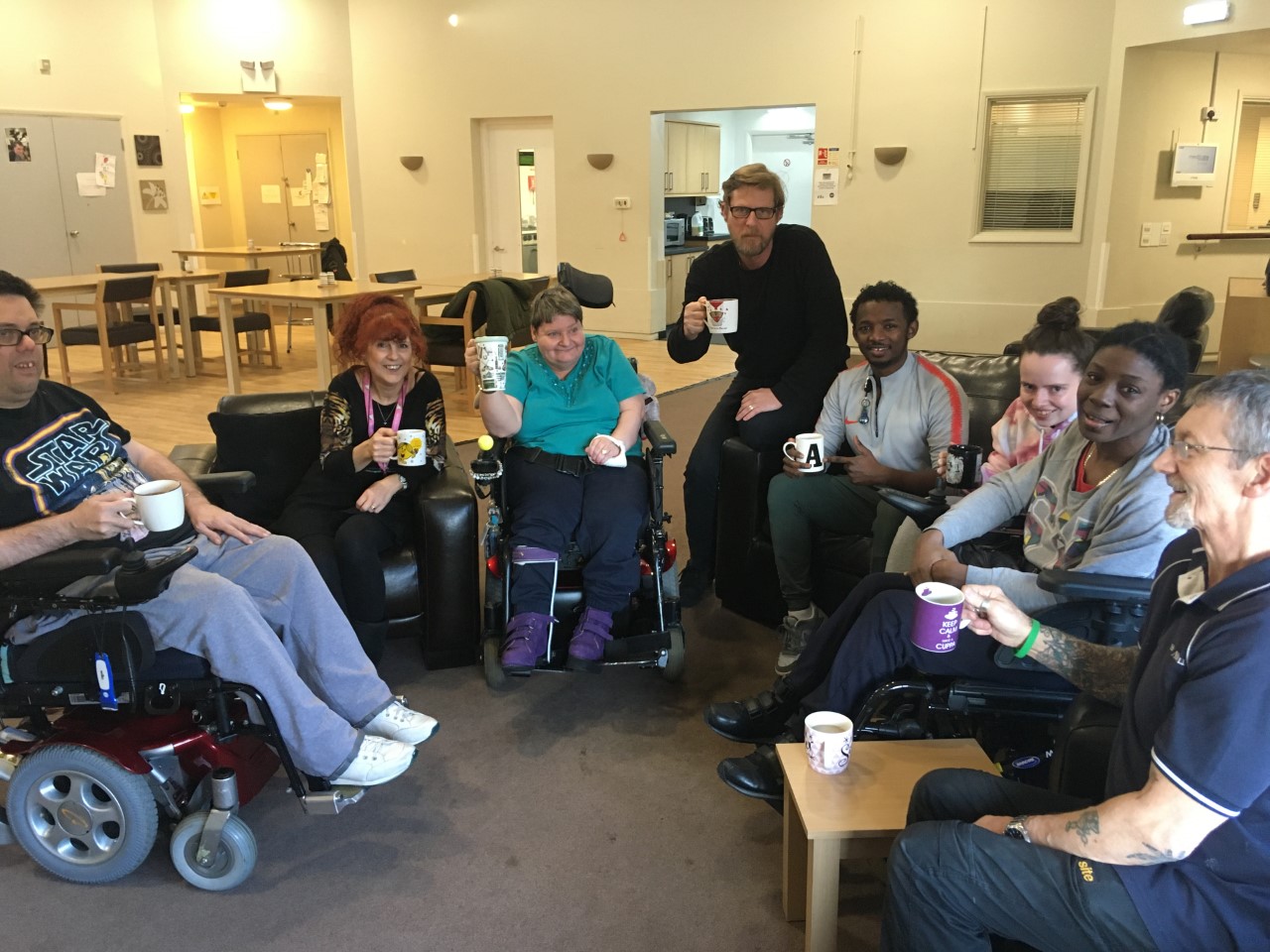

The staff team at SJOG’s Terry Yorath House in Leeds has been nominated in the category ‘Partner of Year’ in the Adults and Health Awards for Excellence which are organised by Leeds City Council.
Members of the team are invited to the Council’s award ceremony to take place on Thursday 10th November 2022.
Terry Yorath House in the Roundhay area of Leeds provides 24-hour care and support for people with physical and/or learning disabilities.
Huge congratulations to the team and good luck for November!
October 2022
International Podcast Day - 30 September 2022
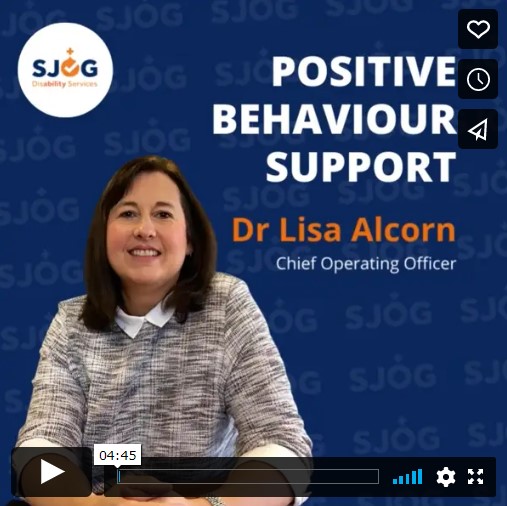
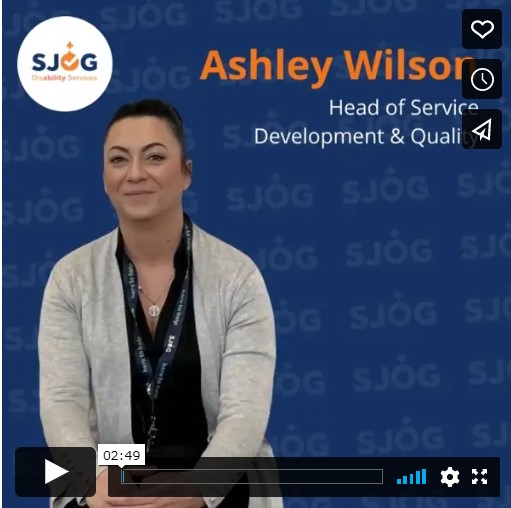
International Podcast Day™ is an international celebration of the power of podcasts.
Two of our latest and favourite podcasts are delivered by Dr Lisa Alcorn, SJOG’s Chief Operating Officer and Ashley Wilson, Head of Service Development and Quality, and introduce SJOG’s Autism Postive Behaviour Support Practice Model and offer information on autism and communication.
Autism is a lifelong developmental disability, which affects how people communicate and interact with the world around them. The prevalence of autism in the UK at present is currently more than 1 in 100 people and has a higher prevalence in males than to females, National Autistic Society (2021).
Communication difficulties are one of the main characteristics that can define a diagnosis of autism. It is thought that 60-70% of human communication is actually non-verbal, meaning our expressions, body language, demeanour, and eye contact are just as important as verbal language.
To listen to the podcasts, go to: https://sjog.uk/about-autism.php
#internationalpodcastday
September 2022
Supporting local communities

At St Paul’s Nursing Home in Selly Park Birmingham, SJOG’s activities co-ordinator, Suzi has been busy co-ordinating donations to the local food bank on behalf of the staff and sisters of St Paul’s.
The sisters have worked with lots of local charities over the years, and most recently have been collecting food supplies to donate to the B30 Food Bank to help people in the local community.
B30 are in desperate need to keep up with the demand of their emergency food parcels who currently report that more food is going out than coming in.
The sisters work with Suzi to run fundraising events such as raffles to raise money to purchase extra items of food which can then be donated to the food bank. They also work with people in the local community such as the local Girl Guides, neighbours and friends, who all give food items to sisters to donate on their behalf.
The B30 Foodbank was set up by the B30 Churches Together network in September 2013 and currently has over 100 volunteers. During 2021 the food bank gave out 6,765 emergency food parcels; a total of over 95,257kg of food.
To find out more about B30 Foodbank: https://b30.foodbank.org.uk/
Photo shows Suzi Kavanagh, SJOG’s Activities Co-ordinator – St Paul’s Nursing Home
August 2022
SJOG colleague – finalist for BBC Make A Difference Award

Fabrice Akpro, Project Worker at our modern day slavery services in Brighton was nominated for the Carer Award by service manager, Bianca.
The BBC Make A Difference Awards celebrate people who are going above and beyond to make a difference where they live, with the Carer Award looking to recognise someone who improves the life on an individual or group of people by caring for them on a regular basis.
The awards are a chance to say ‘Thank You’ and show recognition and appreciation for people who love to make life better for others.
Fabrice has been shortlisted as a finalist and will appear on BBC radio today, 8 August with the winner selected by a panel of judges.
Catch up with this on BBC Sounds
Homelessness Reduction Act - what to expect in years to come

The Homelessness Reduction Act became law on 3 April 2018. It introduced a duty for specified public authorities to refer people who they think may be homeless, or threatened with homelessness, to local authority homelessness/housing options teams within 56 days.
In July this year, the Government launched a consultation for the Homelessness Prevention Grant 2023/24. The grant aims to provide support to all local housing authorities in England to prevent and tackle homelessness, as a commitment to enforce the Homelessness Reduction Act.
Several grants have been already issued in the past few years: the Homelessness Reduction Grant (2020), Flexible Homelessness Support Grant (2021) and the Homelessness Prevention Grant (2022), which saw the development of schemes such as ‘Everyone In’ and ‘Accommodation next’.
The period 2023-2025 will see continuing the investments in prevention, for developing additional initiatives as Housing First and the Affordable Housing Programme to address homelessness and rough sleeping.
SJOG welcomes these initiatives and highlights the importance of addressing the issues that cause people to become homeless. In particular, SJOG recommends the improvements of access to affordable housing and the provision of long-term support in stable accommodation, including for non-UK nationals and those with no recourse to public funds (NRPF).
For further reading go to https://sjog.uk/publications-research.php : 'The Homelessness Reduction Act - what to expect in the years to come?'
August 2022
SJOG wins Public Finance Team of the Year 2022

At the North East Accountancy Awards event held on 30th June 2022, SJOG’s Finance Team were crowned as Public Services Finance Team of the Year.
The Awards recognise excellence within the fields of finance, accounting and tax from all industry sectors operating in the North East. SJOG colleagues were recognised for their outstanding contribution in returning SJOG to a sustainable charity and to its growth over the last three years.
“This is an amazing achievement for this small team, up against Local Authorities and NHS Trusts. It underlines what we already knew – that they are brilliant!” Paul Bott, Chief Executive – SJOG.
Photo shows four of the team: Sam, Lynne, Jenny and Melissa with the awards presenter
July 2022
The Order celebrates its 450th anniversary

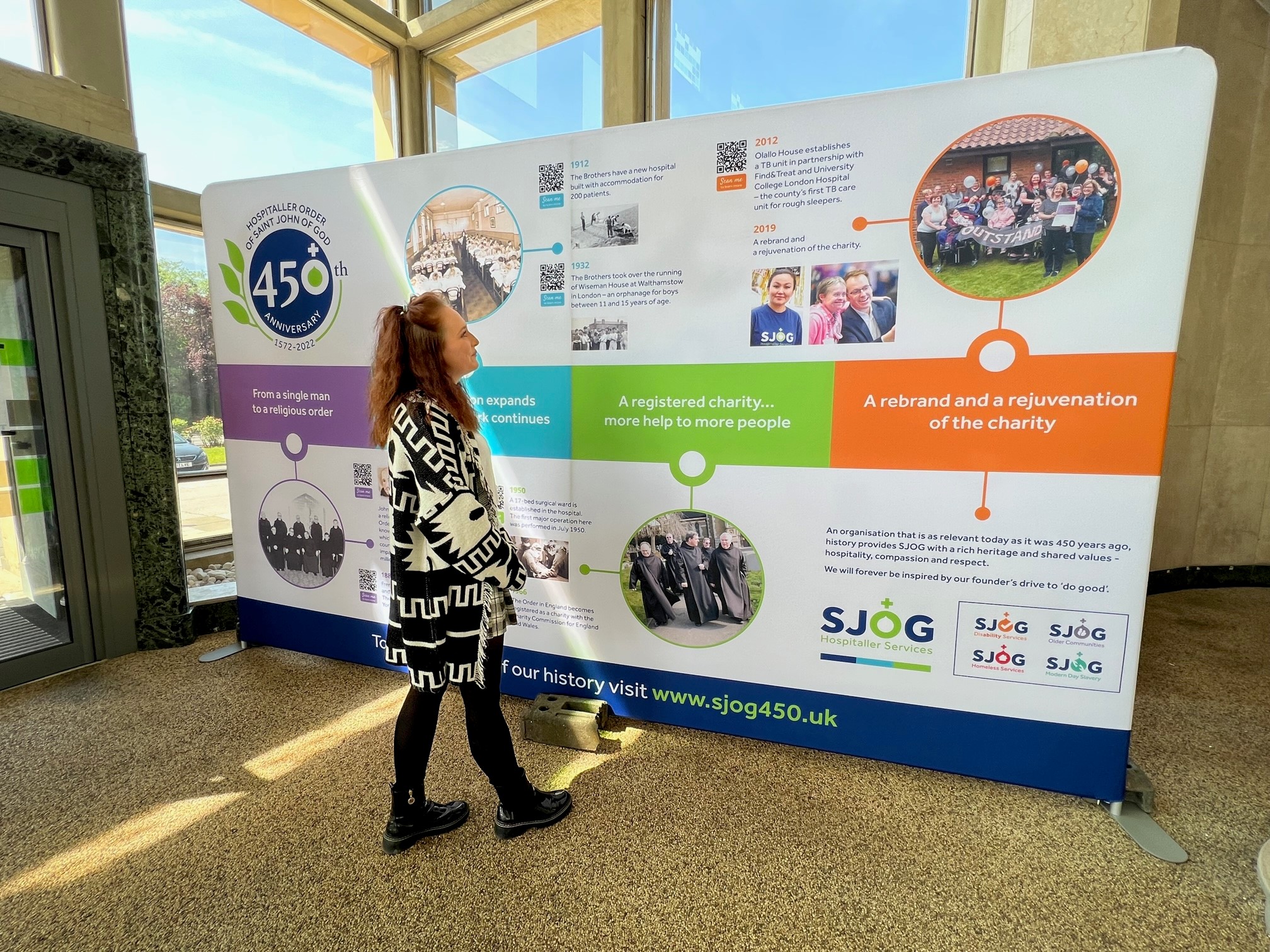
The dream of Saint John of God lives on.
This year we celebrate the 450th anniversary of the Hospitaller Order of Saint John of God, the founding organisation of SJOG.
It was in 1572, twenty-two years after the death of Saint John of God that his followers were recognised as a brotherhood – a religious organisation. John of God had captivated and enthused his followers and they wanted the movement that he had initiated to continue.
The Order grew from its beginnings in Spain to a presence in over 50 countries and supporting millions of people.
“All we ask is, ‘How can we be of help?’ And we’ll give all the resources we have to reach out and help people face the challenges they have in their lives, and help people be the person they want to be.
What we are celebrating is that the work of Saint John of God is continuing and in manner that Saint John of God would approve of.” Br Donatus Forkan, Provincial of the Hospitaller Order of Saint John of God, West European Province.
“The story of Saint John of God over the last 450 years has been one of courage, sacrifice and immense commitment to the example of Saint John of God. Co-workers today have the responsibility to carry forward the dream and values. It’s a privilege and a challenge, and we look forward with optimism to the future.” Conor McCarthy, Group CEO – Hospitaller Services Group
An online exhibition to mark the anniversary provides a snapshot of the Order’s history, together with its work in England from 1880.
June 2022
SJOG Research: The Rwanda Offshoring Plan Explained

In April this year, the Government announced the Migration and Economic Development Partnership (MEDP) deal with Rwanda. The plan aims to send people who have arrived in the UK illegally since January 2022 to have their asylum claim processed in Rwanda. Upon arrival in Britain, asylum seekers will be screened by UK authorities, who will consider on a case-to-case basis, if there are any reasons for them not to be deported.
SJOG, together with human rights and anti-slavery campaigners argue that the plan could increase the potential profit to traffickers and the risk of those vulnerable to being exploited. Our newly published research paper explains the plan in detail and the potential impact on survivors of modern day slavery and trafficking.
Click here to read: https://sjog.uk/publications-research.php
June 2022
Recognising the Contribution of Volunteers

Volunteers' Week, 1- 7 June 2022, is a time to say thank you for the contribution that millions of people make across the UK through volunteering. And at SJOG we say a big thank you to all those who volunteer in our services and to our trustees who are also volunteers. They all make a huge difference to the people we support and the communities in which we work.
This 38th annual Volunteers’ Week is taking place during the #MonthofCommunity running throughout June – more information at https://volunteersweek.org/
If you would like to know more about volunteering with SJOG go to https://sjog.uk/volunteering.php
#GoodWork #VolunteersWeek
June 2022
Celebrating Learning at Work Week 16 to 22 May 2022
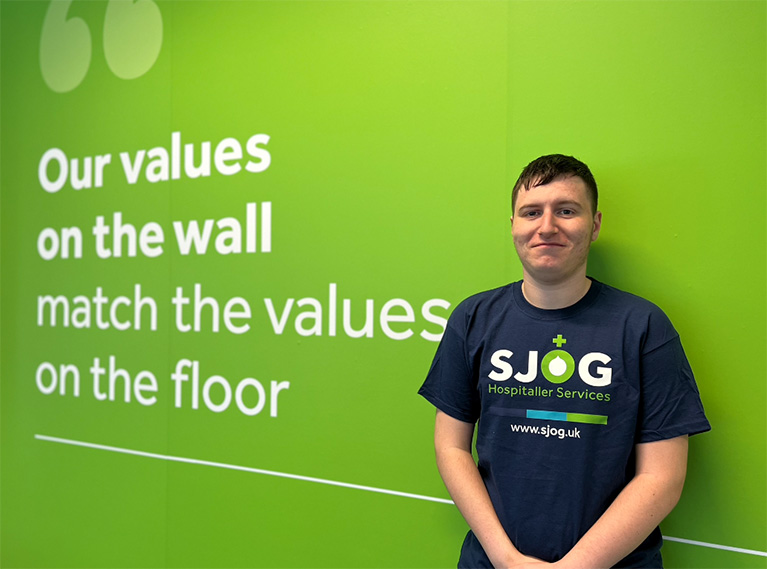
Co-ordinated by the Campaign for Learning, the primary goal of Learning at Work Week is to spotlight the benefits of learning and development at work and build learning cultures at work.
At SJOG investing in our colleagues’ training and development is a priority - both professional and personal development, which benefits the colleagues themselves and the people we support. We also offer specialist accredited training through our Ministry of Hospitality Academy.
Jay is a member of SJOG’s Green Team, which is part of the Government KickStart Programme for young adults and through this is learning about horticulture and a range of skills that will help towards employment.
"I love working outdoors. I have been cutting grass, trimming hedges, maintaining trees, learning about planting and removing seed heads. It's been really good so far and I am enjoying it!"
SJOG's finance team has been shortlisted in this year's North East Accountancy Awards.

SJOG's finance team has been shortlisted in this year's North East Accountancy Awards. The Awards recognise excellence within the fields of finance, accounting and tax from all industry sectors operating in the North East and our SJOG are shortlisted in the Public Services Finance Team category.
Judging is to take place on Thursday 19 May 2022 at the Hilton Newcastle Gateshead with judges assessing on the following areas:
· Ability to work well as a team
· Increased performance, efficiency and effectiveness as a result of the team’s work
· How your results have benefited your company and/or clients
· Effective collaboration with other departments
· Examples of innovation or new initiatives
· Commitment and enthusiasm
· Staff development and training opportunities
The team was recognised two years ago when they were awarded Charity Finance Team of the Year in the Third Sector Charity Awards.
Good luck to the team this year!
May 2022
SJOG Colleagues Complete PBS Champions Course

Four SJOG Colleagues are the first to complete SJOG’s Positive Behaviour Support (PBS) programme.
The programme delivered within the charity aims to shape the future practice of supporting people with learning disabilities and autism, with the aim of enhancing the lives of the people we support.
Support worker and PBS Champion, Leanne said: “I cannot speak for my colleagues but I am sure they'd all agree with how grateful we are for the training we've received and the time given to us to enable us to strive and give the people we support the best quality of life we can.”
What is PBS?
PBS provides a framework that seeks to understand the context and meaning of behaviour in order to inform the development and supportive environments. By creating these supportive environments therefore prevents the occurrence of behaviours of concern.
How is SJOG embedding PBS?
SJOG encourages colleagues to become PBS champions so they can help to embed SJOG’s capable-environment framework, understand autism environmental assessments, person-centred assessments, assist in developing PBS plans and help with monitoring.
Well done on your achievements Leanne, Jodie, Agnes, Katie and Donna!
The PBS Champions were presented with their certificates at SJOG head office by Lesley Selfe, Trustee and Paul Bott, Chief Executive.
April 2022
SJOG's Green Team
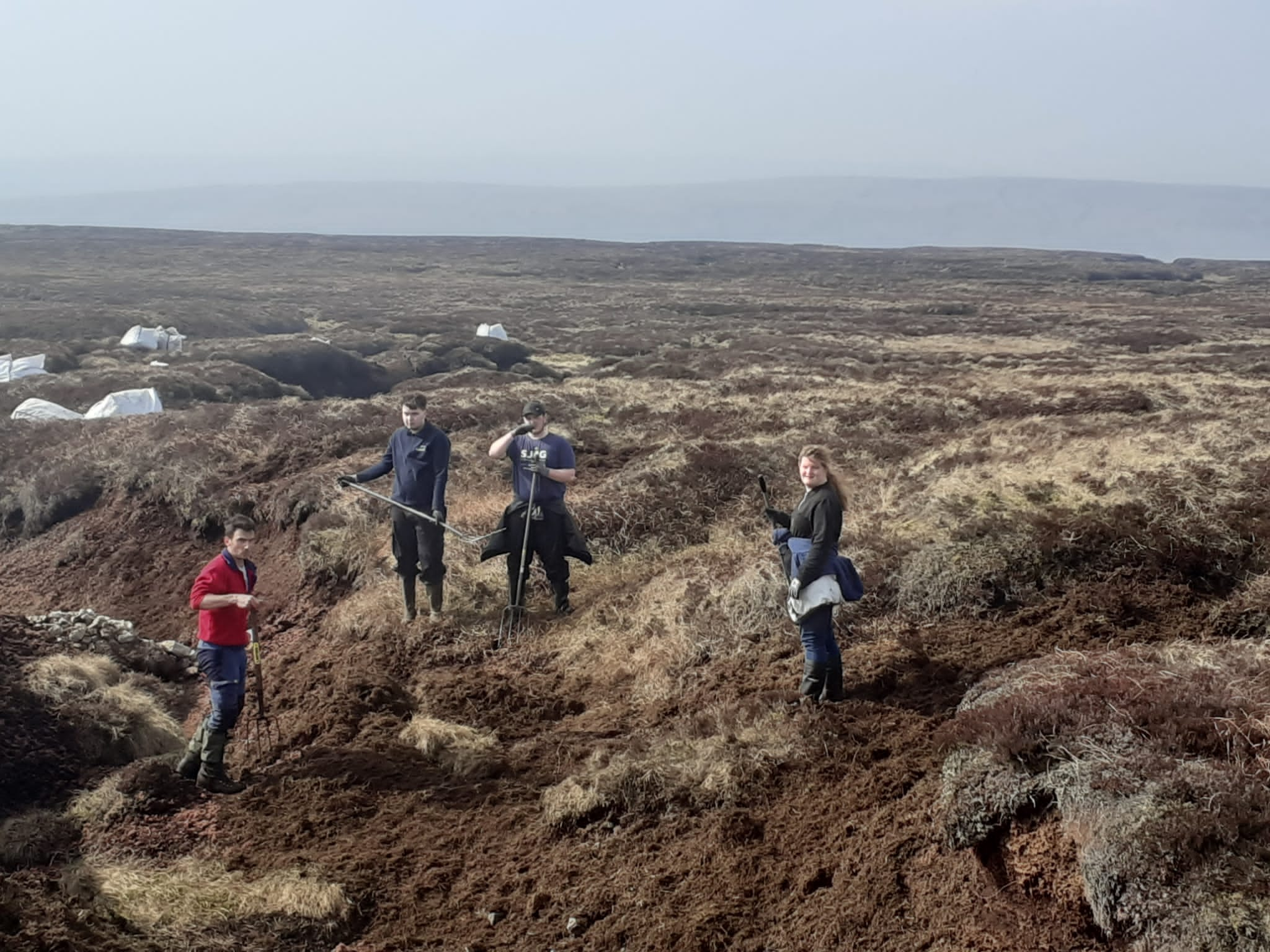
Last week, SJOG’s Green Team were working with members of the North Pennines AONB (Area of Outstanding Natural Beauty) carrying out peat bog restoration.
Peat bogs store a vast amount of carbon and their degradation is releasing huge quantities of carbon, accelerating global warming.
In one day's work the Green Team prevented the release of the same amount of carbon as produced by 2 average cars in the UK over one whole year!
As part of their work, the team who are part of the government’s Kickstart Programme, also carry out a range of gardening projects in SJOG’s services in the north.
#Goodwork
April 2022
World Autism Acceptance Week – 28th March to 3rd April 2022

Pioneered by the National Autistic Society (NAS), World Autism Acceptance Week aims to draw attention to the 700,000 autistic adults and children in the UK both to educate those unaware of the condition, and to help make the world friendlier to those who are affected by it.
Autism is a lifelong disability which affects how people communicate and interact with the world.
The week coincides with a campaign at SJOG to recruit staff into new services due to open in early summer in Stockton and Middlesbrough for people with autism who require specialist, and often intensive, support.
Dr Lisa Alcorn, Chief Operations Officer at SJOG said, “These services will create really exciting opportunities for people who want to develop their autism specialism in residential and supported living settings. SJOG’s autism practices have been academically approved. We ‘Think Autism’ in a person-centred way and unlock people’s potential. The work is extremely rewarding with great career pathways.”
The new services will complement current services in particular our service at Billingham which recently achieved NAS Accreditation.
#AutismAcceptanceWeek #AutismAcceptance #Autism #AutisticAndProud #NationalAutisticSociety
March 2022
Marking World TB Day - 24 March 2022

24 March, is World Tuberculosis (TB) Day – marking the date in 1882 when Dr Robert Koch announced that he had discovered the bacterium that causes TB, which opened the way towards diagnosing and curing this disease.
TB remains one of the world’s deadliest infectious killers. Each day, over 4100 people lose their lives to TB and close to 28,000 people fall ill with this preventable and curable disease. Global efforts to combat TB have saved an estimated 66 million lives since the year 2000. However, the COVID-19 pandemic has reversed years of progress made in the fight to end TB. For the first time in over a decade, TB deaths increased in 2020.
The theme of World TB Day 2022 - ‘Invest to End TB. Save Lives.’ – conveys the urgent need to invest resources to ramp up the fight against TB and achieve the commitments to end TB made by global leaders. This is especially critical in the context of the COVID-19 pandemic that has put End TB progress at risk, and to ensure equitable access to prevention and care in line with WHO’s drive towards achieving Universal Health Coverage. WHO [World Health Organisation]
London is infamously known as the TB capital of Western Europe and accounts for around 36% of cases nationally. Rates of TB are highest among people with social risk factors including homelessness and especially among rough sleepers, who are more likely to be infectious and less likely to complete TB treatment. (Standard TB treatment lasts a minimum of 6 months and for multi-drug resistant TB, treatment takes a minimum of 2 years.)
The Department of Health recognised homelessness as a major barrier to completing TB treatment. To address this and meet this unmet need, Olallo House has, since 2011, been providing specialist medical, social and psychological support enabling homeless patients to complete their full course of TB treatment and address other issues that have contributed to their homelessness.
Please support Olallo's work:
As we mark World TB day and celebrate our work at Olallo House supporting some of the most vulnerable TB patients through their treatment and with the other complexities of their lives, we continue to seek funding to complement their TB treatment package. Please donate and help us to help people rebuild their lives: https://www.justgiving.com/campaign/SJOGOlallo
March 2022
Do Good Day
8th March 2022

On 8th March, the feast day of our founder, Saint John of God, SJOG colleagues and people we support in our services throughout the country celebrated the day by ‘doing good’ with a wide range of activities to benefit the communities where we work and live.
“Do good for yourself by doing good for others.” Saint John of God
Click here to see some of the activities that marked the day: https://sjog.uk/features.php
#GoodWork
March 2022
SJOG Celebrates Commitment to Real Living Wage
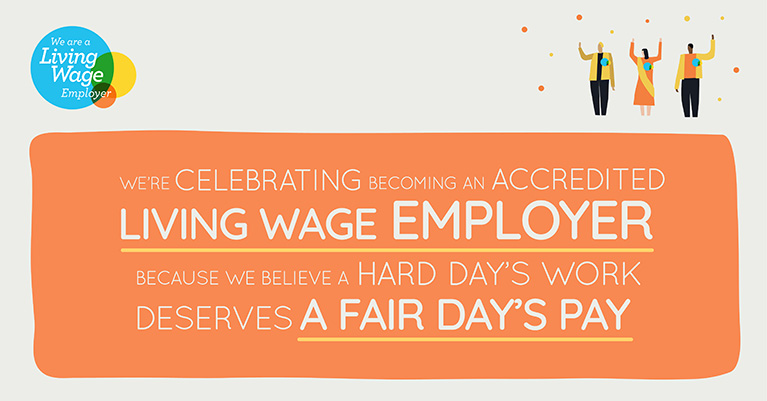
SJOG been accredited as a Living Wage Employer, with this commitment seeing everyone working at SJOG receive a Real Living Wage. This is currently set at £9.90 however we have gone above this to give a minimum of £10 per hour for all jobs.
The real Living Wage is the only rate calculated according to the costs of living. It provides a voluntary benchmark for employers that wish to ensure their staff earn a wage they can live on, not just the government minimum. Since 2011 the Living Wage movement has delivered a pay rise to over 300,000 people and put over £1.6 billion extra into the pockets of low paid workers.
Katherine Chapman, Director, Living Wage Foundation said: “We’re delighted that SJOG has joined the movement of almost 9,000 responsible employers across the UK who voluntarily commit to go further than the government minimum to make sure all their staff earn enough to live on.
They join thousands of small businesses, as well as household names. These businesses recognise that paying the real Living Wage is the mark of a responsible employer and they, like SJOG, believe that a hard day’s work deserves a fair day’s pay."
And a final word from Paul Bott, SJOG’s Chief Executive: “Our colleagues are fantastic and it’s great to make the commitment to paying our colleagues a Real Living Wage. They deserve it.”
February 2022
SJOG opens 20th safe house

Today on 7th February, we opened a new safe house in Birmingham as part of our Carmona services. The house has recently been renovated to meet the needs 10 people for whom we will provide specialist support to help victims of trafficking or modern day slavery to recover from their experiences and rebuild their lives.
“It is a great achievement for Carmona House, and with this new space, the service in Birmingham is able to support 48 people and our team grows with 2 new support workers.” Ivan Munoz, Service Manager
SJOG has opened 18 safe houses in 30 months and is currently the UK’s largest provider of safe houses for people subject to trafficking and modern day slavery.
Photo shows Lisa Alcorn, Head of Operations and Vicky Everett, Service Development Manager
February 2022
New Intensive Housing Management Service Opens

The start of February saw the opening of a new service in Enfield – The Grove which will support people with a range of needs in relation to all aspects of housing and maintaining a tenancy.
SJOG’s Intensive Housing Management Service provides a range of support to ensure people are able to sustain their tenancy, for example help with rent payments and claiming housing benefits, and reporting maintenance issues. A ‘handyman’ service ensures repairs and maintenance issues are responded to quickly, that regular safety checks are carried out and planned improvements are implemented.
Our aim is to ensure that people’s homes are comfortable and a place to feel safe and secure, and where people are able to live as independently as possible.
We welcome all who will live and work at The Grove.
February 2022
SJOG service recognised for good autism practice

Sandown Road in Billingham has been awarded Autism Accreditation by the National Autistic Society, the UK’s leading charity for autistic people.
The Specialist Accredited Award was given in recognition our good autism practice, with particular recognition by the Accreditation Committee given for the staff team’s specialist approaches so that support is personal-centred and tailored to individual qualities, abilities, interests, preferences and challenges. It was also highlighted that practice was informed by an understanding of how to support each autistic person in their communication and social integration, in becoming more self-reliant, in sensory regulation and in maintaining their emotional well-being.
Autism Accreditation is an autism-specific quality assurance programme. It was set up by the National Autistic Society in 1992 to improve the support available to autistic people in organisations throughout the UK and across the world, including local authorities, NHS trusts, education authorities, schools, colleges and more. To gain Accreditation, organisations have to meet a standard of excellence and follow a framework for continuous self-examination and development. Over 500 organisations in the UK are now accredited.
Ashley Wilson, SJOG’s Head of Service Development and Quality said, “We are delighted and proud to receive this award by NAS and that our expertise in good autism practice has been recognised. This learning and expertise will be developed in more of our services going forward, which will have a significant and positive impact on autistic people supported by SJOG both now and in the future.”
January 2022
SJOG’s Advisory Council seeks new members

Hannah, Craig and Peter are on a mission to recruit more members to the Advisory Council as it continues to grow and ensure many more voices of the people that SJOG supports are heard.
“We need more people to take part in the Advisory Council, especially people who are not able to communicate verbally,” says Hannah
One of the key aims of the Council is to inform the decision-making of the trustee board on any items of the board agenda that it wishes to express a view on, as well any other aspects of the direction of SJOG that it considers important. This builds on the approach of embedding decision-making by the people that we are here to serve at every level of the organisation to ensure that we have real representation and to demonstrate our commitment to improving the quality of what we do through involving the people we support.
“It’s a brilliant thing to have at SJOG. It gives us a voice in how we would like things to be done, how to develop things.” said Craig.
And Peter likes that he is able to talk to people, that he can voice his opinion and give ideas, and that everyone listens. He also likes the opportunity it gives to make new friends and to work.
And a last word from Craig, “I feel absolutely privileged to be part of the Advisory Council – long may it continue!”
January 2022
SJOG team raise funds for people affected by dementia

Last month SJOG colleagues Lisa, Ashley and Emily all took part in the Alzheimer's Society Memory Walk. They were joined by ffriends Gemmy and Kelly to complete the 7k walk in South Shields to raise vital funds for people affected by dementia.
Ashley Wilson Head of Service Development & Quality said: “We were walking for Lisa’s mum and Emmalyne’s step-dad Collin who has recently passed away. The walk was a lovely experience to see everyone together for the same goal.”
The SJOG team raised a brilliant £972 which will help fund research to find a cure and support people living with dementia in the UK.
To find a memory walk in your area visit: https://www.alzheimers.org.uk/memory-walk/find-a-walk
December 2021
Great achievements..
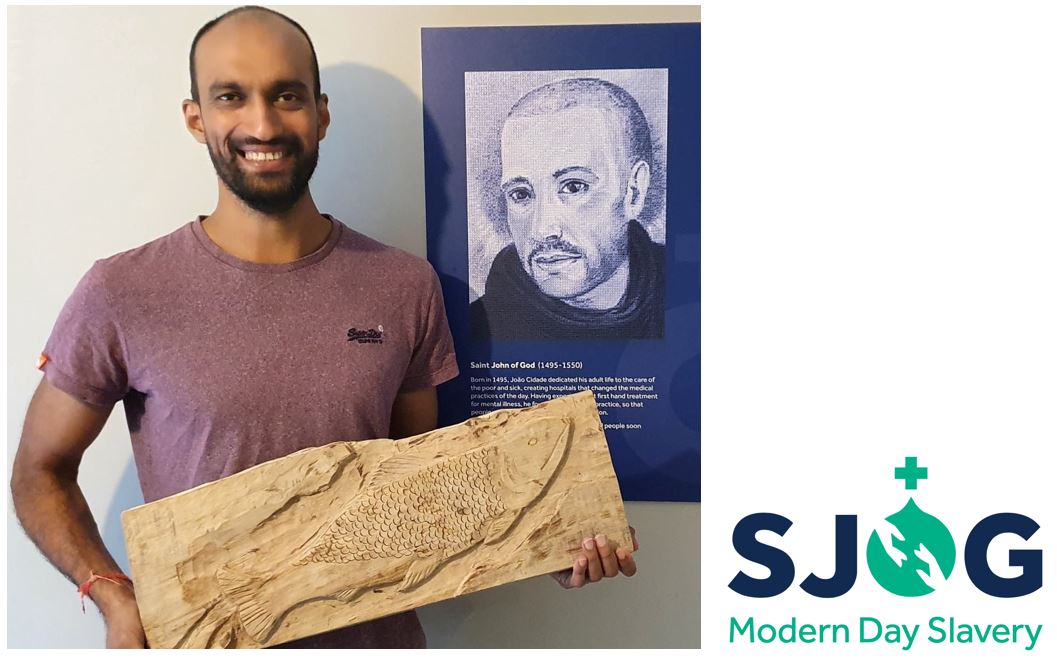
Here is Sailesh showing off his carving talents. Sailesh completed his work at the carving project run by Voices in Exile and the Green Spaces Project. Voices in Exile is a community organisation that as well as providing practical and legal support for migrants, runs a range of programs to enable people to practise their English and participate in a range of learning and creative activities. And The Green Spaces Project is a small Covid-safe support group for those who like to meet outdoors.
SJOG project worker, Ewa, said: “Sailesh has done so well with the project that they have now decided to take him on board as a volunteer! We are so proud of him and can't wait to see what he does next.”
SJOG’s Modern Slavery Services provide accommodation and outreach services to support victims of trafficking or modern day slavery. Safe-houses provide a safe space and a supportive environment with specialist support to help people rehabilitate and recover from their experiences.
December 2021
SJOG launches new environmental audit
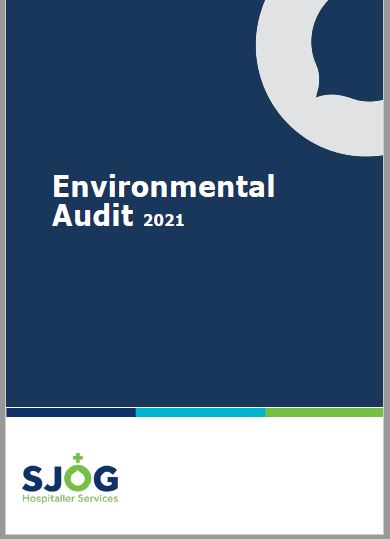
As COP26 is taking place in Glasgow this week (1 Nov 21), SJOG launches its new environmental audit to further its commitment of moving closer to being a net-zero organisation.
Central to SJOG’s core values is that we are stewards of creation and so should run the organisation in a way that has a positive impact on the communities in which we work, building sustainability into everything we do.
Our community researchers were instrumental in pulling this audit tool together. Aurianna and Imogen, both funded by Kickstart, the Government’s work scheme for young people, have produced this audit tool for use; just one of many valuable contributions to the charity.
The audit tool will be used throughout our services to review the waste and energy practices, with key aims of educating colleagues to become aware of the energy usage and waste created in the services they work, and effecting behavioural changes that will impact on our services, making them more environmentally friendly.
November 2021
Trustees' Week 1 - 5 November 2021
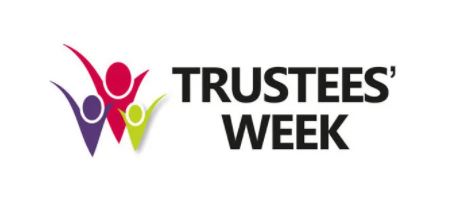
This week is Trustees week, where we shine a light on our trustees. Trustees volunteer their time freely to make sure that SJOG is well run and heading in the right direction. Details of our current trustees are listed here https://sjog.uk/people.php and this week we also welcome two new trustees.
Fela Aromolaran is a geophysicist who has worked in the oil and gas industry and has undertaken substantial work with local communities around the world. Fela has a real interest in sustainable development and brings his experience of developing feasibility assessments, project management and managing risk to the board.
Catherine Rennolds started her career as a nurse, developed other nurses, and moved into people development at PwC where she progressed to become ‘Global Director for Leadership Development’. Catherine has worked all over the world and now runs her own business as an executive coach in the North East. As we continue to focus on how we can support our colleagues to flourish, Catherine’s skills, knowledge and experience will be invaluable.
November 2021
Black History Month - Proud To Be

People from African and Caribbean backgrounds have been a fundamental part of British history for centuries. However, campaigners believe their value and contribution to society is often overlooked, ignored or distorted. Black History Month gives everyone the opportunity to share, celebrate and understand the impact of black heritage and culture.
Black History Month is marked throughout October and this year the theme is ‘proud to be’.
Mo Huzair, SJOG’s service manager at our community centre in Welwyn Garden City gave us his thoughts on Black History Month.
“I’m a mixed black and Asian man and have worked in, with and around public services for 20+ years. I have worked for the NHS, in policing, the military and now care services. I am the child of mixed cultures as well as being a proud Englishman.
The last few years have shown that black and minority ethnic communities are still disproportionately affected adversely by national issues. Coronavirus, Black Lives Matter, mortality rates, mass migration of people fleeing danger in their home countries and national protests have all highlighted that we as a society are still largely ignorant of each other's histories. If we do not understand our histories, we will never build a better future. Black history month is an important time to celebrate differences, engage with each other and improve our futures.”
Mo Huzair | Service Manager | Woodhall Community Centre
October 2021
Olallo House Receives Highly Commended Award

The Olallo Team were delighted to accept their Highly Commended Award at last week’s presentation ceremony of The London Homeless Awards 2021 held at Union Chapel, London on 14 October.
Olallo House was one of two projects to receive the Highly Commended award:
Olallo House is an innovative intermediate care service opened in 2008 in response to multiple tuberculosis (TB) treatment failures and preventable deaths among people experiencing homeless with complex needs and no recourse to public funds. In addition to successfully supporting people to complete challenging TB treatment, Olallo is first and foremost a “home” providing holistic, trauma informed support enabling residents to realise positive changes and move on in their lives.
Pawel Zabielski, Olallo’s service manager accepted the award and thanked: “all who contributed to make this happen - to our partners, ours guests, the team and the Sisters of the Poor Servants of the Mother of God. Thank you so much!”
The project was featured in The Evening Standard on 14 October:
October 2021
Anti-Slavery Day - 18 October 2021
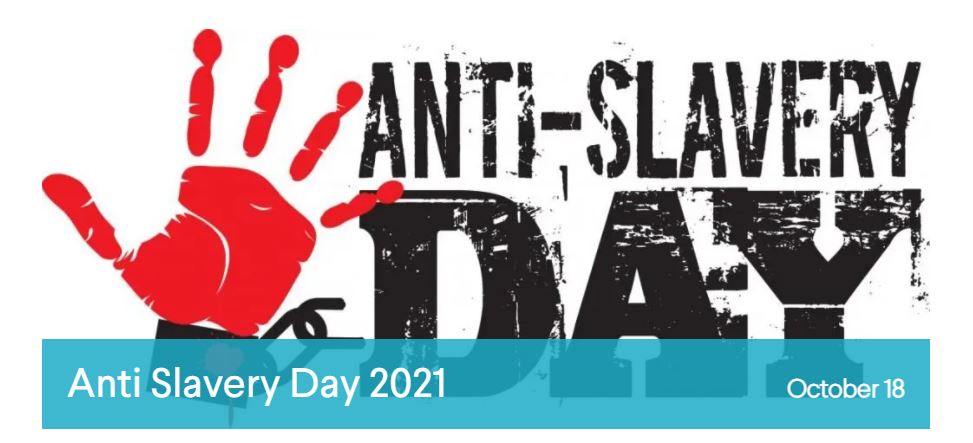
Every year, Anti-Slavery Day provides an opportunity for individuals, charities, churches, schools, communities and businesses to raise awareness of the dangers and consequences of modern slavery, human trafficking and exploitation. It was created by the Anti-Slavery Day Act, a Private Members Bill introduced Anthony Steen CBE, now Chair of the Human Trafficking Foundation.
What is human trafficking?
Human trafficking is the unlawful act of transporting or coercing people through the use of violence or deception in order to benefit from their work or service, typically in the form of forced labour or sexual exploitation for financial or personal gain.
People can be trafficked and exploited in many forms, including being forced into sexual exploitation, labour, begging, crime (such as growing cannabis or dealing drugs), domestic servitude, marriage or organ removal.
What are we doing at SJOG?
Raising awareness of modern slavery and human trafficking and supporting survivors of this abhorrent crime is a priority for SJOG.
SJOG is currently the UK’s largest provider of safe houses for people subject to modern day slavery and trafficking, and provides a voice for this marginalised and vulnerable group, and specialist support to help people recover from their experiences, to rehabilitate and rebuild their lives.
For further information visit: www.sjog1810.uk
SJOG shortlisted in Learning Disability and Autism Awards

We are delighted to announce that SJOG is a finalist in three categories at the Learning Disability and Autism Awards.
- Employer Award
- Making a Difference Award
- The Prof Jim Mansell Award for Outstanding Contribution
These awards seek to acknowledge and celebrate organisations that have made outstanding contributions to the lives of people with a learning disability and/or autism.
SJOG’s Chief Operating Officer, Lisa Alcorn said: “We have a great team at SJOG, so receiving this recognition from the Learning Disability and Autism Awards, demonstrates that we are a charity that is doing 'good' for the people we are here to support. We are proud of each and every one of our colleagues who has contributed to the success of SJOG and being shortlisted for three awards is testimony to their hard work and commitment.
Our colleagues go above and beyond every day in providing outstanding care and support to people with learning disabilities and autism. It will be a proud moment if we are successful in attaining any of these awards and to represent SJOG is such talented company.”
The awards ceremony will take place on the 29th October at Birmingham ICC where the winners will be announced. Watch out for further news then!
More details about the awards can be found here www.nationalldawards.co.uk
October 2021
Animal Therapy Day at St Paul’s Nursing Home

St Paul’s Nursing Home in Selly Park held their very own animal therapy day last week.
It was a huge success with lots of animals, but this beautiful skunk stole the show, and also cleared the room!
Not everyone knows of the positive effects that come from having regular contact with animals has on both physical and mental health. Animals offer unconditional love and companionship and research also suggests that animals have the ability to boost general health and well-being, especially as we age.
SJOG’s Activities Co-ordinator Suzi Kavanagh (pictured above) said, “I did the animal therapy day as many of the sisters grew up on farms and reared animals. A few sisters have spoken to me about how much they love animals and miss the pets they used to have.
All the sisters loved stroking the furry animals and found the tortoise very relaxing and therapeutic (they have asked me to look into adopting one from a rescue centre!).
Dale from Critterish Allsorts brought in a dog, chinchilla, rabbit, tortoise and a skunk who got excited and sprayed Dale. The sisters still talk about the smell now!
Dale brings the animals in, introduces each animal to the sisters, gives them a chance to stroke the animal and answer any questions they may have.
Some sisters were absolutely besotted by the animals, you could see from their actions that it brought back memories and they talked about their experiences growing up.
It brought back memories of some of animals they used to look after and they got the opportunity to meet animals they’ve never encountered and learn about them.
The sisters have asked me to book Dale and the animals for next year when the weather is nice so we can have the show in the private garden and the sisters from the community can join us.”
For more info on animal therapy, or to book a session please visit www.critterishallsorts.co.uk
October 2021
SJOG Magic Space Ambassadors

Meet our Magic Space ambassadors!
The ambassadors recently completed an intensive day of sensory training which is the first step in our Magic Space research project.
Magic Space is a concept that we have been working on for several years. In 2020, the Covid pandemic and the need to shield vulnerable people in our care meant that access to traditional sensory therapies ceased. The need for Magic Space became even more apparent and in September 2020, The National Lottery (as part of the Covid Response Fund) granted the funding for the first Magic Space. Between then and December 2020, Magic Space was designed and coach-built to our specification and was delivered to us in January 2021.
This will enable us to deliver bespoke sensory experiences to meet the needs of people we support; combining technology and traditional sensory experiences and therapy, whether that might be calming, stimulating, for desensitisation, learning or for entertainment. The technology uses immersive virtual reality, projection, 360 multi-sensory experience including wind, scent, touch, sound and vibration.
All did extremely well and we look forward to keeping you all updated on our progress.
Well done ambassadors!
September 2021
Steven enjoys a free cruise

Steven Allison was one of the lucky 999 people to board a Royal Caribbean cruise-liner for a 4-day cruise around the UK in July. Royal Caribbean offered free cruise holidays for workers in the emergency services, social care sector, NHS and armed-forces in a nod of appreciation for their efforts during the coronavirus pandemic. Key workers who were able to show proof of an official Blue Light card and were UK residents were able to register in a ballot which was drawn in April.
Steven who has worked for SJOG for 28 years and is based at our supported living service in Leyburn set off from Southampton along with his wife and two daughters.
Steven said, “We had a fabulous time and were treated like absolute royalty! Amazing experience!”
30 July 2021
We cannot be more proud!

Last week three of our Carmona House clients graduated from the 10-week Free Thinking course at the Fircroft College in Birmingham. Clients have enjoyed a 10-week x 3-day residential course at the Fircroft College facilities.
Free Thinking is for victims of trauma such as modern slavery. During the 10 weeks people are able to share their stories with each other, learn about different cultures, build their confidence and start planning their next steps.
After four months of effort, the three students completed their course on 24th June with the presentation of their projects, accompanied by their key worker Jana Grygarova who has encouraged, supported and accompanied them during this process.
Our three graduates are ready for the next level! Congratulations!
Ivan Munoz,Team Leader - Birmingham
Homelessness and Modern Day Slavery/ Trafficking Services
Photo shows two of our graduates with their key worker, Jana
16 July 2021
Olallo House Commended in London Homelessness Awards

From 30 applications, and short-listed to the final six Olallo House been specially commended for its work as a specialist TB homeless service.
Ian Brady, Executive Chair of London Housing Foundation and chair of the judging panel, said: “With a strong field of applicants, each of these projects did well to get to the last six and all would have been worthy winners.”
More details about the London Homelessness Awards can be found at www.lhawards.org.uk
#LondonHomelessnessAwards #LHA2021
14 July 2021
Olallo House Shortlisted in London Homelessness Awards

SJOG's Olallo House is one of six projects from across London that has been shortlisted for the London Homelessness Awards 2021.
These were announced in yesterday’s (1 July 2021) press release by London Housing Foundation:
Shortlist for London Homelessness Awards Announced!
Six projects from across London have been shortlisted for the London Homelessness Awards and are in the running to win the first prize of £30000.
This is the 21st anniversary of the awards, which are sponsored by the London Housing Foundation, London Housing Directors, Mayor of London, Crisis and Shelter. This year the awards are run in partnership with the Evening Standard Homeless Fund.
Organisers received over 30 applications for the awards and a judging panel had to choose just six. The projects will now be visited by a member of the panel and the final winner and runners up who will share a prize fund of £60000 will be announced at a special event on October 14th at the Union Chapel in Islington.
Simon Dow is the Chair of the judging panel for the London Homelessness Awards. He said: “In a strange and uniquely challenging year for the housing and homelessness sector we were very pleased with the number and quality of applications received. Yet again we saw examples of really high quality innovative work being carried out by a wide variety of organisations across London, helping people who are homeless or at risk of homelessness. It was as ever very tricky to agree a final six but these projects show real imagination, sustainability and commitment to help reduce homelessness in London.”
The six shortlisted projects (in alphabetical order) are:
Camden Health Improvement: is a specialist homeless GP service in Camden. Since 2015 they have provided a novel, innovative and evidence-based GP Outreach programme. The impact has been to raise the average age of death of their homeless patients from 47 up to 54 years old. This is whilst the national trend has been for the age of death for homeless people to fall from 47 down to 44 years of age.
MyBnk: The Money House is an accredited youth homelessness prevention scheme. It targets care leavers and vulnerable young adults about to move into social housing. Over a week, trained experts in four real flats across London teach participants everything they need to know to keep their tenancy. They focus on survival money management skills, understanding systems, planning for the future, and reducing financial exclusion. It has resulted in a 64% drop in evictions for those at risk of becoming homeless.
Southwark Law Centre: Homeless Patients Legal Advocacy Service: Southwark Law Centre works in partnership with Guy’s and St Thomas’ NHS Foundation Trust's Homeless Health Team to provide advice and legal representation for homeless hospital patients. The law centre's specialist solicitors help patients with particularly complex immigration, housing or welfare benefits cases. It also provides training and advice to the Trust's homeless health team and other staff, so they are better able to support this particularly vulnerable patient group.
Standing Together and Solace Women’s Aid: The Westminster VAWG (violence against women and girls) Housing First project provides permanent, independent housing and intensive support for 20 women experiencing long term homelessness, any form of VAWG and multiple disadvantage. Solace work to build relationships with the women and provide intensive ‘woman led’ support to help them maintain a tenancy and improve physical and mental wellbeing. Standing Together manage partnerships with a coalition of housing partners who provide units for the project.
SJOG Hospitaller Services: Olallo House is an innovative intermediate care service opened in 2008 in response to multiple tuberculosis (TB) treatment failures and preventable deaths among people experiencing homeless with complex needs and No Recourse to Public Funds. In addition to successfully supporting people to complete challenging TB treatment, Olallo is first and foremost a “home” providing holistic, trauma informed support enabling residents to realise positive changes and move on in their lives.
St Mungo’s: Westminster Street outreach Service work 365 days of the year early in the morning and late at night to provide support for individuals rough sleeping in Westminster. Westminster SOS provide support and assistance to anyone that finds themselves rough sleeping in Westminster. When people are housed they are then offered bespoke support so individuals maintain accommodation and do not return to the streets. This includes support with housing, health, immigration, access to benefits and reconnections where appropriate.
More details about the London Homelessness Awards can be found at: www.lhawards.org.uk
2 July 2021
Welcoming Rockliffe Court to SJOG

We’re delighted to welcome the people of Rockliffe Court to the SJOG family. Rockliffe Court in Hurworth, near Darlington provides eighteen self-contained supported living accommodation and community facilities with 24-hour support for people with physical and sensory disabilities.
The properties are owned by the Hospitaller Order of Saint John, our founding charity, but for over 20 years have been leased, and the service delivered by another provider. We look forward to them being part of the growing number of services we provide for people with learning and physical disabilities.
Dementia Awareness Week 17 – 23 May 2021
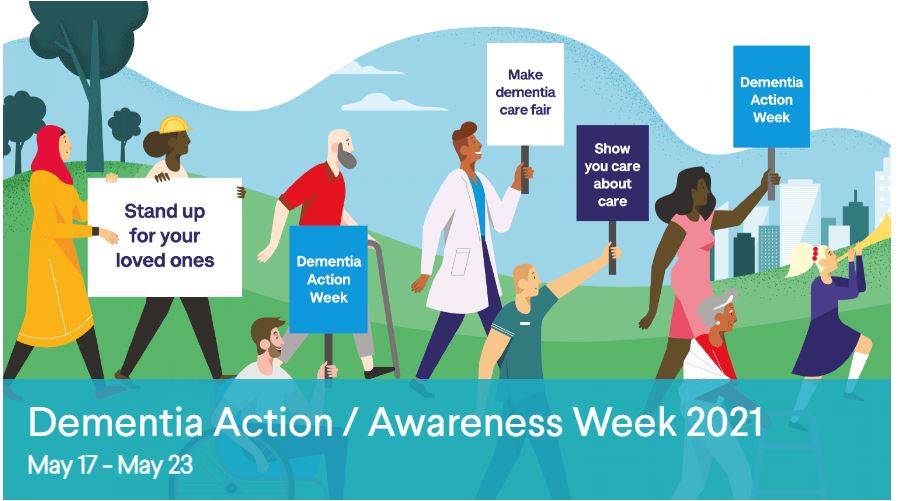
One in three of us born in the UK today will go on to develop dementia in our lifetime, and there will be one million people living with dementia by 2025 making dementia care one of the greatest challenges facing our society.
Dementia Action Week is a national event that sees the UK public taking action to improve the lives of people affected by dementia.
Below is a powerful poem written by Debbie Affleck of University Hospitals Plymouth to raise awareness.
Hold my hand; I’m scared feel alone,
My thoughts are jumping; I want to go home,
Oh Mother protect me, Father I see you so clear,
But Dementia has grasped me, instilling such fear.
Oh where on earth am I and hey, who are you?
Why can’t I do the things that I used to do?
The lights are so bright here and noises so loud.
A familiar face I need in the crowd.
I need the bathroom, but how do I say?
Nothings the same now, I don’t know the day.
I get so frustrated, the words jumbled when they come out.
Please don’t get angry if I scream and I shout.
Oh were on earth am I and hey, who are you?
Why can’t I do the things I used to do?
The lights are so bright here and noises so loud.
A familiar face I need in the crowd.
My life was so full, but in darkness I fell,
Continue to tell me, I do have a call bell.
And if I forget, encourage me to drink and to feed,
Check, use your skill to fulfil all my needs.
Oh where on earth am I and hey who are you?
Why Can’t I do the things I used to do?
The lights are so bright here and noises so loud.
A familiar face I need in the crowd.
So when I’m in hospital, with me, go slow.
Put familiar items around me so I know where to go.
If I wander, just let me, so long as I’m safe
When I act inappropriately help me to save face.
Oh where on earth am I and hey who are you?
Why Can’t I do the things I used to do?
The lights are so bright here and noises so loud.
A familiar face I need in the crowd.
I never chose for my brain to be ill.
Always so vibrant and such a strong will.
Get to know me and help me so much to unwind.
Trigger happy memory, continue to remind.
Oh where on earth am I and hey, who are you?
Why can’t I do all the things I used to do?
The lights are so bright here and noises so loud.
A familiar face I need in the crowd.
For I am a human, no different to you.
This awful disease, it just makes me so blue.
So with a deep sense of compassion, even if I hit.
Remember my suffering and help to relieve it.
Oh where on earth am I and hey, who are you?
Why can’t I do the things I used to do?
The lights are so bright here and noises so loud.
A familiar face I need in the crowd.
You can be my familiar face, someone to hold.
To keep me warm when I feel the cold.
In a nursing vocation protect and to serve.
For this, at the very least is what I deserve.
D-C Affleck (Shipley Ward)
Welcome to Michelle, our new Head of HR

We're delighted to welcome Michelle Dalby to SJOG.
Michelle has over 20 years’ experience of working in HR gained in a wide range of sectors, but predominantly education and charitable organisations. She has a MSc in Human Resource Management and is a chartered member of the CIPD (Chartered Institute of Personnel and Development).
Michelle has a keen interest in change management, organisational culture and how the HR Team can support the growth and sustainability of organisations.
Michelle said, “It has clearly been an interesting couple of years here at SJOG and I am really excited to be part of such a worthwhile, forward thinking organisation that clearly cares for the people we support. I am really keen to see how the HR Team can have a positive impact on our colleagues, ensuring that they feel LOVED”.
Celebrating Mental Health Awareness Week

This year the theme is Nature and how connecting with the natural world can support good mental health.
During the pandemic, turning to nature helped many people through lockdowns and research shows that good mental health depends on being able to connect with nature in some way and its power in both prevention of and recovery from poor mental health.
Follow us on Facebook to see how our people we support and colleagues around the country have been benefiting from being around nature in their local community.
SJOG Facebook: https://www.facebook.com/SJOGUK/
#MentalHealthAwarenessWeek #ConnectwithNature
World Hand Hygiene Day 2021

Seconds save lives - clean your hands!
5th May is the designated World Health Organisation (WHO) Hand Hygiene Day. Cleaning hands regularly is one of the most effective ways of stopping the spread of COVID-19 as well as many other common infections. Bacteria and micro-organisms are on all surfaces with the exception of very recently decontaminated surfaces in clinical areas. Regular, correct hand hygiene is one of the most important and simple things that we can do to protect our health, the health of the people we support and the health of our colleagues.
Good hygiene practices are paramount throughout our services to keep the people we support safe. Click here https://sjog.uk/publications-research.php to read our latest research: Swab Mob! Using Adenosine Triphosphate screening to improve environmental cleaning practice in residential care settings during Covid-19
"Celebrating Excellence in Leadership"
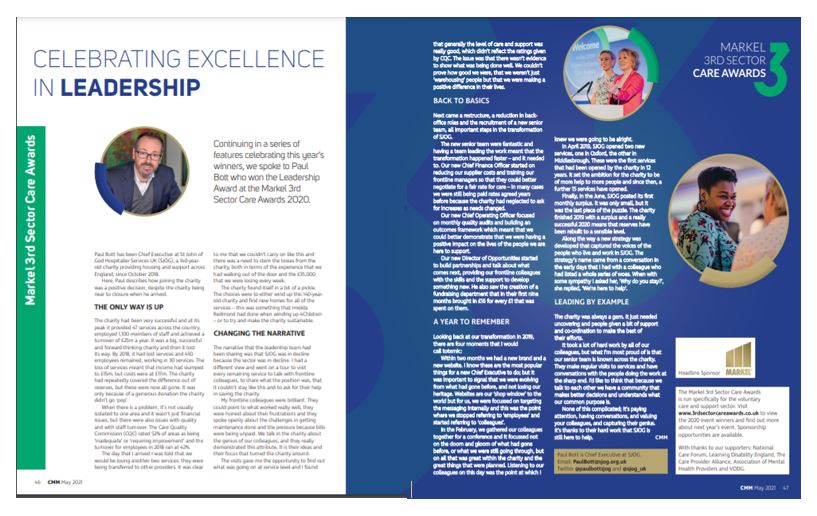
In a series of features celebrating winners of the Markel 3rd Sector Awards, CMM - Care Management Matters - spoke to Paul Bott, SJOG's chief executive, who won the Leadership Award 2020.
Read the full article here: https://www.caremanagementmatters.co.uk/feature/celebrating-excellence-in-leadership-2020-winners/
Proud to achieve ISO 27001 certification

SJOG have been awarded the internationally recognised ISO 27001 certification for the way we protect the data and information of the people we support, our colleagues and donors.
We’ll now be audited annually to ensure that our robust Information Security System (ISMS) continues to develop, and that our colleagues remain up to date on how to protect information, ensure confidentiality and prevent unauthorised access to the information we hold.
Marking World TB Day - 24 March 2021

Today, 24 March, is World Tuberculosis (TB) Day – marking the date in 1882 when Dr Robert Koch announced that he had discovered the bacterium that causes TB, which opened the way towards diagnosing and curing this disease.
To mark the day and raise awareness of TB which remains one of the world’s deadliest infectious killers, SJOG’s Olallo House in London is welcoming a special guest to its service – Professor Onn Min Kon who is head of the tuberculosis service at Imperial College Healthcare NHS Trust, as well as professor of respiratory medicine at the National Heart & Lung Institute, Imperial College London, and chair of the UK National Multidrug-resistant Tuberculosis (MDRTB) clinical advice service.
Professor Kon is going to be ‘volunteering’ in the service and at the same time giving us an insight into the world of TB treatment. (Follow our social media for more information!)
London is infamously known as the TB capital of Western Europe and accounts for around 36% of cases nationally. Rates of TB are highest among people with social risk factors including homelessness and especially among rough sleepers, who are more likely to be infectious and less likely to complete TB treatment. (Standard TB treatment lasts a minimum of 6 months and for multi-drug resistant TB, treatment takes a minimum of 2 years.)
The Department of Health recognised homelessness as a major barrier to completing TB treatment. To address this and meet this unmet need, Olallo House has, since 2011, been providing specialist medical, social and psychological support enabling homeless patients to complete their full course of TB treatment and address other issues that have contributed to their homelessness.
Please support Olallo's work:
As we mark World TB day and celebrate our work at Olallo House supporting some of the most vulnerable TB patients through their treatment and with the other complexities of their lives, we continue to seek funding to complement their TB treatment package. Please donate and help us to help vulnerable homeless people rebuild their lives: https://www.justgiving.com/campaign/SJOGOlallo
Celebrating Saint John of God Day - 8th March

Our inspiration to ‘do good’.
On 8th March, we celebrate the life of João Cidade, better known as Saint John of God, the charity’s founder. As a charity we follow his example to do good and continue to add new stories to his 500 year legacy.
Born in 1495 John dedicated his adult life to the care of the poor and the sick. Having experienced treatment for his own mental illness, he fought to change the practices of the day so that people were treated with love and compassion. He looked after people no-one else would and people soon followed his way - the Hospitaller way. This following grew into a worldwide movement and today health and social care services exist in over 50 countries.
SJOG is inspired by this drive to do good and every day we follow his example in our services throughout the country.
Happy Saint John of God Day to all!
Leadership Award Winner: SJOG’s Chief Executive, Paul Bott

The Markel 3rd Sector Care Awards celebrate the work of the not-for-profit sector. Finalists were short-listed in the autumn of 2020 and at a virtual ceremony on 12 February, Paul was named winner in the Leadership category.
The winner was announced by Liz Jones, Policy Director for the National Care Forum, who described Paul as ‘a determined leader, phenomenal and driven. And despite being faced with an enormous challenge, his relentless approach paved the way forward for change whilst also being a sensitive decision maker’.
A conversation with Esther Rantzen followed, where Paul talked about the work of the charity meeting need where we can, and in particular the growing area of need in modern day slavery; SJOG now being the largest provider of safe-houses in the country.
Paul paid tribute to the great people within the organisation who have contributed to ensuring its continued success. An inclusive approach embracing the genius of our colleagues is what makes the difference.
Esther concluded: “Congratulations on the extraordinary work you are doing and best wishes to your genius team.”
Introducing Magic Space..

.. a mobile word of sensory exploration
Sensory therapy is proven to be beneficial for people with learning disabilities and complex needs. Welcome to Magic Space - using new advancements in technology it creates sensory experiences in a virtual environment, and putting it on wheels so that we can take it anywhere we need – it’s magic!
Magic Space is a concept that we have been working on for several years. In 2020, the Covid pandemic and the need to shield vulnerable people in our care meant that access to traditional sensory therapies ceased. The need for Magic Space became even more apparent and in September 2020, The National Lottery (as part of the Covid Response Fund) granted the funding for the first Magic Space. Between then and December 2020, Magic Space was designed and coach-built to our specification and was delivered to us in January 2021.
This will enable us to deliver bespoke sensory experiences to meet the needs of people we support; combining technology and traditional sensory experiences and therapy, whether that might be calming, stimulating, for desensitisation, learning or for entertainment. The technology uses immersive virtual reality, projection, 360 multi-sensory experience including wind, scent, touch, sound and vibration.
When we conducted a pilot test in 2019, the people we support in Dalby View experienced a range of scenarios from being on a racing track to attending a pop concert. Staff and the people we support all said that Magic Space was “phenomenal” and “a game-changer”. “There is nothing like this - using virtual environments in a therapeutic way to improve quality of life outcomes is brilliant.”
SJOG’s IT Technician Awarded Apprentice of the Month

Awarded by Baltic Apprenticeships to Lee Wilson who is working towards his Level 4 IT Professional qualification at SJOG . Lee was nominated by SJOG’s Chief Finance Officer, Leanne Welford, who shared the ways that Lee has made an impact on the charity: “Lee has managed IT for SJOG for 2 years with minimal additional support. The charity has been through an extraordinary period of change and growth, supporting more people in need. During this time, Lee managed the transfer to Office365 and the move to fully cloud-based systems, supporting the introduction of a new integrated IT system across the charity.
Lee has approached his apprenticeship with enthusiasm and has grown in confidence and knowledge. This month, as well as winning apprentice of the week during training for his diligent approach to his studies, he has delivered amazing outcomes for us.
At short notice, Lee managed to source and set up 150 tablets for use in a new outreach service supporting victims of modern day slavery. This service will be critical in supporting extremely vulnerable people remotely in these difficult times. He also took a lead in arranging the entire IT infrastructure for the project, and ensured adequate connections would be available for our colleagues and the people we support. In addition to this, Lee saved the charity £70,000 by sourcing free software licences to support the project. This was an amazing effort, recognised by all his colleagues. Lee is well known for always being willing to help, to solve a problem, and to go the extra mile for the people we support. He is a valuable part of the SJOG family.”
Well done Lee!
Reproduced with permission of Baltic Apprenticeships
Yodel Delivers The Minims a Christmas Gift

A huge thank you to Yodel for their generous donation of £550 to The Minims, our service in Hatfield in Hertfordshire. Chosen as their local Christmas charity of the year by the Yodel Hatfield Transport Office, The Minims was the lucky recipient of the proceeds of a Christmas raffle amongst the Yodel delivery drivers. Photo shows Faye and Miggy from the Minims receiving the donation from Lisa and Diane from Yodel. Thanks to all for this great support!
The ‘Hospitality Leadership Torch’ is passed!

SJOG is delighted to announce a new chair for the charity. Emma Gibbons was elected at the meeting of the board on 10 December which saw Brother Donatus Forkan step down from the position after six years. This was quite a momentous occasion in the history of our organisation with this position being held by a lay-person for the first time.
At the board meeting, Brother Donatus’ final act as chair was to thank his fellow trustees for their support during his tenure in office. He also thanked the CEO, Paul Bott, and the other members of the Executive Management Team (EMT) for their hard work in turning the charity around during the past two years or so - quite an exceptional achievement. Brother Donatus also thanked the previous trustees and previous members of the management team, all of whom in their own way have contributed to the work of the charity down the years.
In congratulating Emma on her election as chair, Brother Donatus assured Emma of his full support as she assumes her new role and wished her every success and blessing in her work. “I am sure that Emma will lead from the front and build a team that shares the same vison and dream for the charity. This will ensure its fidelity to the long traditions and the legacy that has been passed on from previous generations of followers of Saint John of God. In this way the work of charity will go from strength to strength over the coming years. There is no doubt that this new chapter of the presence of Hospitality in the manner of Saint John of God in the UK will be exciting and effective in accompanying, serving more and more needy members in society and advocating on their behalf.” Brother Donatus Forkan, OH
Thank you to Scorton Buddies

People in our service in Scorton were delighted to receive a visit from Scorton Buddies coming with a delivery Christmas bags, full of biscuits, chocolates and shortbread. A perfect Christmas treat! Scorton Buddies is a local befriending scheme and has been a massive support to SJOG especially during this year of the pandemic. The philanthropy of the Buddies extends to the wider community of Scorton and is supported widely by residents of the village who donate books, dvds, toys for sale to others – a real community effort which supports local people in need of a little bit of kindness.
“We are so grateful for their kindness.” Thank you to Ian and all the Scorton Buddies from everyone at St John's Terrace - North Yorkshire Supported Living Services.
Helping others at Christmas
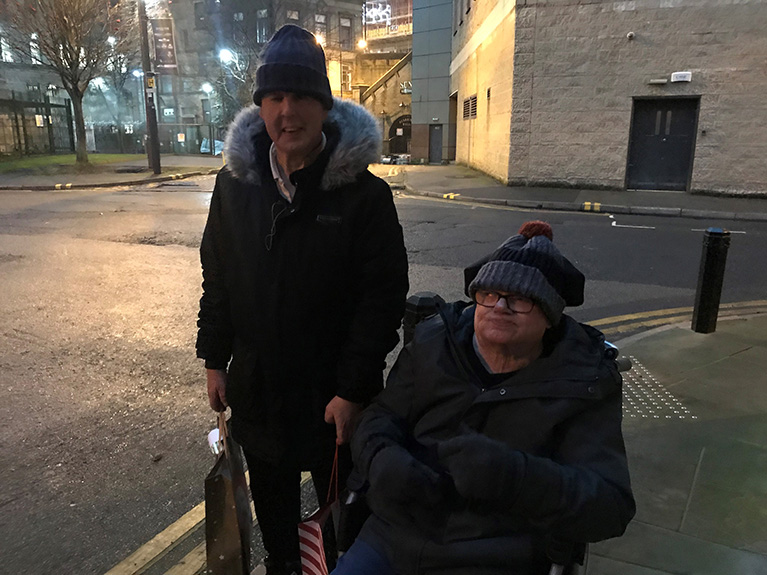
On a cold December night, Alex and Brendon from our supported living services in Bradford went out into Bradford city centre to hand out hampers that they and SJOG staff had put together for homeless people. It was a particularly cold night, but both guys were determined to go out and help others.
The four people to whom Alex and Brendon gave the hampers were over-whelmed and very appreciative of their gifts. With two hampers left to give, Alex and Brendon offered these as extra gifts or to maybe to hand to a friend. This offer was declined as they were alone and had no-one to hand the extra gift to.
“It was so humbling that these extra gifts weren’t accepted as they didn’t want to accept too much from us. Alex and Brendon are determined to get the remaining two gifts to people who need them so they plan to out again this week.
A massive thank you to Brendon, Alex, Katie and Adeena for their kindness and generosity, and giving up an evening at home in front of the fire to help others. I am very proud of them all."
Michella Sunderland, Service Manager – Bradford Supported Living Services
Paul Bott – Highly Commended Charity Leader of the Year

At this year’s North East Charity Awards, our chief executive, Paul Bott was highly commended for Charity Leader of the Year. This category was to recognise exceptional voluntary sector leaders who make outstanding contributions to their organisation or the wider sector.
Paul was commended for being instrumental in the regeneration of the charity since joining us in October 2018, and for making the charity vibrant again. Engaging the genius of all SJOG’s colleagues and trusting that they knew the answers to the problems we faced at the time, Paul channelled this energy and creativity to be ambitious for the people we serve.
Together we’ve rediscovered and reconnected SJOG’s purpose, which put simply is ‘we’re here to help’.
An Extra Special Christmas Tree

People at Lindisfarne Court, our residential care service in Darlington, decided to do something a little different this year and in addition to their usual Christmas trees, they have a ‘positive quote from each of the people we support Christmas tree’.
Each little label which adorns the tree has a lovely positive message as below:
From Mike: The beauty of Christmas lies not just in the date but in the feeling it gives.
From Peter: Wishing you love, health, happiness and inner peace all through and beyond this holiday season.
From Ronnie: What is Christmas? It is tenderness for the past, courage for the present, and hope for the future.
From Graham: The best Christmas gift is to realise how much you have already.
From Stephen: Christmas is not as much about opening presents as opening our hearts.
From Jack: The best way to spread Christmas cheer is singing loud for all to hear.
From Craig: Christmas is the season for kindling the fire of hospitality.
From Russ: It’s not what’s under the Christmas tree that matters, it’s who is around it.
From June: Keep your Christmas heart open all year round.
From Barry: A little more sparkle, a little less stress. This Christmas, I wish you the very best.
From Ebony: Are you part of the inn crowd or are you one of the stable few?
Happy Christmas everyone!
First Visitors to SJOG Visitor Pods
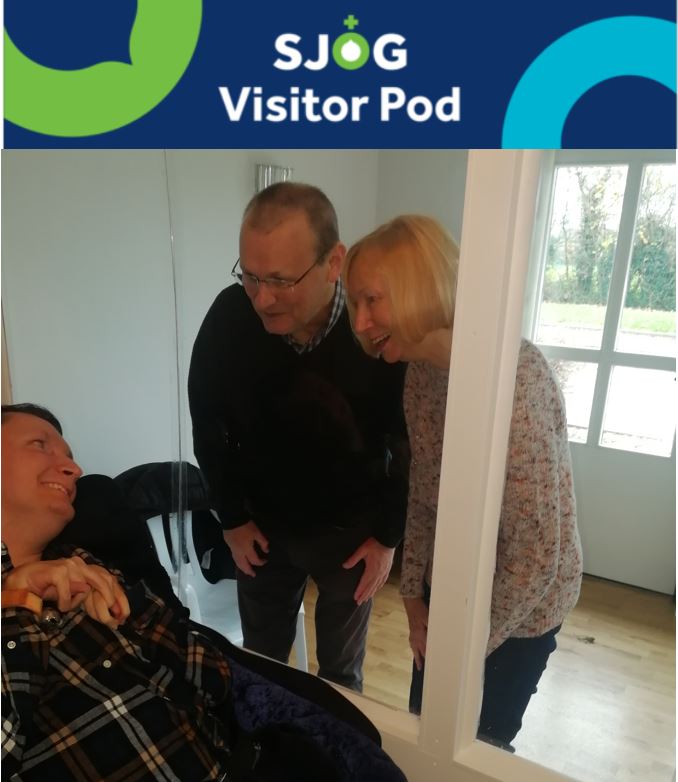
Graham lives at Lindisfarne Court, our residential care service in Darlington and like so many others during the pandemic, has so missed the visits of his family. Creating a ‘pod’ to keep everyone safe has meant visits can take place again and in the words of service manager, Amanda, “Graham was over the moon to see his parents today.” And likewise so were Graham’s parents, Jan and Ged who have badly missed being able to see their son.
“It was lovely to see Graham close up and for him to be able to see us with his limited vision. The pod was lovely and warm as well as safe and secure. We really appreciate the effort you and your team have made to enable us to visit Graham.”
More pods like this - safe spaces that separate visitors and people we support, are now being built in other services around the country to enable visits between loved ones to take place.
We are pleased to report that Terry Yorath House in Leeds is the latest service to announce the opening of ther pod and everyone there is looking forward to welcoming visitors once again.
Leading Effective Change in Charities: A Case Study
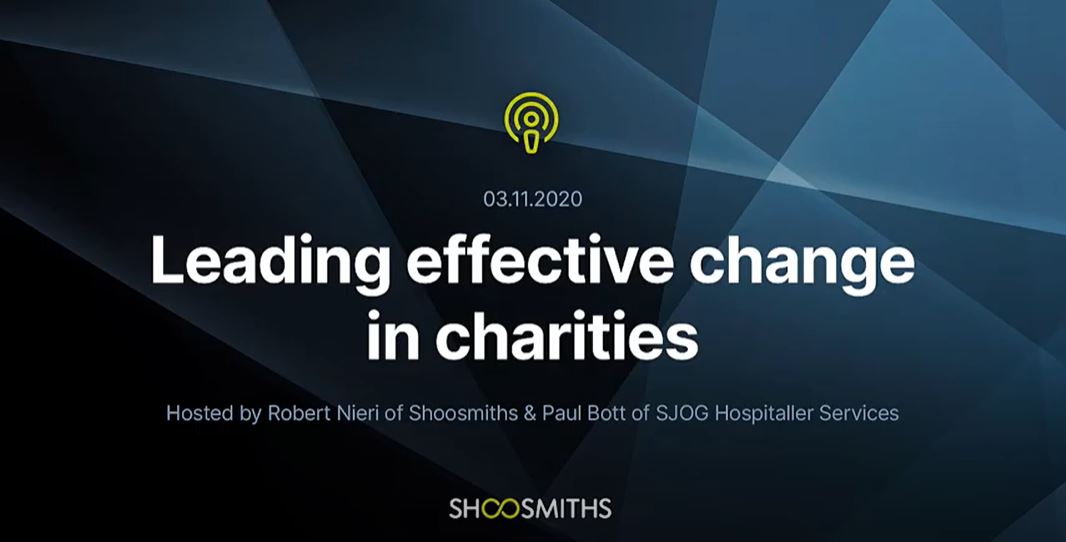
On 3 November Shoosmiths broadcasted, to a live audience, a conversation between Robert Nieri and SJOG’s Chief Executive, Paul Bott.
The wide ranging conversation covers the cultural and systemic changes that SJOG has undergone in the last two years; a transformation recently recognised by the award of ‘Change Project of the Year’ at the National Charity Times Awards and in receiving four nominations (including one award for Finance Team of the Year) at the Third Sector Awards.
Paul talks about the changes and the importance of using the genius of everyone involved in SJOG in achieving its turnaround. The importance of purpose, living our values of Hospitality, Compassion and Respect and what the future holds for the charity.
You can hear more here
Or access the recording through on Shoosmiths website here
SJOG's Finance Teams Wins Third Sector Award

At last night’s (7 October) Third Sector Awards ceremony, our brilliant finance team scooped the award for Finance Team of the Year.
Wendy Cotton, Technical Line Manager – Social Welfare, Markel announced the award: “The award went to a team who took time to understand all of the issues before implementing changes which were ultimately responsible for securing the long-term future of the organisation.”
The small team of eight - Leanne, Rachel, Jenny, Jo, Sam, Louie, Carole and Joan (and joined recently by Lynne) have been instrumental in transforming the financial health of the charity so that it can continue to change the lives of the people we serve. They have led on improving financial skills across the charity, putting tools in the hands of all of our staff so that we can evidence the impact of what the charity does.
Better evidence has meant improved relationships with funders, a financial modelling process that supports growth, and better decisions being made across the charity.
Leanne Welford, SJOG’s Chief Finance Officer said, “I’m delighted that the efforts of the finance team have been recognised by Third Sector this year. They’ve worked extremely hard, achieved some amazing outcomes and I’m very proud of them!”
Everyone at SJOG is very proud – they are a great team!
GEM – Going the Extra Mile Award for SJOG’s Karen Hannigan
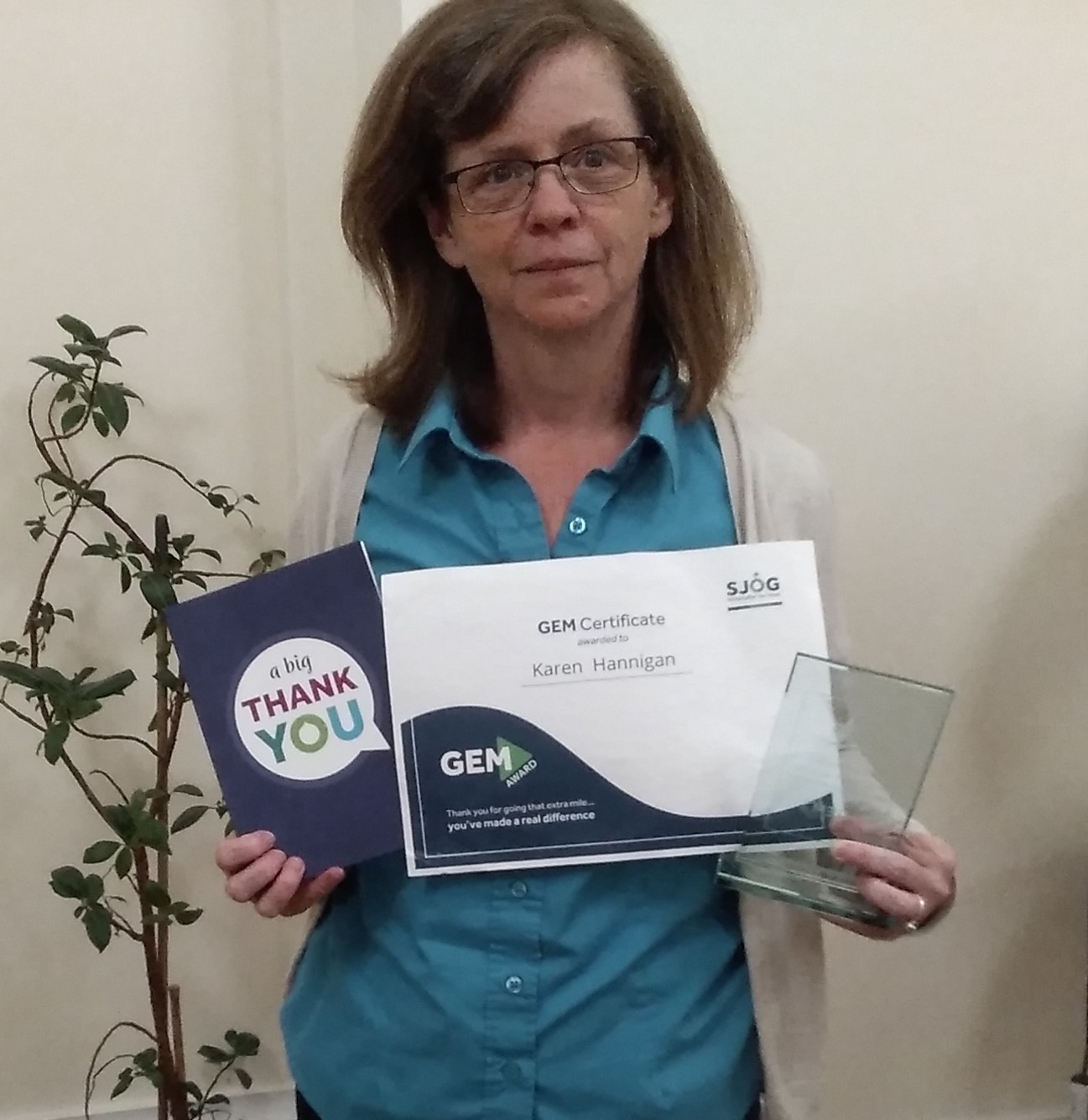
Acknowledging our colleagues who have gone the extra mile, we were pleased to present a GEM award to:
Karen Hannigan, Administration Assistant – St Paul’s Nursing Home, Selly Park
Nominated by Sylvia Hughes, Service Manager and Donna Moore, Deputy Service Manager for her above and beyond commitment, and not least for being the ‘main stay’ of St Paul’s during recent years with a number of changes in personnel. She’s the absolute ‘go to’ person and until Sylvia and Donna came on board, ‘owned’ their respective responsibilities.
“Karen has been the kindest most supportive admin person I have ever had the privilege to work with. She is often taking time out of her own roles and responsibilities to support all the staff in the home and also gets to know the sisters we care for personally which I have not found in an admin person before. She is always running around supporting everyone.
She is the oracle of knowledge, incredibly supportive both personally and professionally and in a service like St Paul’s is a breath of fresh air. She absolutely goes the extra mile (well more like marathon) to support everyone with patience, perseverance and passion.”
Well done and thank you to Karen.
SJOG signs Time to Change Pledge
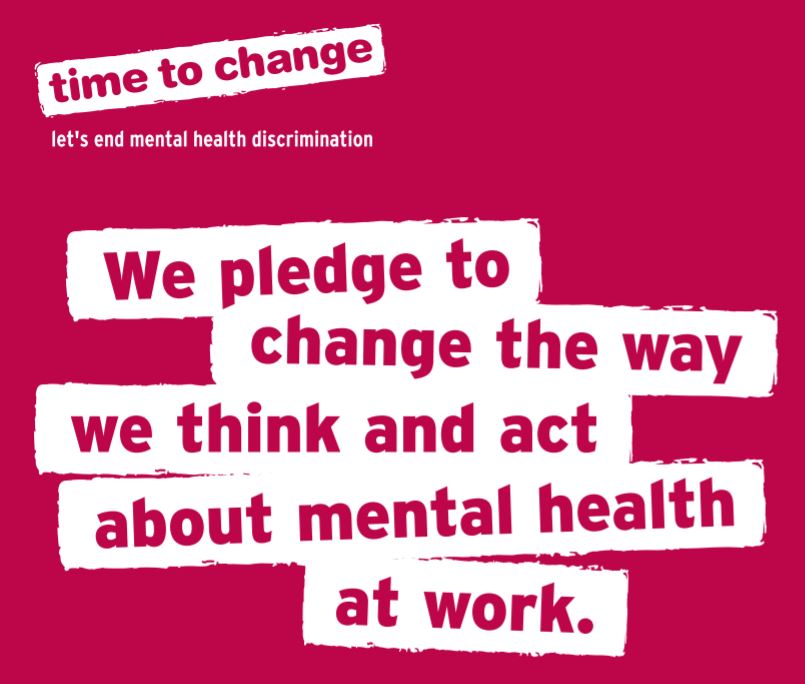
SJOG has taken another step in supporting our colleagues' mental health with the signing of the Time to Change Pledge.
The Time to Change Pledge commits SJOG and our 600 colleagues to ensuring that we provide a safe environment where mental health can be discussed openly without fear of discrimination. The pledge is not just a promise, but builds on the work that has been undertaken through training and developing Mental Health First Aiders and launched Bright Line with funding from BUPA – a dedicated confidential line provided by SJOG and run by our colleagues to offer signposting, advice and a friendly ear should people feel in crisis with their mental health.
SJOG already facilitates access to mental health counsellors and the next step is the development of a supportive mental health network within SJOG.
Paul Bott, Chief Executive of SJOG said, “With our core values of Hospitality, Compassion and Respect, it is only right that we support all of our colleagues, and both their mental and physical health. We know it can be hard to talk about mental health, but we want to encourage people to feel asking for help is seen as a sign of strength and not of weakness. We want to help to end mental health discrimination and are therefore very proud to sign up to the Time to Change Employer Pledge.”
Time to Change is led by Mind and Rethink Mental Illness.
SJOG shortlisted for ‘Charity of the Year’ in national award

The National Third Sector Excellence awards recognise the achievements of charities, voluntary organisations and social enterprises. SJOG has been recognised in four categories including the prestigious ‘Charity of the Year’:
- Finance Team of the Year
- Fundraising Team of the Year
- Charity Chief Executive
- Charity of the Year
We’re really pleased that the hard work of all of our colleagues over the past year has been recognised. To be shortlisted in one category would have been great, to be shortlisted in four (no other charity has more nominations) just goes to show the talent and dedication we have at SJOG.
The other charities and individuals named in the awards are an impressive bunch, with many household names. It’s an illustrious group to be a part of and to be picked out as a charity that is doing really good work is fantastic.
The awards will be announced over a two-day virtual event on the 7th and 8th of October.
Salvation Army and SJOG Working Together

Salvation Army and SJOG working together to support slavery victims through new five-year government contract
The Salvation Army has announced the appointment of SJOG as a specialist partner who will provide support to victims of modern slavery in England and Wales through the Government’s new Modern Slavery Victim Care Contract (MSVCC).
The Salvation Army and SJOG have worked together since 2011. This new contract will enable them to build on the relationships and expertise developed to further help survivors of slavery as they begin to recover and move on with their lives.
Major Kathy Betteridge, Director of Anti Trafficking and Modern Slavery for The Salvation Army in the United Kingdom Territory with the Republic of Ireland, said: “We are pleased to welcome SJOG, who have played a key role in helping us to support thousands of victims of modern slavery as they rebuild their lives, bringing important expertise and a shared passion to change the lives of some of the most vulnerable people in our society.
One British man supported by SJOG having been forced by a criminal gang into delivering drugs by threats of violence against him and his family said: “Throughout my time with St John of God on occasion I felt down and sad and instantly one of the team would cheer me up and make me think positively. Every day you help innocent people rebuild their lives.. Amazing people. Amazing service.”
For more information, visit www.salvationarmy.org.uk/modern-slavery and www.sjog.uk
SJOG awarded ‘Change Project of the Year’ Award

SJOG awarded ‘Change Project of the Year’ at the National Charity Times Awards
SJOG won the award because of the transformation from barely surviving to being a thriving, growing charity.
Award judges praised the significant cultural and systemic changes that have occurred over the past 2 years, and singled out Paul Bott, SJOG’s Chief Executive, for involving colleagues on the frontline in the change, and his ability to manage change effectively through good leadership.
The trustees appointed Paul in 2018, and on his arrival he appointed a new senior team, who together have transformed the charity by engaging front line colleagues, and giving them the tools they needed to solve the challenges that the charity faced.
The success has seen the organisation being clearer about its purpose and being more supportive of each colleague in the charity so that they can better support the people that we are here to serve. This has led to a 20% growth in both reach and income over the past year, and has developed the financial viability of the charity.
Paul said, “It’s great that the excellent work of all of SJOG’s colleagues has been recognised in these prestigious national awards. It’s a testimony to their hard work, and they have worked very hard indeed, striving to be of more help to the people that we are here to serve. We’ve made a really good start.”
Paul Forster-Jones, Trustee of SJOG said, “Hearty congratulations, this is richly deserved, entirely appropriate and a fitting recognition of a magnificent transformation. I’m hugely proud to be a small part of such a noble and high performing charity and I know I’m not alone.”
Care Work Hit By Immigration Changes

Article reproduced by kind permission of Ellen Teague and The Tablet:
The majority of vacant positions in care work are classed as low-skill - and therefore will not be open to many migrants.
“There needs to be a new political and financial settlement for care homes and domiciliary care which recognises the commitment and vocation of carers," according to Philip McCarthy, Director of the Caritas Social Action Network (CSAN). “The pandemic has shown just how much we rely on people to do this essential, but often unsung, work,” he told The Tablet this week, “and over the last months care workers have risked their own health and that of their families”. His hope is, "that the Government and employers will invest in the skills of care workers so that we can build a care system to be proud of.”
A new healthcare visa was announced by the government on 13 July, to be granted to NHS workers but not to social care workers. It will be within a new points-based immigration system which comes into force from 1 January next year when freedom of movement with the EU ends. The new system, says Home Secretary Priti Patel, will allow the UK to "attract the best and brightest from around the world". Frontline care home workers and contractors are excluded, and a minimum salary threshold means that many cleaners, porters and support staff will not qualify. People overseas will not be eligible to apply for a visa to undertake so-called ‘low-skilled’ work, including in social care settings.
Mark Wiggin, Director of Caritas Salford, has highlighted the situation of existing staff already here on low wages, such as a refugee who wants to bring their family over to join them under the visa scheme. “Currently there is a minimum income requirement of £18,600 plus £3,800 for the first child and then £2,400 for the next child” said Mr Wiggin; “so if you want to bring your two children in addition to your wife you need an extra £6,200, giving you a total income of £24,800”. He pointed out that, “the current government minimum income requirement would effectively prevent a family reunion taking place for low paid workers”.
Although residential care providers currently rely greatly on EU nationals to fill vacancies, the government feels that immigration is not the answer to the challenges in the social care sector. The majority of vacant positions will not be filled from immigration as these workers are not classed as skilled - and they're not eligible for the rebranded NHS and care workers fast track visa. Care workers won't be able to apply for a care-specific visa.
Paul Bott, chief executive of SJOG Hospitaller Services, a member of CSAN whose work includes residential care homes, told The Tablet this week he too would like more recognition of care workers of all nationalities. His organisation works in 35 communities across England, and employs 500 people, 63 of whom are non-UK nationals. “Whilst that’s just over 10%,” he said, “these colleagues are primarily focussed in London and the south-east, in our homeless service in Euston and our services that support people who have been trafficked or subject to modern slavery”. He told The Tablet that the diversity of languages spoken by staff is valued as many clients come from Eastern Europe and other regions prone to human trafficking. “We have some experienced people with specialist knowledge that can’t be replaced quickly or easily,” he reported, “and it is clear that for a period of time the level of knowledge and skills in key services will be less than it is now.” Training will be a priority.
The UK government is encouraging employers to invest in workers from within the UK, and Mr Bott reported that “At this point, we are not expecting there to be any workforce recruitment issues for us because of the recession we are facing, where we’ll see more people becoming unemployed”. He told The Tablet that the pool of potential workers for social care projects is likely to be greater post-Covid, reflecting that, “It’s sad that we need to wait for the economy to struggle before we can fully staff though.”
Andrew enjoys a taste of his outreach service again

In recent months, due to the restrictions put in place to tackle COVID-19, many of the people we support have had to stop outreach services and actiivities which were both enjoyable and part of their weekly routine. Andrew from Brentwood, our supported living service in Leyburn found himself unable to go to Chopsticks, an outreach service dedicated to giving people with disabilities opportunities they wouldn’t otherwise have. He really missed the interaction opportunities the service provides.
Recently however, Andrew was overjoyed by a visit from the Chopsticks’ team. He was delighted to see them and he also received some craft supplies for activities to do at home.
Andrew will hopefully be back at Chopsticks soon enough, however, in the meantime, we are glad he can still access their activities and support while at home at Brentwood.
Thank you to Chopsticks for their support!
Richard leads the vocals
Five of the people we support in our services in Enfield have taken part in the Sing Out Choir with a unique and wonderful cover of the Beatles’ Hey Jude, with SJOG’s Richard Armstrong leading the vocals. Sing Out Choir is an inclusive choir for adults on the autism spectrum or with a learning difficulty, based in Enfield, North London. Not all members have access to the internet, so home visits were made to record all their choir members singing at their doorsteps to feel connected again. “The feeling of shared excitement has kept many of us going over the past weeks. We strongly believe singing is one of the best ways to feel relationship and feel socially connected to each other. Sing Out Choir members deserve recognition for their incredible efforts and optimism at the saddest of times, despite needing to shield at home for months.” Camilla Farrant, Choir Director
Click here to listen: https://youtu.be/nJQjXkWsT9c
New SJOG team in Brighton supports victims of trafficking
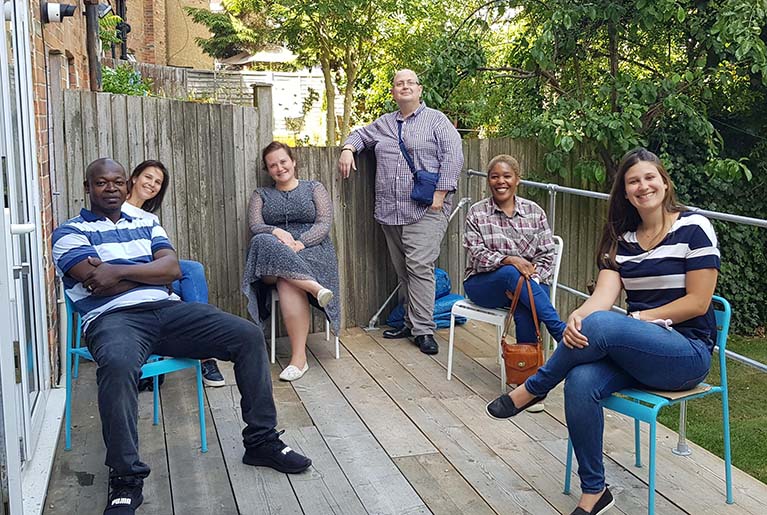
SJOG’s work to reach more people who are victims of modern day slavery and trafficking continues with the opening of a new service in Brighton, and continues our partnership with The Salvation Army. The team working over three houses will provide care and support to help the recovery of those who have suffered extreme psychological trauma as a result of modern day slavery or trafficking.
Best wishes to them all and welcome to the SJOG family.
Photo shows from left to right:
Fabrice Akpro - Project Worker, Bianca Guerra - Bank Project Worker, Kasia Lois - Team Leader, Miguel Neves – National Lead Homeless and Modern Day Slavery Services, Sarah Mutesi – Bank Project Worker, Giovanna Cabral – Project Worker
Goodbye Fred - you'll be missed
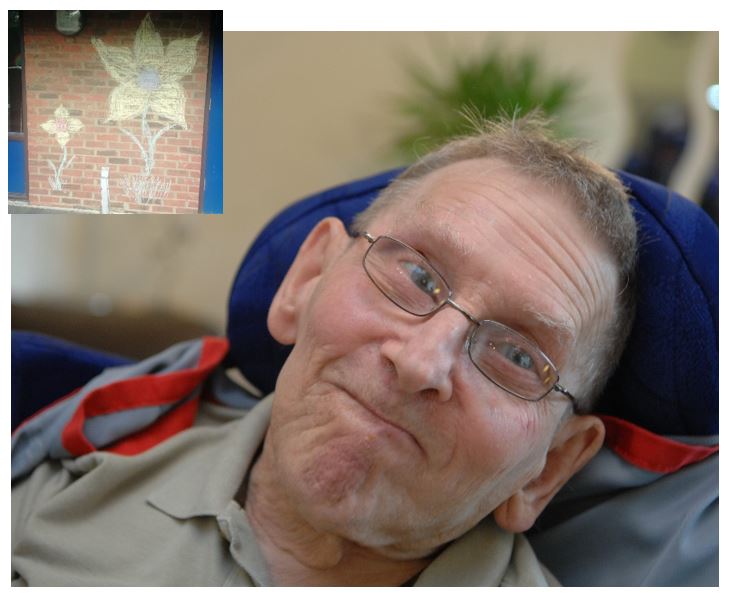
SJOG’s service, Lindisfarne Court in Darlington, has lost a long-standing resident of the home – Fred (Freddie) Nicholson. Fred had been at Lindisfarne since it opened 28 years ago, in 1992. He will be missed massively. Fred was 86 and had been poorly for just a few days. He knew that he was on end of life care and his wish was to be at home at Lindisfarne to be with his SJOG family. The team made every effort to carry out his wish but alas Fred was too weak to come home. He had time with the people who had supported him for so many years at SJOG, together with his sister, and was in peace as he passed.
Fred’s death was not Covid-19 related, but strict visitor restrictions due to the virus were in place throughout the hospital meaning not all of the staff team were able to see Fred during his final days in person but managed to do so using FaceTime. The outpouring of love from everyone at Lindisfarne was very evident and we are sure that Fred knew how much he meant to the entire team and all the other residents who he shared his home with.
Fred loved daffodils and in his memory, Lindisfarne was duly decorated with daffodil art in honour of him.
Rest in peace Fred.
Donation Funds Remote Assistance Model

People who are street homelessness and victims of modern day slavery have been particularly affected by the implications of Covid-19.
To meet their needs during this time of social distancing - and help them move on to more stable independent living - we’ve had to think differently about how we provide support, and thanks to funding provided from the City Bridge Trust (part of the London Funders Network) we are now delivering our innovative ‘Remote Assistance Model’.
RAM will see the introduction of tablets and other items of everyday technology to our London-based safe houses, allowing us to keep in touch with each person we support, face to face, but remotely. The quality of support is maintained but the risk of infection to the people we support, and our colleagues providing the support is reduced.
This further step into digital health provision, and the use of secure videoconferencing with partner organisations, including the NHS, will also enable us to continue to support people with the treatment of their infectious diseases like TB.
We think this is an exciting step, and will be closely monitoring the impact of this new approach on both the outcomes of the people we support and the operational benefit it brings, with an aim of replicating this model across the country.
SJOG’s Service in Leyburn
#ClapforCarers
Last night (Thurs 30 Apr) the local fire brigade in Leyburn, North Yorkshire, arrived at Brentwood our supported living service, to clap for carers. Well done and thank you to everyone across our services and to all key workers across the country.
Alex and Brendon make headlines in the Telegraph & Argus

Not only have Alex and Brendon been raising money as part of the 2.6 Challenge they have also been making headlines and appeared in the Telegraph and Argus today [Tuesday 28 April]. Article reproduced below courtesy of Tim Quantrill, Chief Reporter of the Telegraph & Argus:
Bradford people have been pulling out all the stops to help raise funds for charity in their own 2.6 challenges.
There are many events taking place as part of the 2.6 Challenge to raise vital funds to help to support the UK’s charities in these difficult times. Events are taking place to replace what would have been the London Marathon last Sunday, April 26. The activities had to be based around the number 26 or 2.6 - the former is the length of the marathon in miles.
Among those taking part were service clients of Bradford Supported Living with Saint John of God (SJOG) based in Clayton, Bradford. SJOG is a charity who supports adults with physical and learning disabilities to live as independently as possible in the community.
Their aim is to wash 26 cars in six days and raise at least £260.
Service manager Michella Sunderland said: "We have two tenants that live at the home who are completing this with the help of staff.
"We are going to be doing this daily until next Saturday. If we reach the 26 car limit and there are still cars that need washing we will wash them to help raise as much money as we can for SJOG who are a registered charity."
They had raised £122 by washing cars on the first two days and Michella added: "It's going really well. It's keeping people busy and motivated.”
Online article at: www.thetelegraphandargus.co.uk/news/18408866.bradford-fundraisers-step-2-6-challenges/
Alex and Brendon take up the 2.6 Challenge!

Alex and Brendon of SJOG’s Bradford Supported Living have come up with a great initiative to be part of the 2.6 Challenge! They are going to wash 26 cars over 7 days - Sunday 26 April to Saturday 2 May from their home at Oakleigh Road in Bradford.
People are invited to book a slot by calling 01274 889079 or 07950 840956. And to keep everyone safe they can leave their car safely on the drive and watch from the wall of the garden or leave their car and return in 30 minutes - to find a shiny clean car on their return.
There will be a donation bucket on the drive or people can give via SJOG’s Just Giving page at: https://www.justgiving.com/saintjohnofgod
More information can be found at: www.sjog.uk/twopointsix
Taking on the 2.6 Challenge

The 2.6 Challenge is a UK-wide fundraising event taking place from 26 April 2020. This date should have been the London Marathon, one of the world's biggest one-day annual fundraising events. The 2.6 challenge is designed to help charities continue being there for the people and causes they exist for, by doing something fun and creative in a socially responsible way.
No matter your age, ability or talents there are so many ways to get involved:
- Set yourself an activity based around the number 2.6 or 26*
- Head to twopointsixchallenge.co.uk to donate £26 – or whatever you can afford – to Saint John of God Hospitaller Services or to set up your own JustGiving fundraising page
- Share a photo or video of your challenge on social media with #TwoPointSixChallenge and tag SJOG so we can celebrate too!
*The only requirement is that you must follow Government guidelines on exercise and social distancing.
For more information to to: www.sjog.uk/twopointsix
Please support SJOG and help us to meet more need: more people who are homeless, more people who have been trafficked or victims of modern day slavery, more older communities and more people with physical and learning disabilities. We are ambitious to be of more help to more people. Please support us.
Thank you.
We’re in this together

Every day we see, hear or experience some of the real positives happening during this unprecedented period of social isolation and dealing with a world pandemic. Not least is how people and communities are working together. “Today [17 April 2020] our care home in Leeds – Terry Yorath House, which is home to 12 people, received a supply of face masks supplied by some Chinese students from the University of Leeds. This isn’t the first time and today we received another 200. We are so grateful!” Anthony Beech, Service Manager.
We have different mountains and rivers but we share the same sun, moon and sky.
Proud to work for SJOG

I'm Emma Porritt, Deputy Operations Manager in the North and started my journey with SJOG and in health and social care in 1998, and I have been part of the roller coaster of health and social care since then, both as a support worker and a manager. I have been part of and witnessed some amazing events hat have changed people’s lives for the better or have just supported people through some really tough times. I have always known the people we support are special and they have never ceased to amaze me with their pure lust for life. I have witnessed our people be told ‘no' or ‘you can’t do that because …..’ Do they listen? No they do not! With the help from our amazing support staff they will always achieve what they set out to do even if it looks a little different than first expected.
Over the past few weeks [since the outbreak of Coronavirus] I have been lucky enough to watch our support teams in action, work alongside them, chat to them and watch as they do the most unbelievable and very often un-thanked tasks for the most at risk in our society.
In the background, the support services are also doing their bit to keep everyone safe and make sure we can continue to deliver a high-quality service to people and for that I am thankful that we have a management team that cares. But back to the front line ..
SJOG is not like other organisations (that’s my opinion and if you know me you’ll know I am right ). The LOVED (living our values every day) programme is at the present time key to all we are doing. I have always known our support teams were good but I have never witnessed commitment from support workers that I am seeing at the moment and in my 22 years with SJOG this is the proudest I have ever felt to call myself a member of SJOG.
So to you front line staff keep doing what you are doing because you are truly special people, whom we all could not be prouder of.
Homeless and sick. Now what?
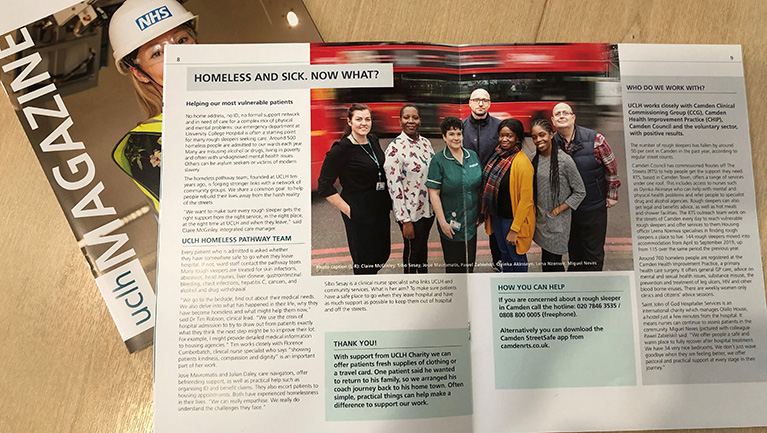
Homeless and sick. Now what? This was the headline of the article that appeared in UCLH’s (University College London Hospitals) February issue of their newsletter, addressing the huge issue homeless people face, particularly those rough sleeping. SJOG’s service at Olallo House features in the article in terms of their close partnership working alongside UCLH, Camden Clinical Commissioning Group, Camden Health Improvement Practice and Camben Council to provide a pathway of care for homeless people when they are discharged from hospital.
Click here to read the full article: https://sjog.uk/pdf/UCLH-Issue10-Feb-2020-Olallo-article.pdf
Photo shows colleagues from the Pathway Team including SJOG’s Pawel Zabielski, Service Manager at Olallo House (back) and Miguel Neves, National Lead for Homelessness and Modern Day Slavery (right)
Dalby Celebrates its Good CQC Rating
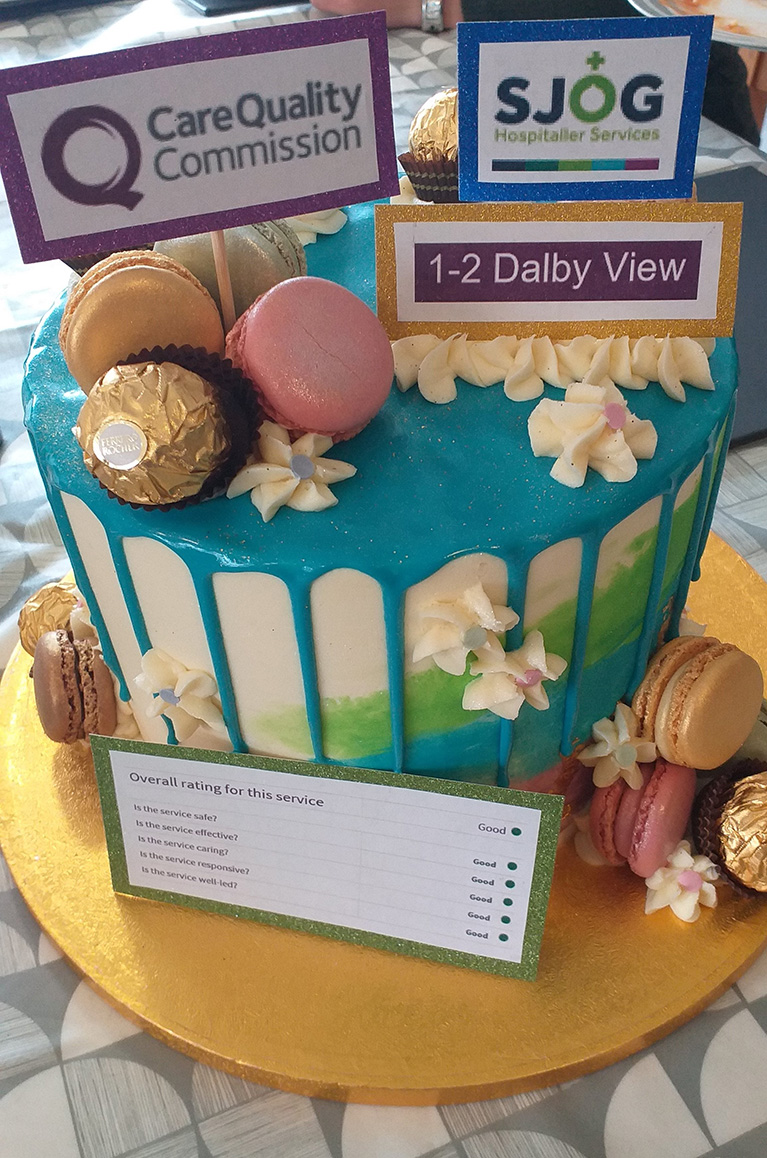
Our colleagues and people we support at Dalby View celebrated the overall ‘Good’ rating from their recent CQC inspection with a particularly well-decorated cake, made by the newest member of the staff team, Jodie Brodie-Myers.
‘Good’ was achieved in all five areas that look at: is the service safe, effective, caring, responsive and well-led.
Dalby View in Coulby Newham, Middlesbrough is one of SJOG’s services in the North East and supports people with physical disabilities who require 24-hour support.
We’re guessing the cake didn’t last too long. Well done everyone at Dalby View!
Community Kickstart Programme Launched
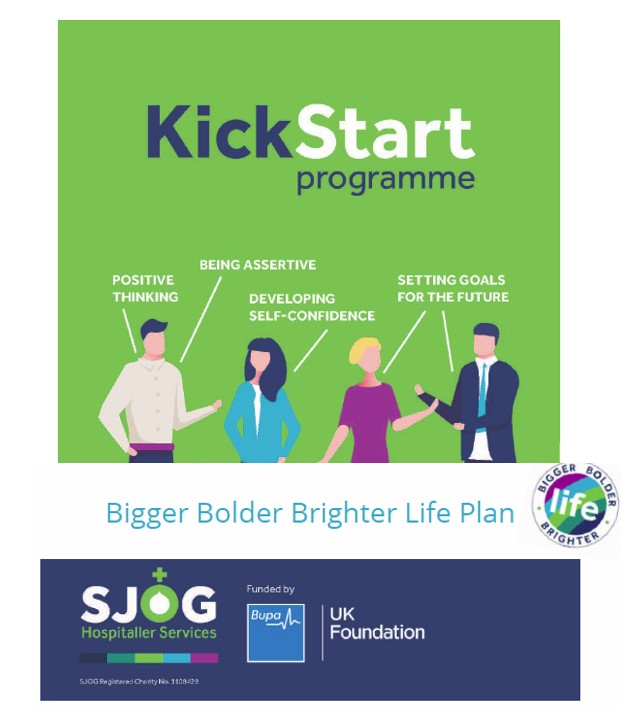
SJOG has been awarded funding from BUPA UK Foundation to deliver a confidence and well-being programme for people aged between 30 and 50.
‘Community Kickstart’ is specifically designed for people aged between 30 – 50 who are feeling ‘in a bit of a rut’, and is based in Woodhall Community Centre in the Peartree Ward of Welwyn Garden City and is free to attend. It teaches positive thinking, developing self-confidence, being assertive and setting goals for the future. It enables people to develop ‘Bigger, Bolder, Brighter Life plans.’ We hope that people make friends along the way too.
Starting in March 2020, the programme is delivered over four half days and people can enrol anytime in the next twelve months.
If you are interested and would like to find out more, please email: communitykickstart@sjog.org.uk
UNISON’S End Violence at Work Charter

SJOG has signed up to the Unison End Violence at Work Charter.
We recognise that our colleagues work with people who can express themselves physically, even aggressively. Our work in supporting people should not place our colleagues at risk of violence.
UNISON surveys of people working in the community sector consistently find that almost half have experienced an incident of violence or aggression at work. UNISON believes that violence must not be part of the job.
We’ve been working with UNISON to ensure that we have monitoring, support, safeguards and training in place to protect our colleagues, and with UNISON we agree that these are measures that every employer should be able to deliver.
Paul Bott, SJOG's Chief Executive commented, “To qualify for the UNISON Violence at Work Charter mark we had to meet standards that show that we are serious about protecting colleagues from being assaulted as they carry out their work.
AT SJOG we work with people who are on the edge of society. We have fantastic colleagues who work with compassion and hospitality in difficult situations, but it’s important that in helping others they do not put themselves in harm’s way. This charter mark highlights that we have the structures, the support and the training in place to safeguard our colleagues.”
Dalby’s New Fire Warden

“I’m very excited to be taking an active role in the fire safety at Dalby View.” David who lives at our residential care service at Dalby View near Middlesbrough has recently completed his training and is now fully competent in maintaining a safe environment for all at Dalby.
David ‘s responsibilities include completing weekly checks for emergency lighting and the fire alarm, and daily checks that fire exits are clear, as well as taking part in regular fire drills.
“Fire safety is something we should all take very seriously! I will do my best to ensure that everyone is safe and offer suggestions to ways in which it could be improved.”
Olallo House re-opens

Seven months ago, Olallo House, where we provide services for people who are homeless or who are victims of trafficking or modern day slavery, was flooded as a result of a burst mains water pipe. Everyone had to evacuate the building and 33 people for whom Olallo was their home were accommodated and supported in local hotels. During this time the building has undergone repair and a substantial renovation, taking advantage of the building being empty.
This week saw the re-opening of Olallo and people returning to a much-enhanced living environment conducive to them re-building their lives. There are many people we are grateful for making this happen and not least our colleagues and volunteers at Olallo who have worked so very hard from the date of the flood on 8 June to now, mid January. Olallo House is ready again to be part of transforming the lives and care outcomes of some of the most vulnerable people in London and beyond.
A celebration of the opening took place on 23 January giving supporters and funders an opportunity to see for themselves the building's transformation.
Our latest GEM (going the extra mile) award

SJOG's GEM awards were launched last year as a way of acknowledging and saying thank you to our colleagues for going the extra mile in the work that they do. We award them each quarter and the hard decision is made by a ‘GEM panel’ represented by all areas of the charity. We had nominations for a number of people and all were so very deserving. It was however Diane Akers who won December’s award. Diane works in our Intensive Housing Management Service in Enfield which provides support to people to enable them to manage their tenancy and live independently.
This is Diane’s story as told by her manager: “Diane, when visiting a person we support with housing, discovered the gentleman in a very poorly state due to not receiving his support from care providers.
Diane visited to carry out a health and safety inspection and was concerned that there was no response from the property. Instead of leaving, Diane had a gut feeling and made extra effort to see if the gentleman was in the property. She managed to gain entry to find the gentlemen showing signs of hypothermia, was becoming incoherent and was sitting smoking in an extremely drowsy state. This gentleman had been without electricity and gas for 2 weeks and had been sitting wrapped in a duvet.
The gentleman had been in hospital after a fall but had no recollection of where, or how he ended up in hospital, which hospital or for how long he was there. He had no food in his home. Diane left and brought 2 thermos flasks, filled one with coffee and one with soup and returned to stay with the gentleman. She also sorted out his electricity.
After finishing work and making sure her children were looked after, returned to perform a welfare check on him.
If it had not been for Diane’s actions, I believe we would have been dealing with an avoidable death.
Diane went over and beyond the expectation, and showed all of SJOG’s values. I have met the gentleman since the incident and his appreciation and thanks cannot be understated. He fully understood that Diane’s intervention was vital.”
A big thank you to John Lewis..

.. for making Christmas very special for some of the people we support in our supported living services in Hertfordshire and Enfield. SJOG’s housing management team was contacted by John Lewis to ask whether they would like a Christmas feast and party providing for the people we support. The answer was of course, ‘yes please’.
People enjoyed a three-course meal and drinks – food by Waitrose, cooked and served by staff from John Lewis - in the banquet hall in the local John Lewis store.
For some of the people we support who live independently in supported tenancies, this may be their only Christmas dinner and a real highlight of the year, particularly for those who do not have any family to spend the Christmas period with.
John Lewis’s generosity extended to giving a Christmas tree, lights, decorations and games. It was a very special day and really did “give a little more love this Christmas.”
New Apprentice at SJOG’s Head Office

Robert Mooney has recently joined SJOG in a new role for the charity: junior content producer. A large focus on Robert’s role will be around our social media presence and producing videos to provide more accessible information for the people we support.
Robert has studied journalism at Leeds Trinity University, focusing on two major pieces of work, including his public affairs portfolio and dissertation on issues around neurological and developmental conditions. These projects have given him the grounding for some of the work he hopes to get involved with at SJOG.
For many years, Robert has had an interest in content and media but also social and political issues. As a social issues correspondent for Shout Out UK, an independent news network and political literacy training provider, working for a charity which helps people who need support was important to him. While at Shout Out UK, Robert wrote about topics from zero-hours contracts to the challenges of higher education for those with disabilities.
“Having volunteered for a number of years, including as a member of Flying High, a group of young people with disabilities representing others in North Yorkshire similar to them, and also having epilepsy and hydrocephalus myself, I have a keen interest in the charity and its aims. Having previously been a team leader for vInspired (an independent charity dedicated to helping young people volunteer in their local communities), campaigning on a number of social issues, I am pleased to be bringing these experiences to a new role at SJOG. I’m looking forward to contributing positively to SJOG and working independently carrying on what I’ve done at Flying High in recent months and standing up for the voices of those we support through my role as junior content producer.”
Celebrating International Volunteers Day

5 December 2019 is International Volunteers Day, and not only are we acknowledging all the wonderful volunteers we have working throughout our services, we're appealing for more. Staff from our Enfield services attended a local event celebrating how valuable volunteers are, especially for charities and care organisations, and letting people know about the wide range of volunteering opportunities we have at SJOG - from supporting people with activities to hosting a health drop in, helping with IT or helping out in local offices with administration. Or if you like the outdoors, our community gardening project in Welwyn Garden City is the perfect place. For more information go to the volunteering section of our website or call 01325 373700.
Christmas has arrived at Digswell!

Digswell Community and Gardening Project in Welwyn Garden City is a unique space in Hertfordshire that provides people with opportunities in both garden related activities and social resources in the community. If you're local it's definitely the place to buy your Christmas tree and other lovely Christmas gifts. Digswell's Facebook page has lots more information https://www.facebook.com/digswellcommunityandgardeningproject/
"I saw myself in that container"

The death last month of 39 Vietnamese people in a truck that was trafficking them into the UK had particular resonance within SJOG. Our services for victims of trafficking and modern day slavery across the country include a specific service in the north east for Vietnamese people. All but one currently living in the house arrived here in the UK in a similar way – in a container lorry.
Some of the people in the service wanted to share their stories and working with our partners at the Salvation Army we’ve enabled this to happened.
Mr Nam (not his real name) told his story to journalist, Zoe Conway, which appeared on BBC Radio 4’s Today Programme on 5 November. His story can be heard at: https://www.bbc.co.uk/sounds/play/m0009zbd until 3 December 2019; (starting at 2.39 and finishing at 2.46). Available until 3 December 2019.
Mr Nam, a young man in his early 20s, desperate for money, turned to a gang for help. The result was a harrowing journey in the confines of a box that took him from Vietnam to the Netherlands where he was put to work on a cannabis farm. After a year, he was then taken by the gang, transported once more in a container, to the UK, again having to work on cannabis farm, working sometimes more than 18 hours a day. He eventually escaped and was cared for by the Salvation Army and is now supported by SJOG where he is beginning to rebuild his life.
Halloween Haunts at SJOG

Pictures speak louder than words and definitely so at Halloween. Thankfully there was no competition as to the scariest outfit, spookiest decorations and spectacular pumpkins as there were too many to choose from, but without doubt, many of the people we support and who work for SJOG had a great time making Halloween special.
SJOG Marks Anti-Slavery Day - 18 October
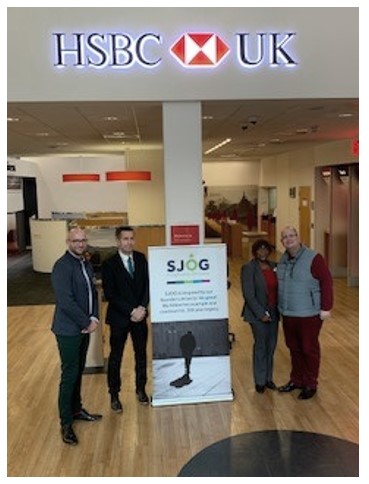
On Anti- Slavery Day – 18 October, representatives of SJOG were invited to increase awareness in one of the local HSBC branches. Miguel Neves, National Lead for Homelessness and Modern Day Slavery and Pawel Zabielski, Service Manager – Olallo House, had the opportunity to speak about modern day slavery, SJOG’s modern day slavery and homelessness services and the legacy of Saint John of God with the staff and the bank’s customers. Why HSBC? Prior to HSBC’s Survivors’ Champions Scheme, the process to open bank accounts by people who had been trafficked was almost impossible, especially without ID. Even with ID and supporting letters, some banks were still refusing the accounts.
A guest we supported in our safe houses, was one of the very first HSBC customer taking part in the piloting programme. We had tried for many months to support this person to open a bank account to enable him to receive income from the Job Centre. When HSBC started the pilot and we approached them, there was a lot of kindness and openness from the staff. The process had some challenges and barriers but there was a lot of willingness from the HSBC staff to overcome any issues. One day the person returned to hostel with a huge smile on their face and said “Finally! We did it! We opened the bank account.”
Since HSBC has piloted the survivors accounts, many of our guests have been opening accounts with them, with little if any issues, and with a great cooperation between HSBC Champions and SJOG staff. This had a huge impact on our guests’ recoveries. Even, if some do not have any income, they are happy that they have a bank account as a member of our modern society.
HSBC has also reviewed and rewrite their policies to include the individuals with NFA (No Fix Abode)
HSBC is the champion not only providing the services to the survivors but also to an underserved population. Pawel Zabielski, Service Manager, Olallo House - SJOG
SJOG Nurse Nominated for Lifetime Achievement in Care Award

Rose Hayes, a registered nurse at Henry Nihill House has been selected for the final for the Lifetime Achievement in Care category in the National Care Awards 2019. Rose has been a nurse for over 50 years and at Henry Nihill House for 34 years.
Commendations about Rose have been numerous and much deserved, and can be best summed up by the Rt. Revd. Dame Mary Therese Zelent, Mother Abbess of the Community of St Mary at the Cross: “As a colleague working alongside us, we have great admiration and respect for Rose, for her knowledge and professional skills, and her calming manner, and absolute loyalty. To this day Rose is dedicated and committed in her care of our residents to enhance the quality of their lives, a good friend and loyal colleague.”
Henry Nihill House is a registered nursing home for older people which SJOG manages on behalf of the Community of St Mary of the Cross.
This isn’t the first time Rose has been recognised for her achievements – in 2013 the London Borough of Barnet presented Rose with an Excellent Care Award, in appreciation of her dedication and professionalism.
All finalists will meet with two independent judges for each category on 11th October at the Awards’ Judging Day at the Hilton London Metropole. And winners will be presented with their trophies at the high profile Gala Night held on Friday 29th November at the Hilton London Metropole attended by over 700 guests. Well done Rose and good luck on the 11th.
Recognising those who Go the Extra Mile
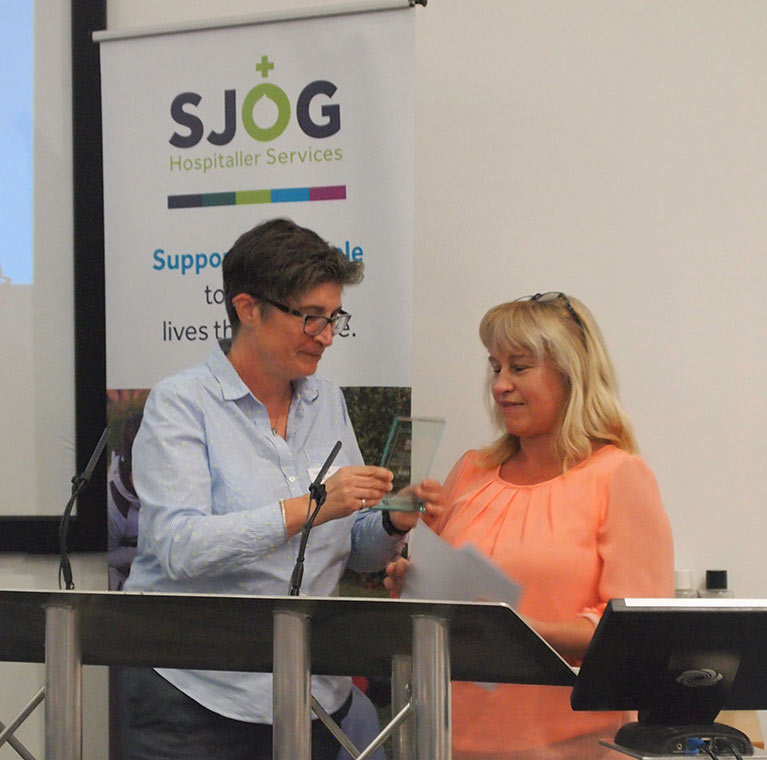
There are lots of occasions when we see our colleagues go that extra mile for the people we support and we wanted a way to acknowledge this and to say thank you. In September at our staff conference we made our first GEM awards. The first of these went to Bernie Concadoro. Bernie works at SJOG’s Resource Centre in Enfield, which provides a range of day services within the centre itself and out in the community that enable people we support to enjoy activities and leisure outings they enjoy. Bernie was nominated for the award by Laurence Lévy, Operations Manager for “not just going the extra mile, but for going the extra marathon and for her outstanding and longstanding commitment to the service, for doing all she does without the need to be asked and her passion to make sure the service we give to the people we support is the best it can be.” It was a truly well-deserved award and received most humbly by Bernie who acknowledged that, ‘she was not alone’ in giving a whole-hearted commitment to the service.
The Big Idea

Over 100 colleagues from across SJOG came together to work on a series of Big Ideas.
The gathering was led by Dr Jamie Mackrill, SJOG’s Director of Opportunities and Kate Ainscough from Freestyle Innovation. The theme of the day was Bigger, Bolder, Brighter and set the challenge to 12 groups to find ways that SJOG could be of more use to more people by being cleverer about the way we currently deliver services, or through new bold initiatives.
Jamie said that, “Lots of great ideas were generated on the day and we’ll be working over the coming weeks to develop these ideas through to implementation.”
But the last word has to go to Kate who said on twitter @AinscoughKate, “So I laughed and I cried today. Thank you @Jamiemackrill1 @paulbottsjogfor having me. Your team and their work is amazing. L.O.V.E.D.”
Enjoying a new activity

When the people who we support in our service in Coulby Newham put on their ‘ideas board’ that they wanted to go swimming recently, SJOG support team, together with the staff from the local leisure centre, made it happen. This required some forward planning to accommodate Alan’s, Emma’s and David’s needs but it was well worth it. They had an amazing time and have been again several times since. Support teams in our residential and supported living services are continually encouraging people to come up with ideas that could improve their lives and make them happy. These ideas are put on an ‘ideas board’ in each service, and wherever possible, we like to make it happen for people.
Reflecting on SJOG
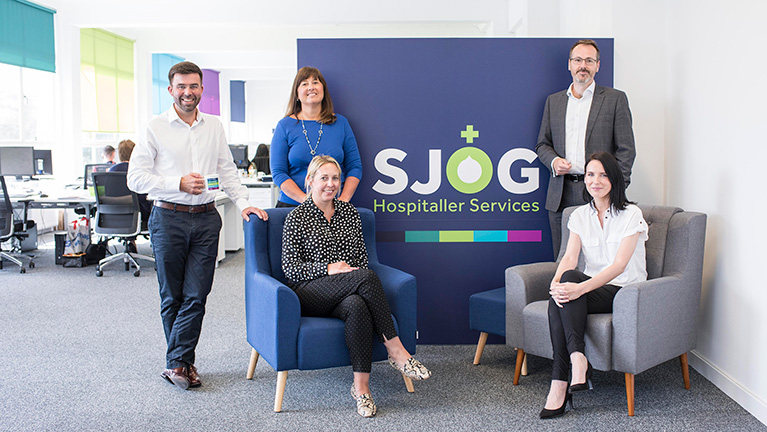
Nine months have passed since the appointment of an entirely new executive team at SJOG. During this time the charity has enjoyed a period of growth and renewal. “We’ve refocused, rebranded, and restructured the organisation. We have a good plan and good people delivering on it.” Paul Bott, Chief Executive.
Recruitment of the team was done with the help of UNW’s Strategic Talent service. Peter Neal and Laura Dean from UNW visited the SJOG’s offices in Darlington recently to reflect on the recruitment process and the success of the team.
Click here to view UNW’s news article: https://www.unw.co.uk/news/sjog-recruitment-unw/
Photo shows: left to right (back): Peter Neal - UNW, Lisa Alcorn - Chief Operating Officer, Paul Bott – Chief Executive, (front): Leanne Welford -Chief Finance Officer, Laura Dean - UNW
SJOG welcomes new trustees to its board

SJOG is pleased to welcome three new trustees to its board: Lesley Selfe brings a wealth of experience from a health background being a former director of nursing at NHS Direct and currently a special advisor to the Care Quality Commission; Paul Forster-Jones comes with a background of working at senior levels of multi-million pound organisations in pharma and private equity-backed organisations; and Emma Gibbons is currently the deputy director of finance and commercial with Public Health England. We are very much looking forward to working with them and having the extra breadth of skills and knowledge on our board.
(Photo left to right: Emma Gibbons, Lesley Selfe and Paul Forster-Jones)
Princess Eugenie hears stories of modern day slavery

Princess Eugenie invited four people supported by SJOG to Buckingham Palace so that they could share their experiences of being subject to modern day slavery. Each spoke with great courage and sincerity about their experience of modern day slavery to an audience that listened in silence.
Also present for a wide ranging discussion were representatives from SJOG, the Salvation Army, Medaille Trust, the US Ambassador-at-large for combatting Trafficking in Persons, and Julia de Boinville; with whom Princess Eugenie founded the Anti-Slavery Collective to fight modern slavery by supporting women and children.
SJOG has a growing reputation for delivering services to people who have been subject to modern day slavery with five new services established through a partnership with the Salvation Army.
21 million people wake up to a day of modern day slavery
Today, 30 July, is the UN World Day Against Trafficking in Persons. Human trafficking affects every region of the world and the UN states that 21 million people are waking up today as modern slaves.
The UN special rapporteur noted in her latest report that trafficked people can be women, girls, men and boys, However, whilst the number of men trafficked has significantly increased over the past 10 years, women and girls still make up 72% of those detected.
There has also been an increase in the percentage of child victims, which has more than doubled from 2004 to 2016, according to the UN Office on Drugs and Crime (UNODC). Most are trafficked for sexual exploitation; victims are also trafficked for forced labour, recruitment as child soldiers and other forms of exploitation and abuse.
Traffickers prey on the vulnerable and people in poverty who are offered transport to jobs so that they can send money home, when they arrive there is work but they are told they must repay the travel costs, pay for their food, and board, and tools and clothes, and then there is no money left.
“The UN Sustainable Development Goals include clear targets to prevent abuse and exploitation, to eliminate all forms of violence against all women and girls, and to eradicate forced labour and child labour. On this World Day against Trafficking in Persons, let us reaffirm our commitment to stop criminals from ruthlessly exploiting people for profit and help victims rebuild their lives.” UN Secretary General.
SJOG is working with the Salvation Army to provide safe houses around the country to support people who have been subject to modern day slavery to build a positive future.
Video produced by International Labour Organisation
New service in Birmingham supports victims of trafficking

SJOG’s work to reach more people who are victims of modern day slavery and trafficking continues with the opening of a new service in Birmingham. This service offers care and support to help the recovery of those who have suffered extreme psychological trauma as a result of modern day slavery or trafficking.
Saint John of God Week 17-23 June 2019
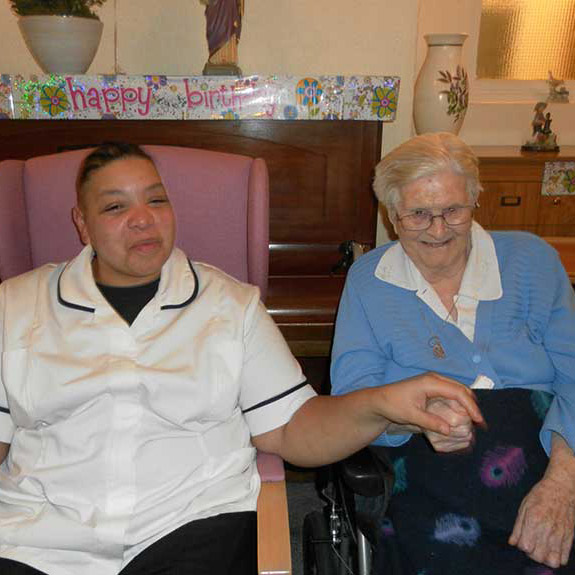
Saint John of God Week serves to celebrate our founder and lets us focus on how the values, Hospitality, Compassion, Justice, Respect and Trust, are present in our work today. Staff teams provided us with many great stories and photographs from within our services throughout the country to evidence how we live our values every day.
Lingfield Point welcomes charity's national HQ

SJOG has taken an office at Yarn at Lingfield Point, Darlington, where 26 of our staff will be based.
Lingfield Point was chosen because it offers a modern office space for the team here who support our services and the 570 staff we have nationwide. The flexibility offers the opportunity to grow as the charity continues to expand its work. The quality and location are fantastic and were all factors in deciding to base our head office here. The open plan layout means all departments can sit together, have conversations and swap ideas more readily.
The team at Lingfield Point could not have been more helpful in getting the offices ready for us to move in to and we look forward to this being a great home.
Eddie Humphries, Estate Manager at Lingfield Point, said, “We love to welcome new people to Lingfield Point but it’s clear from the start that SJOG will be very special. The work it does is fantastic and the charity is growing and thriving due to the tremendous need for its services. We will be proud to support SJOG in any way we can.”
*Lingfield Point is a 90 acre business park in the heart of Darlington, home to large companies as well as smaller businesses and start-ups with more than 3,000 workers based there.
SJOG continues to grow

SJOG’s work to reach more people who are victims of modern day slavery and trafficking continues to develop with the opening of a 5-bedded safe-house in Hounslow. This service will offer accommodation and therapeutic support to help the recovery of people, predominantly women, who are suffering from mental health issues and/or PTSD (post-traumatic stress disorder) as a result of homelessness, modern day slavery or trafficking.
New Grants and Trusts Fundraiser for SJOG
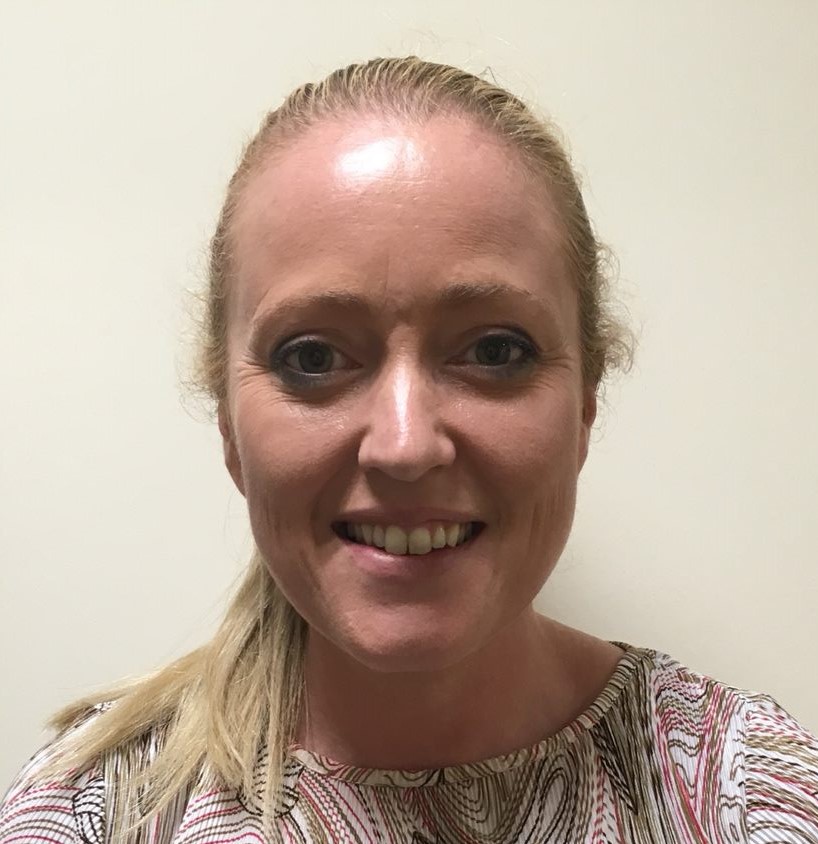
Emma Frew has over 20 years of experience at a senior level in the charitable sector working with community projects and social enterprises. Her MBA research undertaken in 2006 focussed on ‘The charitable sector in times of austerity’ and her subsequent work on developing robust services led her to be accepted as a Clore Social Leadership Fellow for the North of England in 2016.
Emma is joining SJOG to further our mission of providing the very best quality opportunities to the people we support. She will do this by working with the various teams across the organisation to provide support in accessing funding to provide services, equipment and new opportunities.
Easter Coffee Morning in West Yorkshire

“We are all so busy but this coffee morning held in our supported living offices in Bradford reminded me that it’s good to take time out and have some fun.” Michella Sunderland, Service Manager – Bradford Supported Living Services which supports people to live as independently as possible.
“I had fun and loads of chocolate cake, which was nice. You have to have a bit of fun!” Alex
“I enjoyed it and I played bingo.” Brendon
“It was good to get all the houses together.” Louise
Judging of the Easter Cake Competition rounded the morning off. It was difficult decision but the one made at Oakleigh with Alex and Brendon, got the winning vote by SJOG’s chief executive, Paul Bott.
SJOG - meeting more people in need

SJOG has been working tirelessly with other organisations to tackle the obnoxious crime that is modern-day slavery and trafficking. The charity’s efforts to broaden SJOG’s mission and reach the many more in need, are translated by the opening of another safe house in Middlesbrough in the North East of England, which can accommodate ten people. This complements the work of Olallo Services in London.
Olallo Services joined the UK National Referral Mechanism (a process which now is implemented by the 47 countries that signed the European Convention on Anti-Trafficking, which enables individuals after being rescued, to have a place to safely recover) in December 2015 by being one of the twelve sub-contractors of the Salvation Army. Since then, we have supported more than 120 individuals and have been very successful, in part due to the fact that we can connect with the Order’s services worldwide.
New Service for SJOG

New Service for SJOG
At the beginning of April we began a new partnership with the Salesian Sisters in Oxford and are delighted to welcome our new colleages as we support them in the management of the service at Elmthorpe Convent, which is home for the Community of the Salesian Sisters. Holistic care and support is to be provided to a number of sisters living in the convent who have varying levels of needs and support requirements.
The staff team of 15 members, including manager, team leaders, carers, housekeeper and cooks, will join the SJOG family, working together, upholding the values of the Salesian Sisters alongside those of SJOG. We warmly welcome them and look forward to working together, sharing expertise and knowledge, to provide a dedicated and bespoke service to the Salesian Sisters.
The Catholic Times features SJOG’s Olallo House
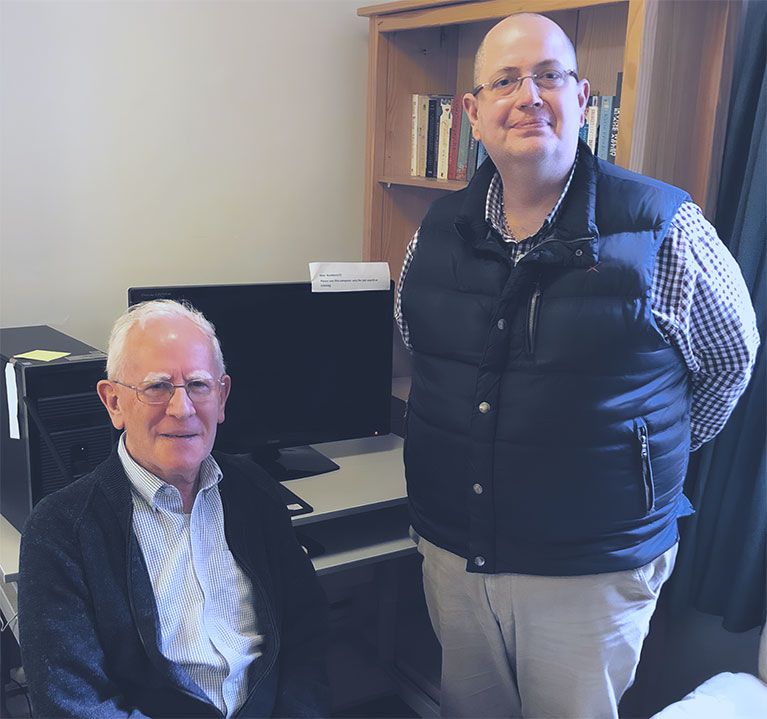
‘The safe house of hospitality where no one is turned away’, written by Bernadette Kehoe appeared in the weekend's edition (29 March) of The Catholic Times.
New Role at SJOG - Director of Opportunities

Jamie Mackrill has joined SJOG Hospitaller Services from Vista where he was Director of New Opportunities and most notably lead the development of the £2.4millon 'Work.Live.Leicestershire' programme funding by the National Lottery Community Fund and European Social Fund.
Jamie has a background in design and innovation with a particular focus in healthcare and has worked at Imperial College London and the Royal College of Art. Jamie will concentrate on service design and innovation at SJOG.
Jamie said, “There is great opportunity to be creative in how to do things going forward and I’m looking forward to working with our staff and the people who use our services to deliver innovative services that remain honest to the values and purpose of the charity."
SJOG is seeking new trustees

This is an exciting time for SJOG as it undergoes a period of transformation. With a new chief executive and leadership team, the charity is now ready to shape its future and develop new ways of delivering its purpose. Two new trustees are sought to strengthen the board, and to support and stretch the delivery of services and challenge the strategic development of the organisation. In particular, we are looking for individuals with experience in senior strategic leadership, with strong business/commercial acumen and/or expertise in quality and safeguarding within health and social care. For further information and how to apply, go to: www.peridotportal.co.uk/sjog
SJOG Staff Conference
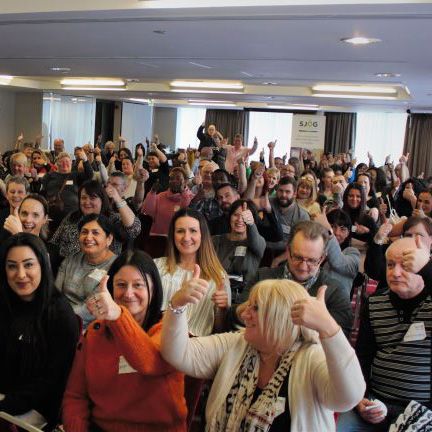
On Monday 4 February 123 of our 540 staff took part in a staff conference which brought people together from each of the services across the country and from every department that works behind the scenes in ‘support services’.
This was the first opportunity that many staff had had to meet all the members of the new Executive Management Team, which included one member, Jamie Mackrill, who is yet to commence in his post as director of opportunities. (Jamie will officially join SJOG mid-March.)
Paul Bott, Chief Executive said, “I’m glad everyone made the effort to attend as not only did it give us the opportunity to talk to each other, but most importantly to listen and learn from each other. We’re one organisation and the opportunity to come together to share our successes and challenges is worth the time and money that it takes to bring everyone together.”
Throughout the day there were a number of workshops staff could choose from which included, Enabling Voices, Employee Wellbeing, Self-Compassion, Developing Opportunities, Care Management Systems and IT.
Feedback from the day was extremely positive, and as the photo shows received an overwhelming ‘thumbs-up’.
New Chief Operating Officer at SJOG

Lisa Alcorn has joined SJOG after working at a national level as director of operations. Lisa has over 25 years’ experience of working for charities and the private sector, specialising in autism spectrum conditions, learning disabilities and mental health services. Having been successful in receiving recognition of her contribution to the sector at the BILD International Leadership Awards in 2014 for Innovative Practice, Lisa also completed her Professional Doctorate in The National Integration of a Positive Behaviour Support Practice Framework for Autism Practitioners in 2017. Since then her doctoral framework was successful in achieving the National Learning Disabilities Award for PBS in 2018.
Lisa said, “I am really excited to join the charity at this time as I can see great potential both in terms of the people we support and the people I will have the pleasure to work alongside. I am keen to introduce contemporary practices that not only positively impact on people’s lives but also assists in shaping the charity for the future”.
SJOG has a new chief finance officer
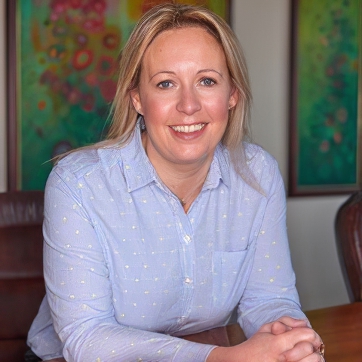
Prior to joining SJOG Leanne, was a European finance director for a global consultancy and training organisation. Leanne is a MBA qualified chartered accountant with broad financial and management experience gained through working across a wide range of sectors. Leanne has special interest and experience in change management programmes working to strengthen and futureproof organisations.
Leanne said “I’m excited to be working in such a worthwhile organisation. The services and people have met so far have been inspiring and I am looking forward to working within a talented team to ensure the charity thrives and is able to continue to provide high quality caring services to our users.”
Celebrating Three 'Good' CQC Ratings
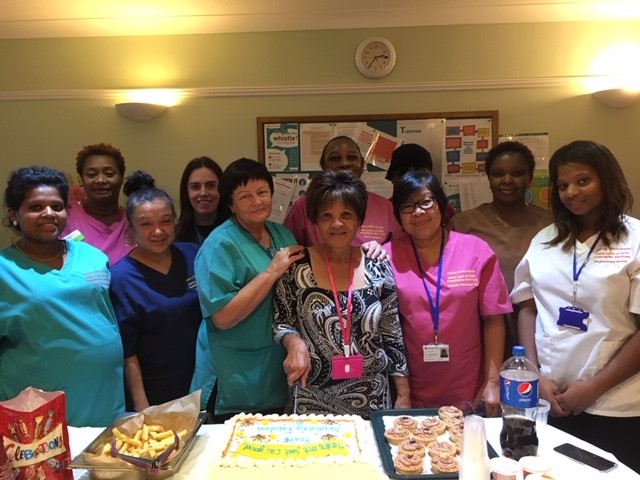
Congratulations to the three services we manage on behalf of other religious orders who achieved overall ratings of ‘good’ following recent Care Quality Commission (CQC) inspections.These are: Villa Maria in Hythe (Marist Sisters), Avila House, Worthing (Sisters of Lady of Sion) and Henry Nihill House, Edgware (The Community of Saint Mary of the Cross)
These are all part of SJOG’s religious services working in partnership with other religious orders and congregations, which was founded to respond to the issues facing many religious orders today particular in relation to the implications of care standards legislation.
This work is underpinned by our commitment to work with each individual order or congregation to maintain the charism and founding ethos of that particular religious organisation.
Photos show the celebration at Henry Nihill House.
New Chief Executive: Paul Bott

Paul Bott has joined SJOG Hospitaller Services from Vista, the award winning sight loss charity, where he has been chief executive for the past 6 years. Paul was responsible for refocussing the charity and on delivering innovative growth. Paul was shortlisted for the national Charity Times award for rising chief executives in 2016 for his work at Vista.
Paul has 24 years' experience of working for charities, and was previously operations director for the young person’s charity Catch22 and head of adult services at Scope.
Paul said “I’m excited about being part of an organisation with such a strong values base and welcome the opportunity to work with the 600 SJOG Hospitaller Services colleagues across the country to be of more benefit to the people we are here to serve. ”
Brother Donatus, Chair of Trustees said “We are at an important and exciting stage in the evolution of our mission of Hospitality, as responsibility passes increasingly to our lay Hospitallers and colleagues. I wish Paul every success in his role as chief executive officer and I know that in the best tradition of our Hospitaller family that Paul can expect and receive a warm welcome and full cooperation and support.”
October 2018
Fitting tribute to the late Peter Flower

It was with much sadness that we learned of the death of Peter Flower at the age of 90. Peter had been supported by the Hospitaller Order and Hospitaller Services since he moved into Barvin Park on 20 May 1944. After the closure of Barvin in 1994, a move to enable people to live in their own homes, Peter was supported to live in his own flat in Hatfield.
The following article that appeared in the Welwyn and Hatfield times pays great tribute to Peter:
https://www.whtimes.co.uk//news/tributes-paid-to-hatfield-s-arsenal-mad-peter-flower-1-5625442
Lindisfarne Court celebrates OUTSTANDING rating
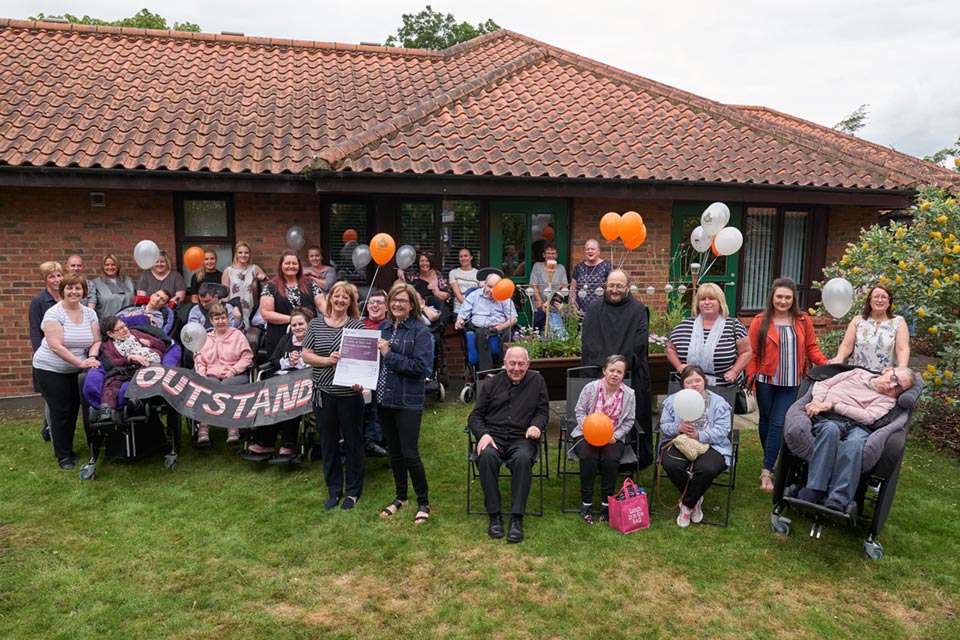
Amanda Ashdown, the service's manager, said, "We are delighted to have received this outstanding rating. We have a great staff team who work very hard to ensure the people at Lindisfarne get the best possible care and support and we are so pleased to get this recognition.
Some of the features of the inspection included how staff were exceptional in their caring approach to people and relatives, and people who inspectors spoke with told them the staff team were dedicated and wanted the best for people they were caring for.
Debbie Westhead, Deputy Chief Inspector of Adult Social Care in the North said, "This is a service that provides excellent care. My inspectors commented on how committed the home was to help preserve the privacy and dignity of people who lived in the home. Everyone we spoke with praised the passion and commitment of the registered manager. The manager and the team demonstrated strong person-centred values and were committed to providing a first class service.
A final word from Craig who lives at Lindisfarne, "I'm so very proud of the staff team and we couldn't have done it without Amanda. I know that this is an excellent service but it is wonderful to see it in writing from CQC. I am overjoyed!"
Lindisfarne Court celebrates 25 years of opening
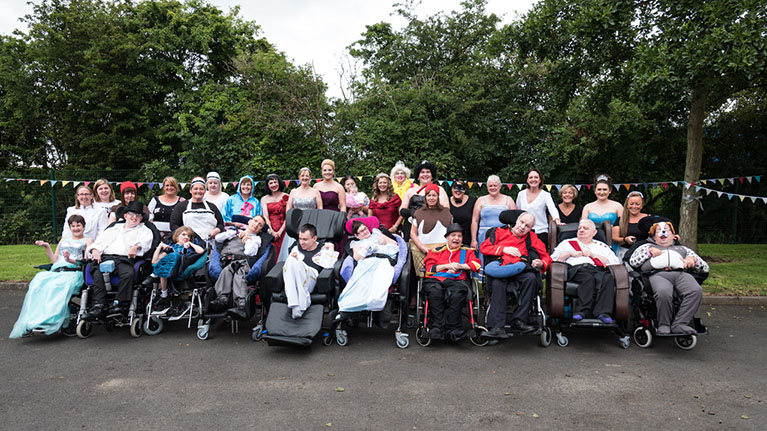
The service is home to thirteen people and is formed by three interlinking bungalows, each one decorated in a particular style to play a part in the Cinderella story. The planning of the event has taken months with all taking very active parts in making the final event something very special. Family, friends, colleagues and people from the charity’s services further afield came together on the afternoon of Friday 7 July when, after days of rain, the sun shone.
Barry said, ‘he was very proud and happy people had come to celebrate’. He also added living at Lindisfarne was ‘very good’.
The service’s first manager Lesley Robinson (left) pictured with current manager, Amanda Ashdown.
“People who live here enjoy a real home environment; they are encouraged to take a lead in the running of their home and to make choices and decisions to lead the lives they choose. We’re very proud to be celebrating 25 years and look forward to the next 25. We’ve also spent time remembering people who have been part of the service but are no longer with us – they too are a special part of its history.” Lesley Robinson, Head of Pastoral Care

